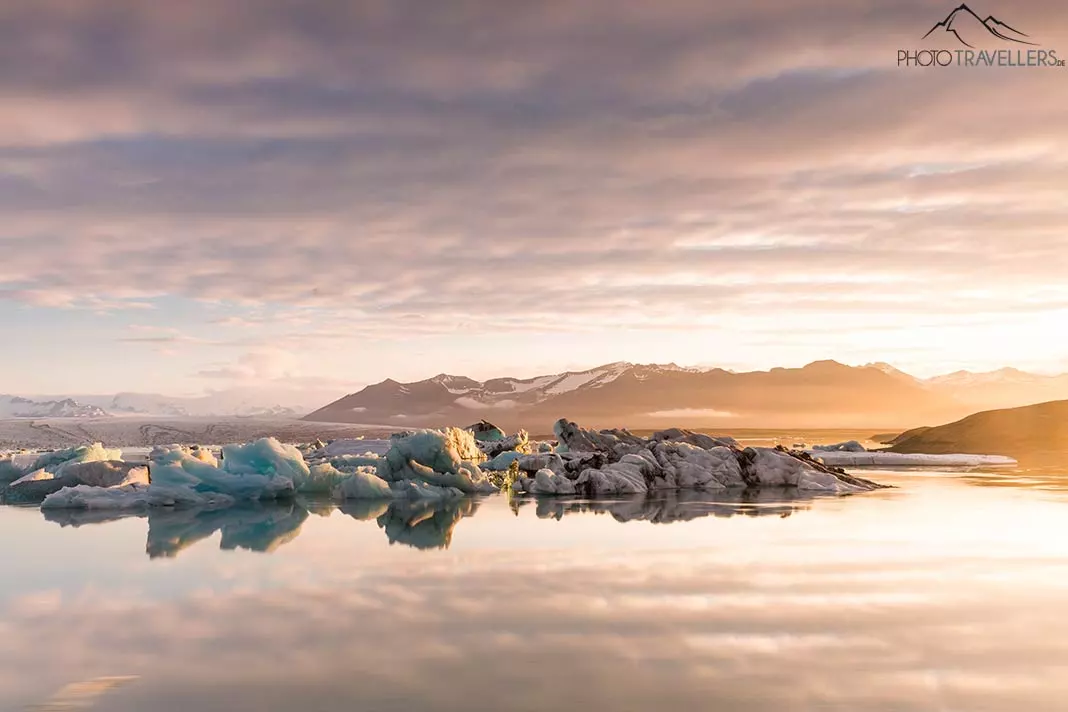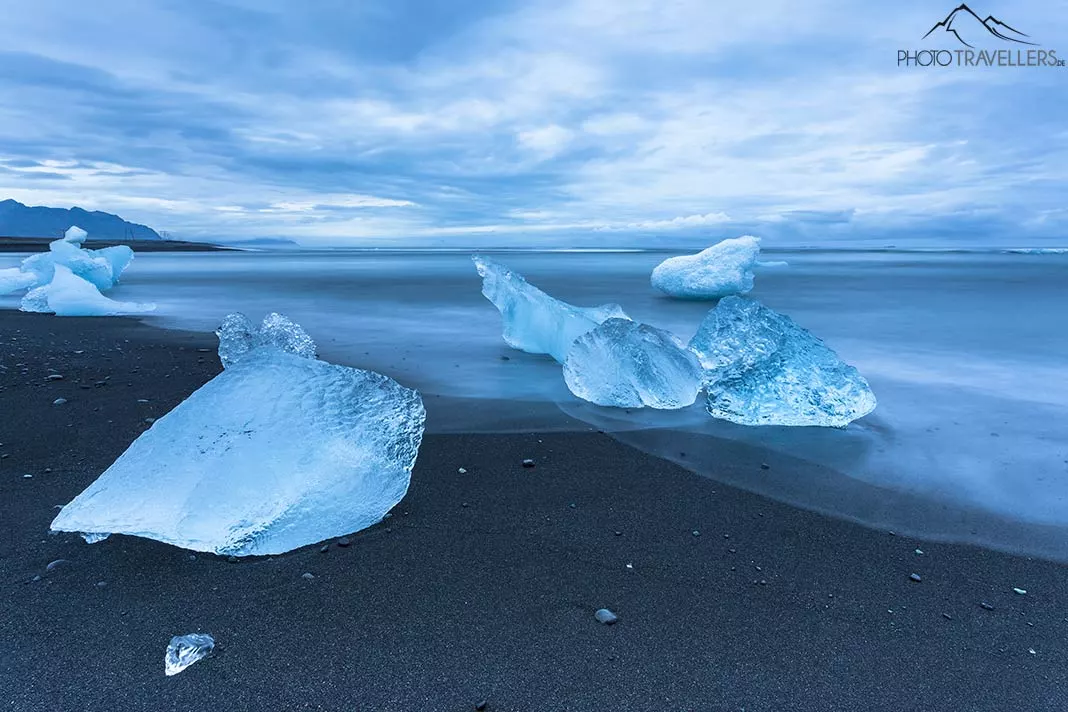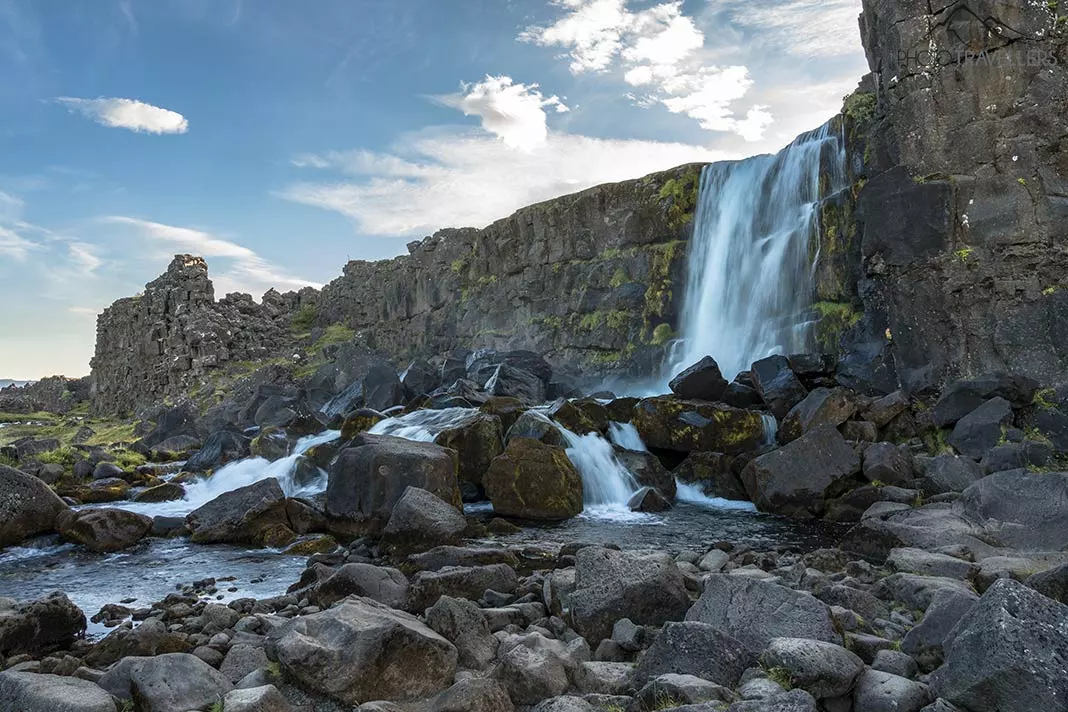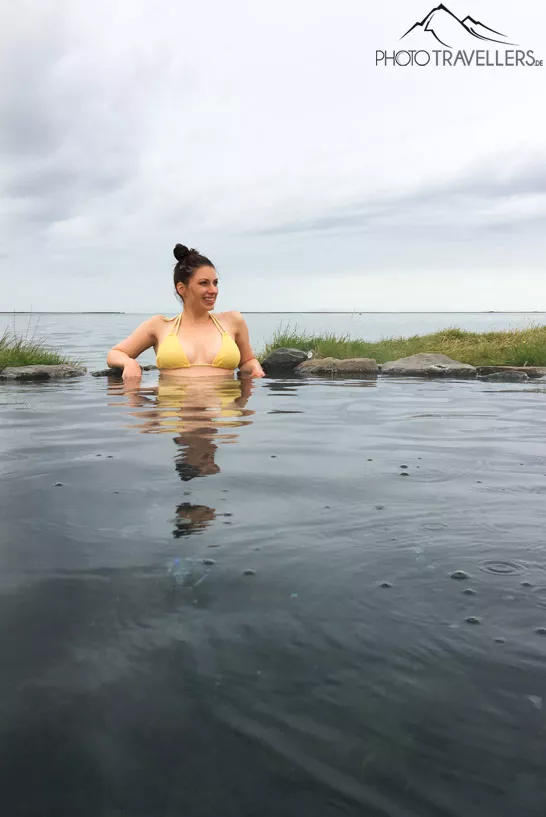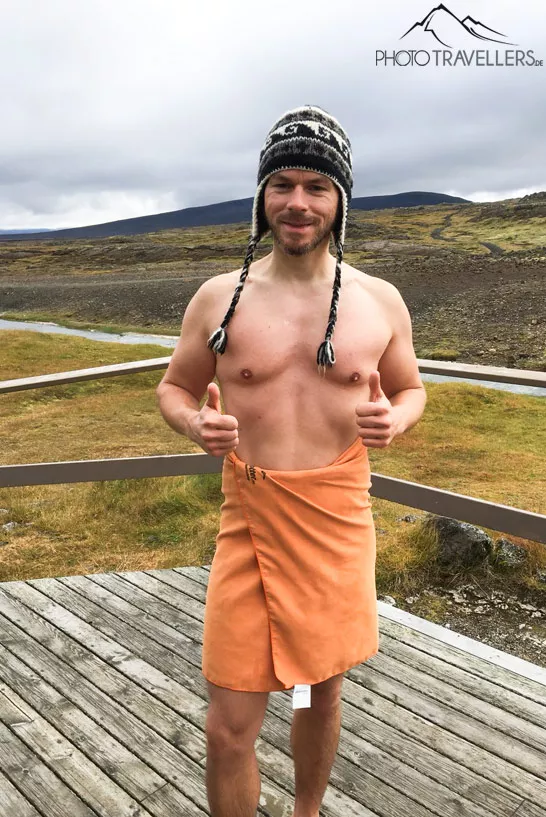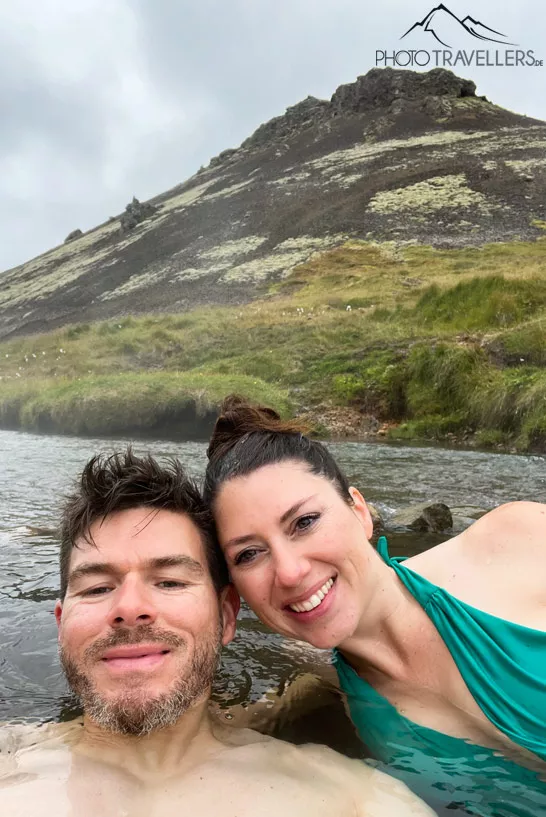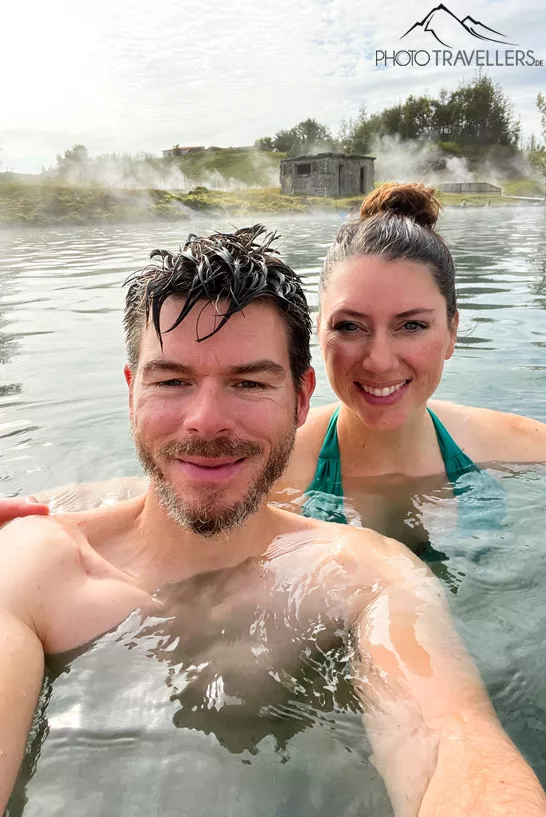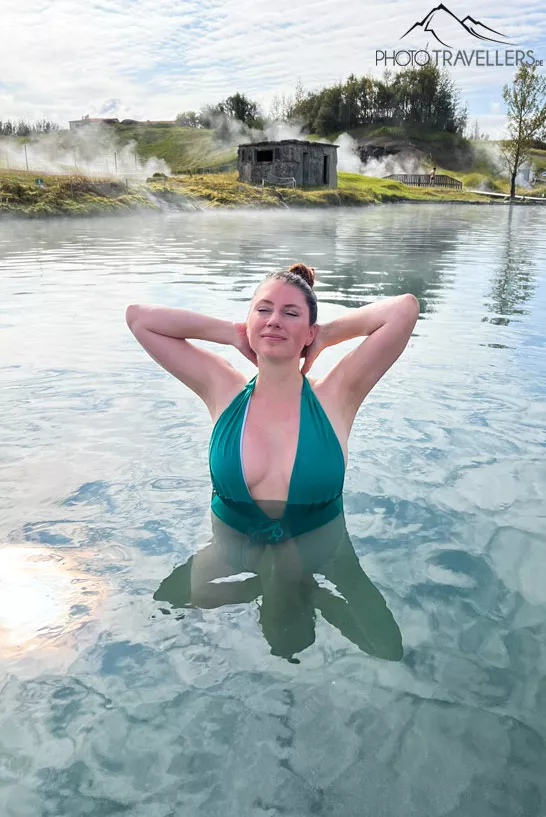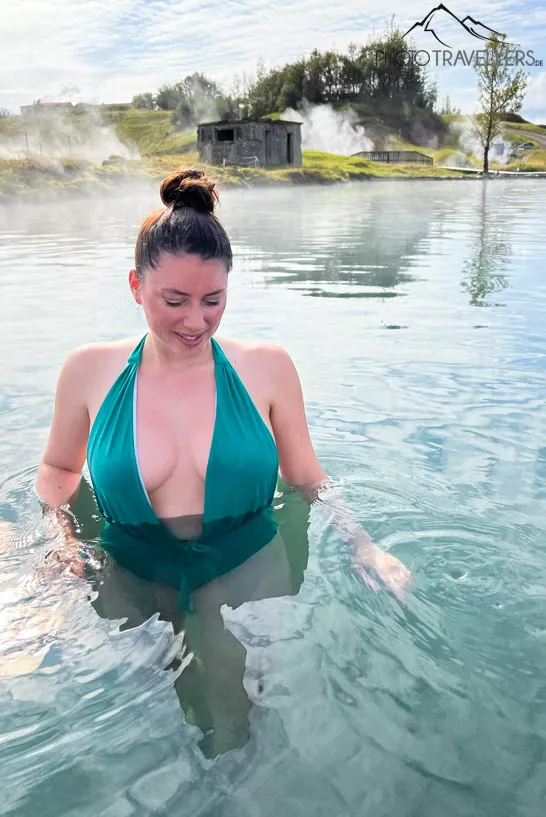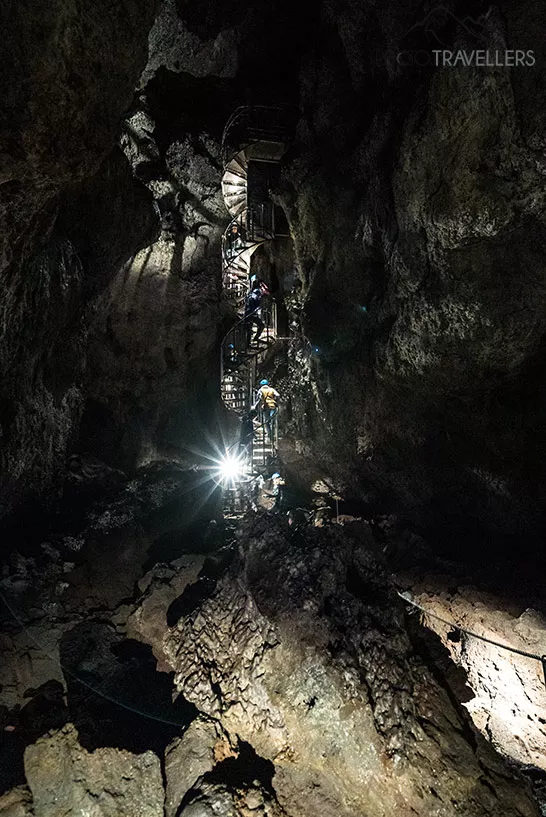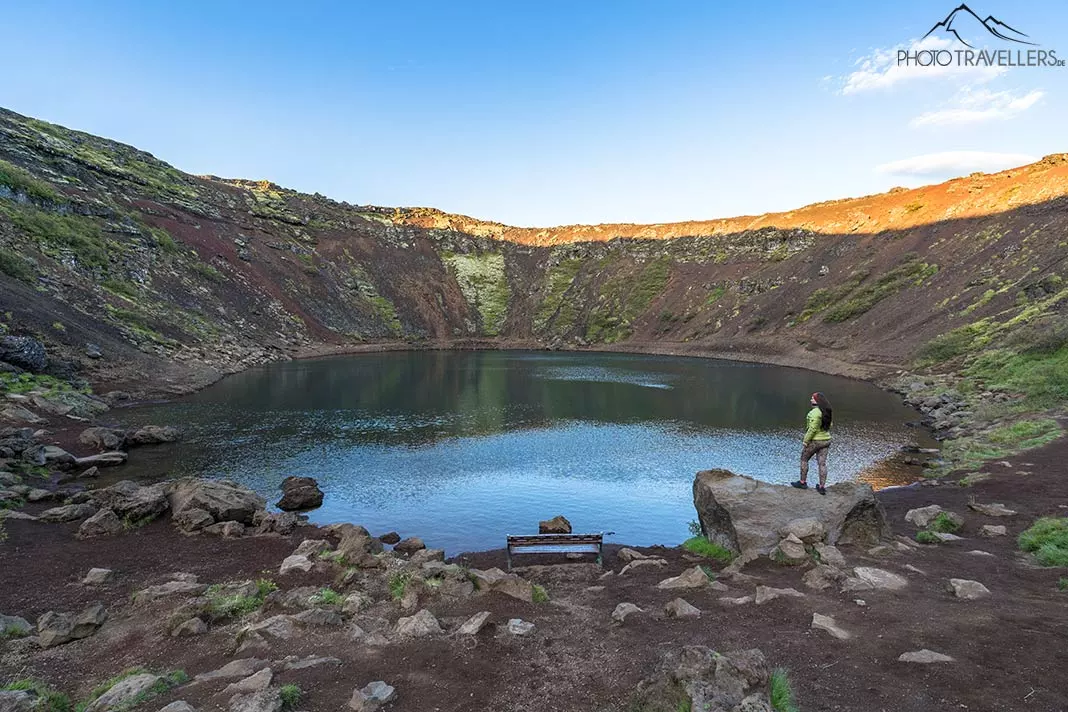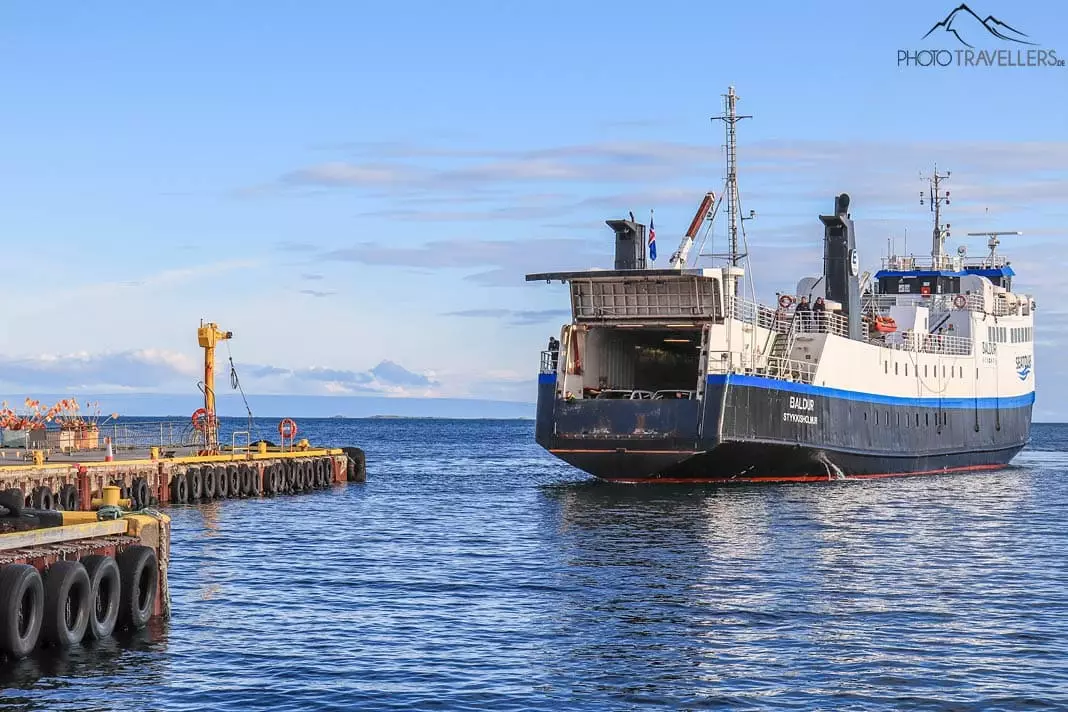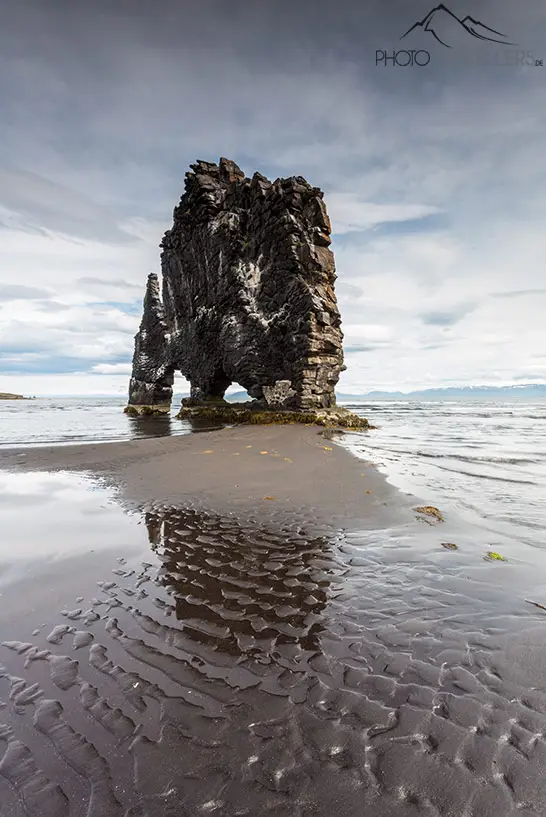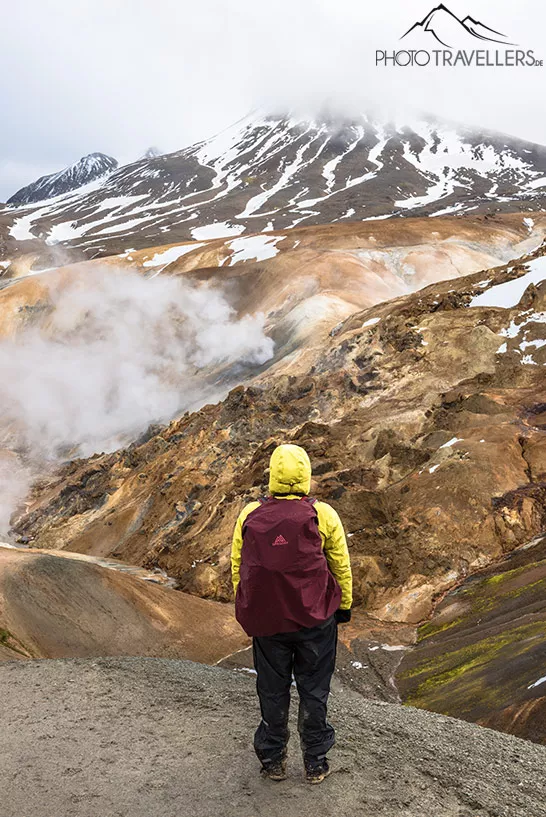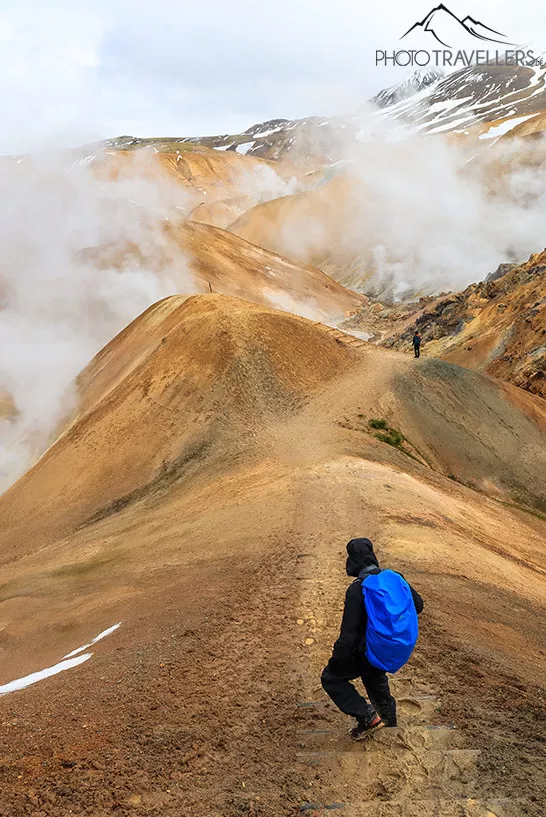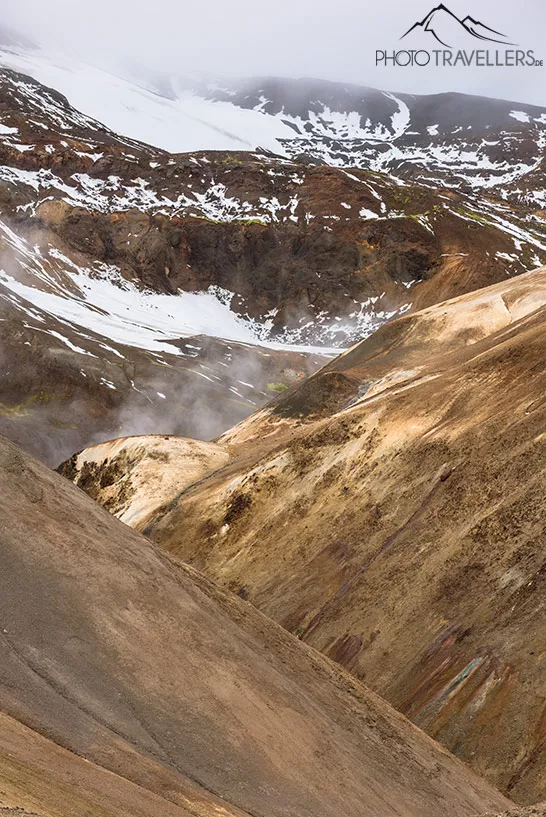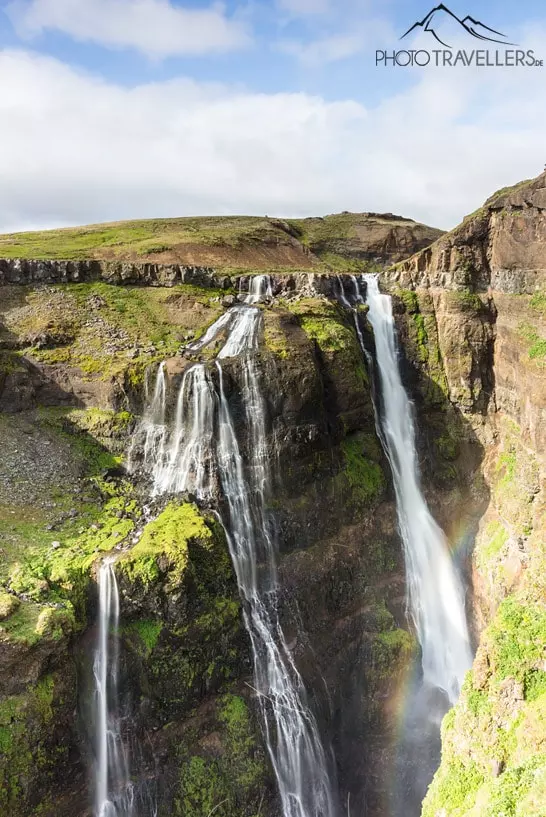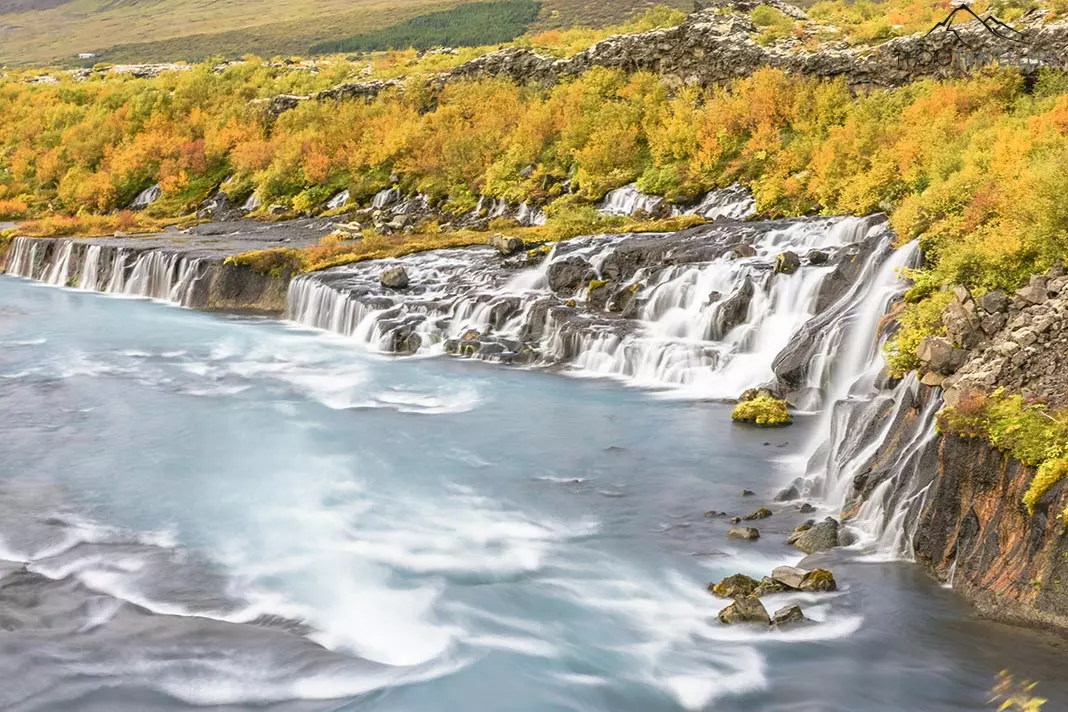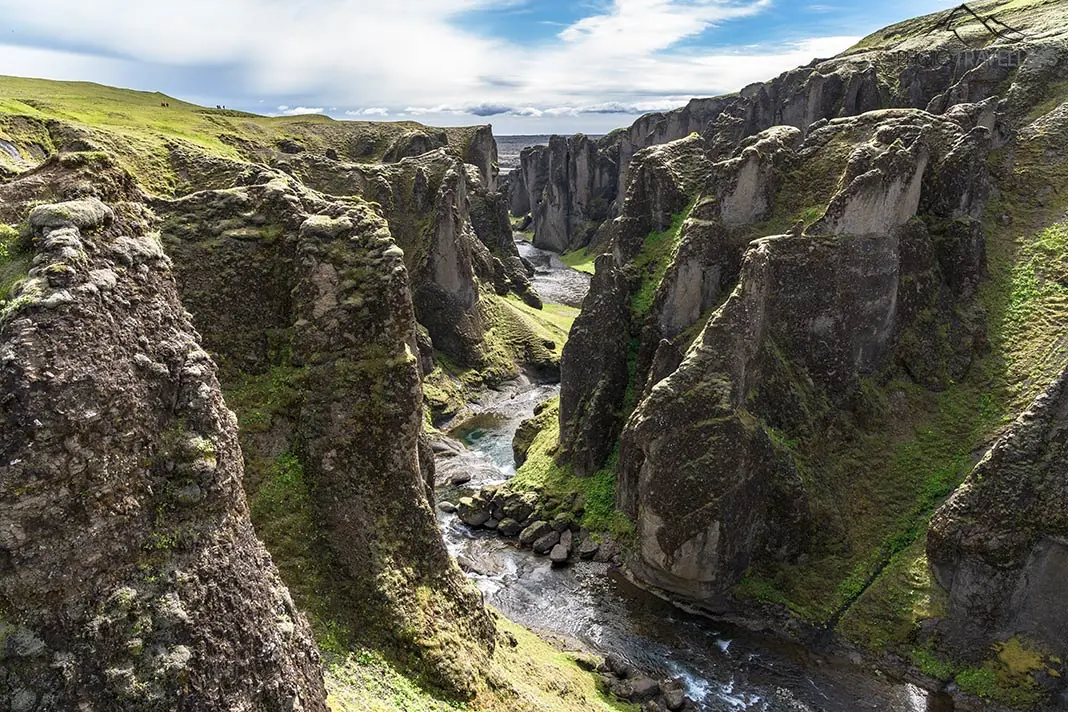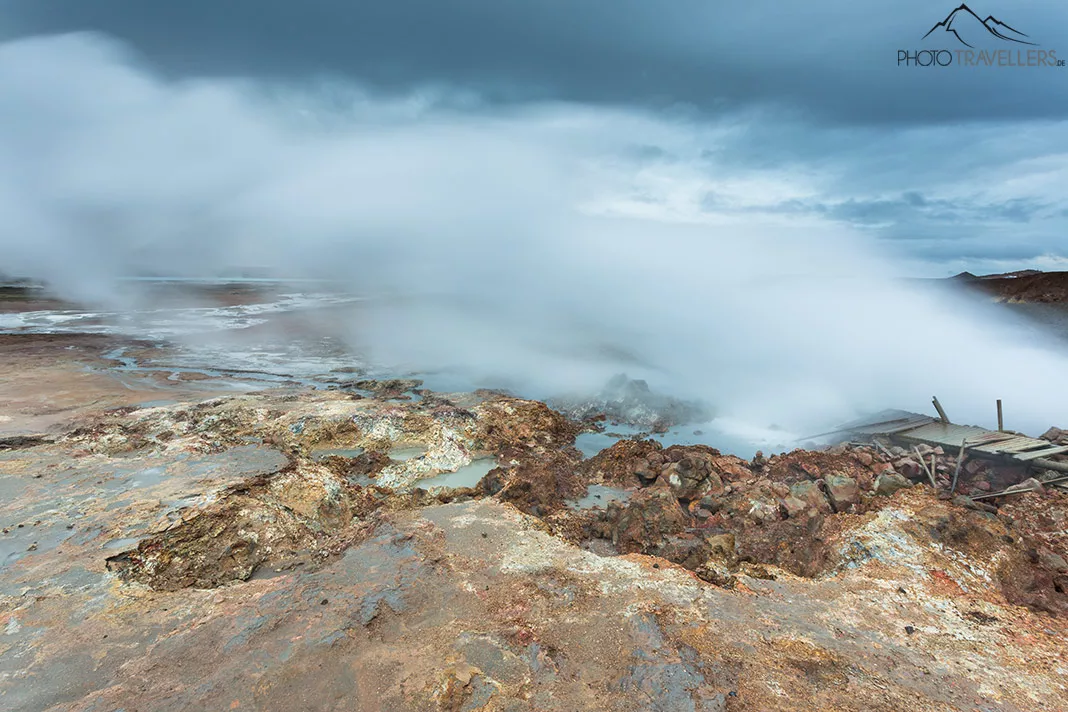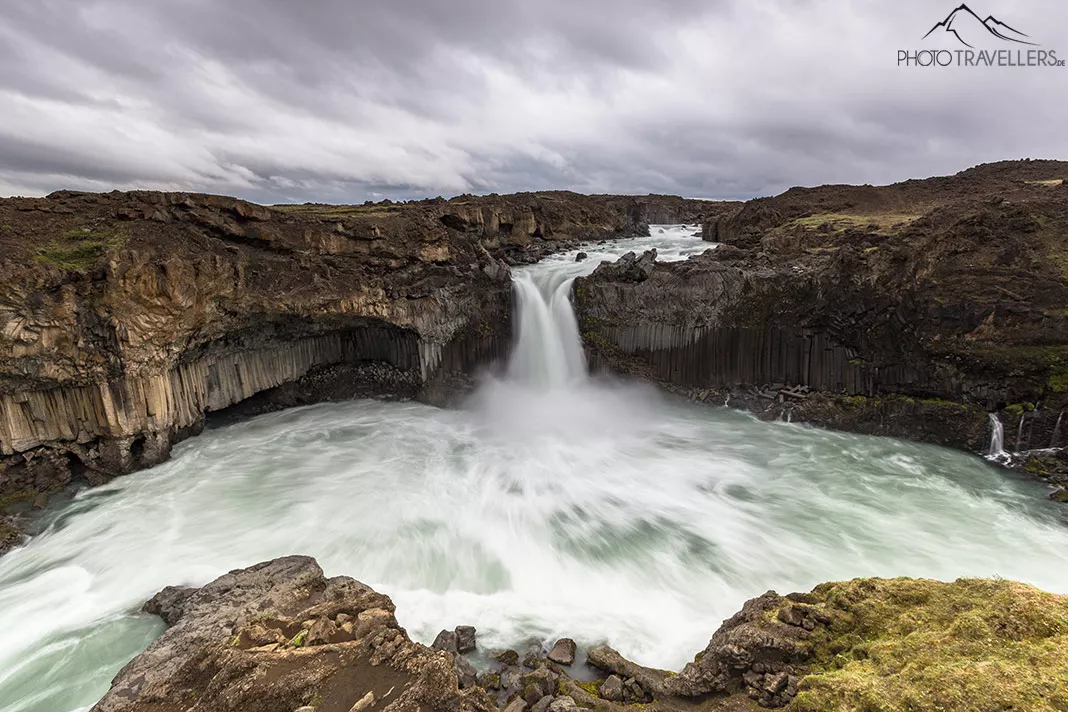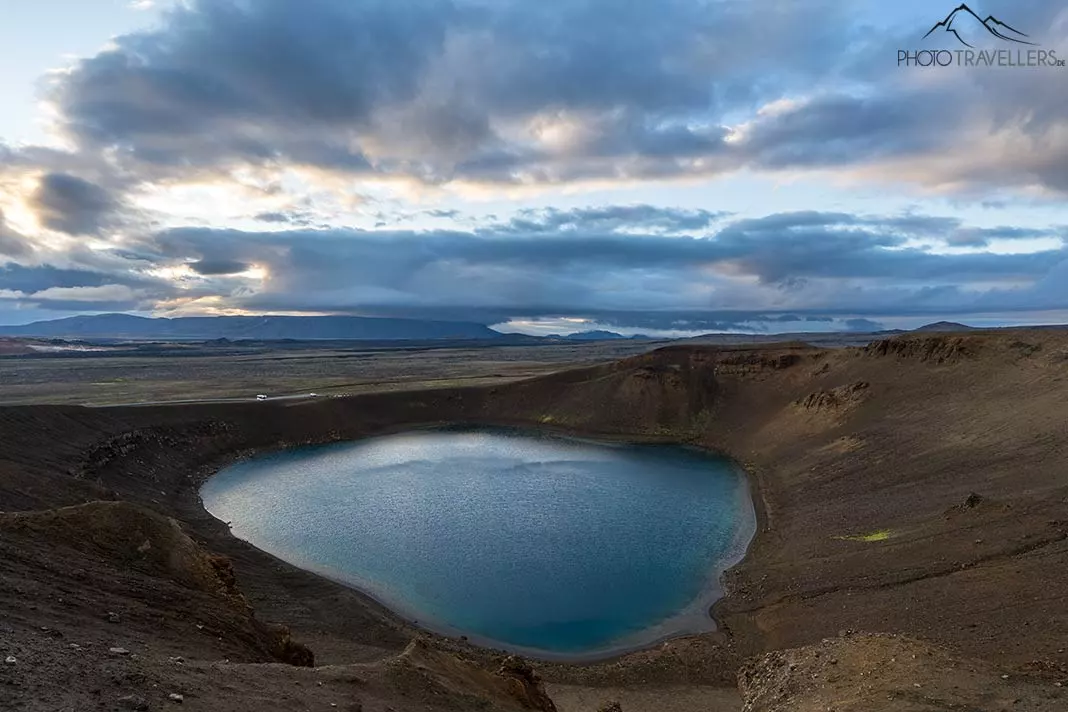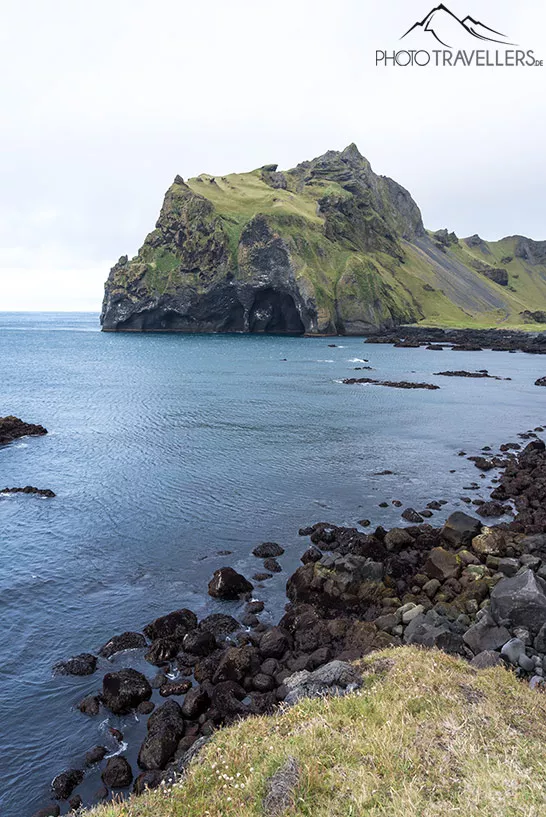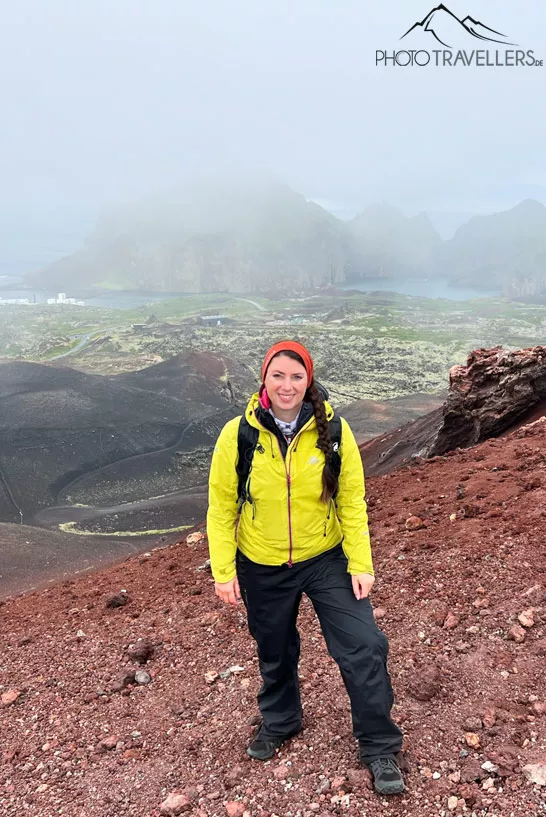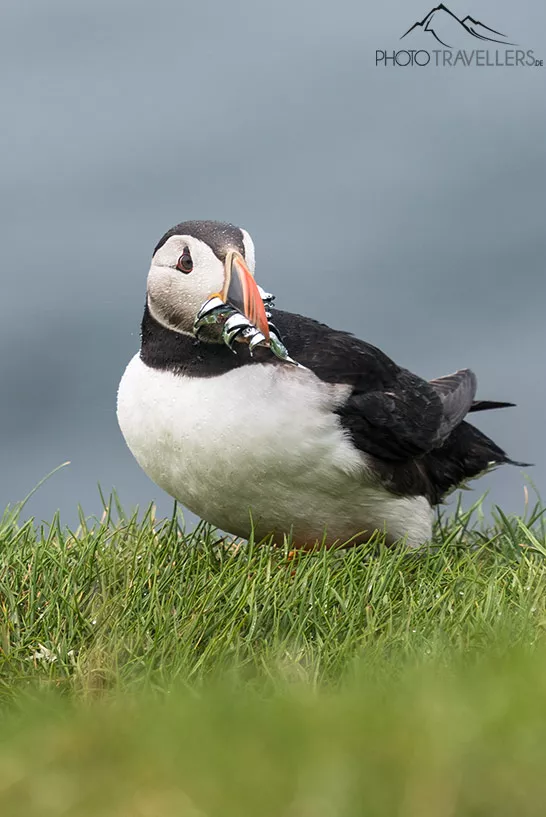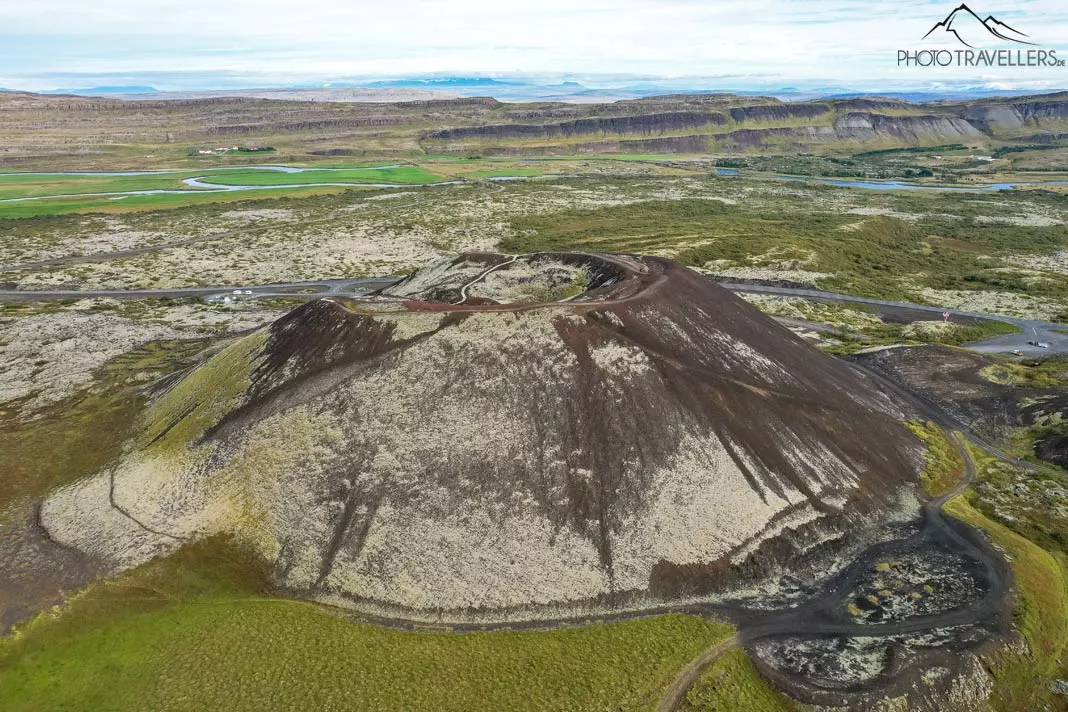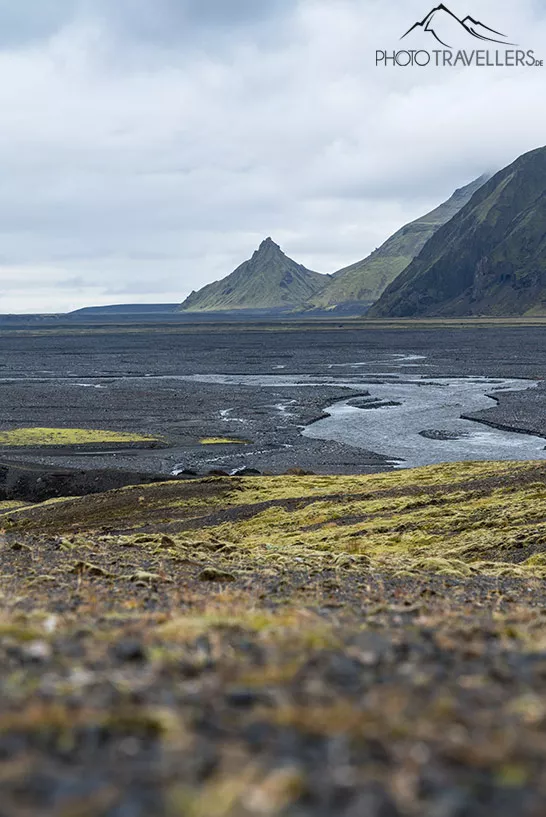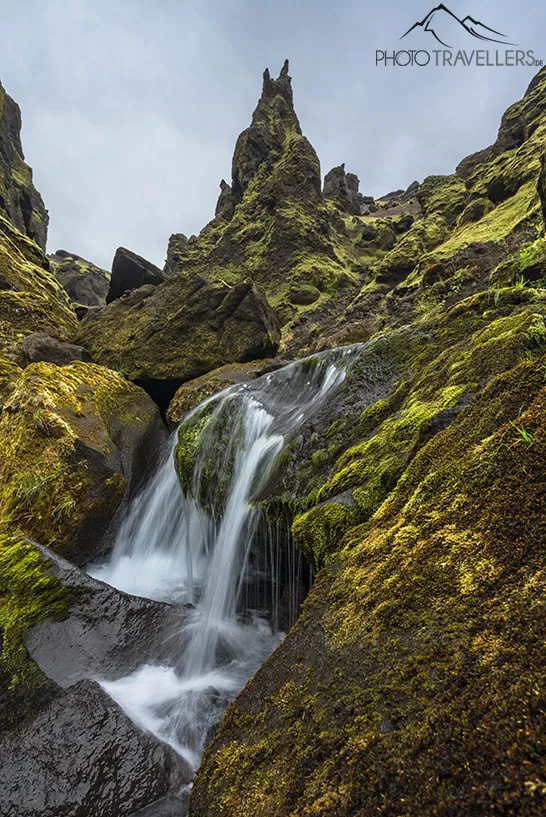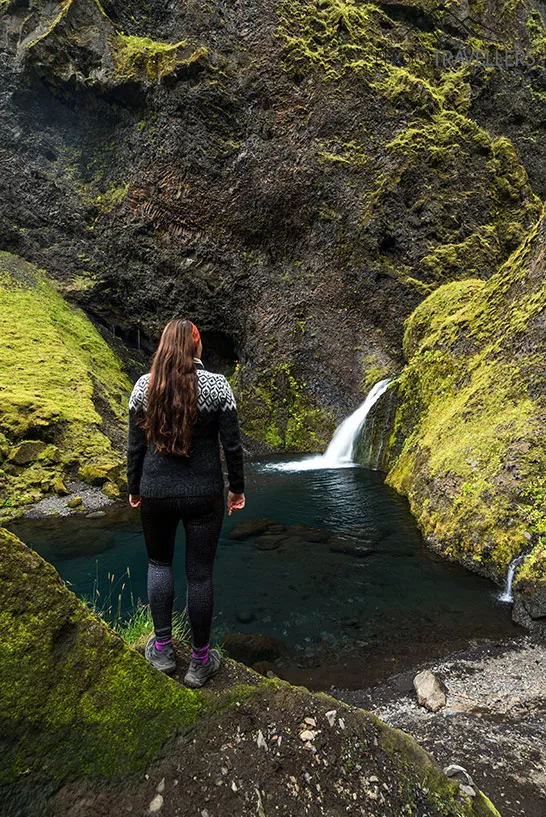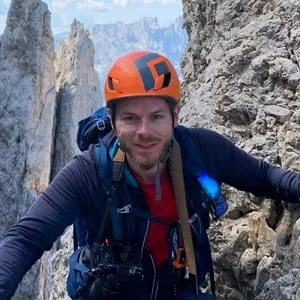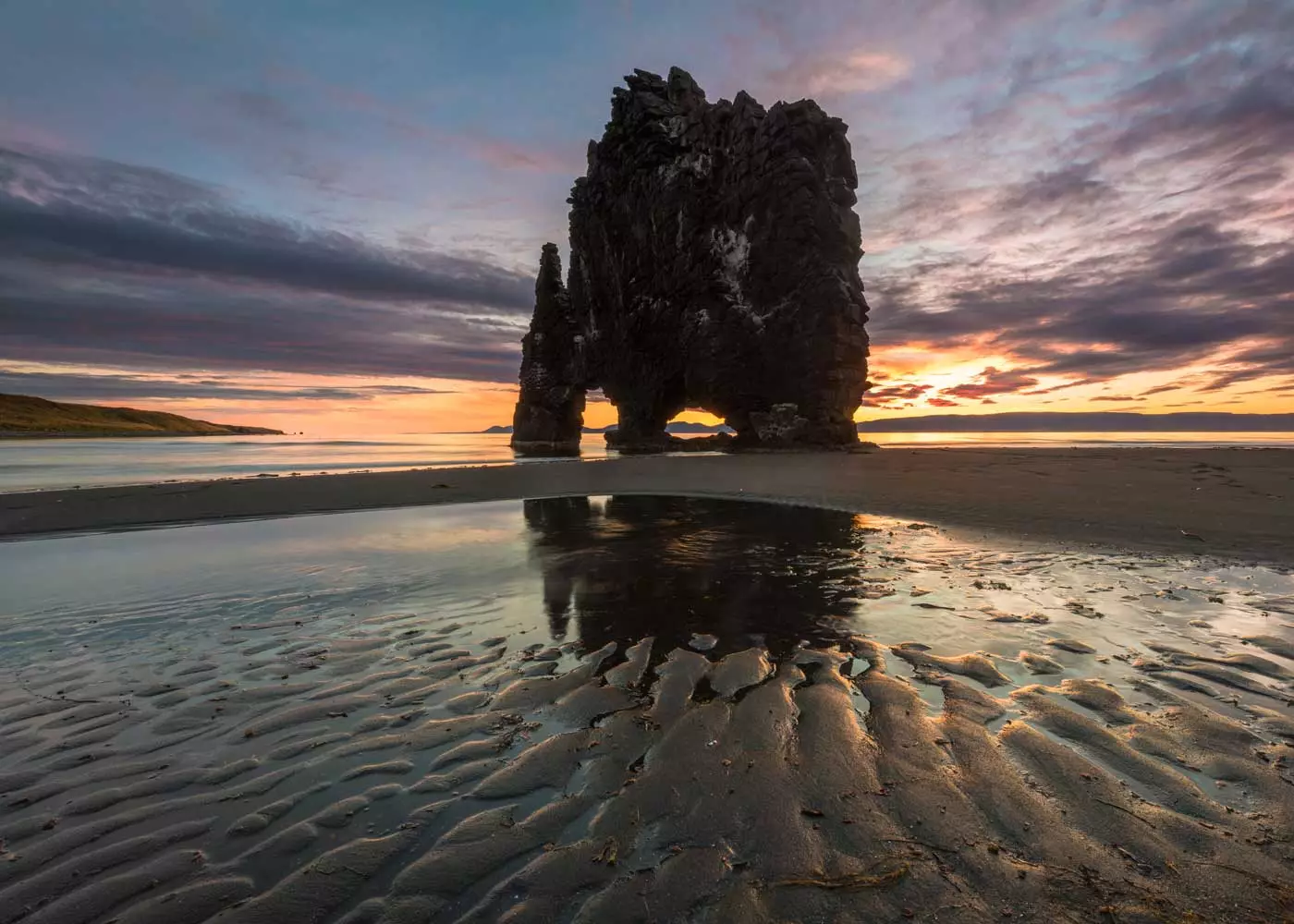
50 best things to do in Iceland for 2023
What can you see and experience in Iceland? We spent many months on the world's largest volcanic island and reveal the most beautiful sights here.
Highlights include the Landmannalaugar highland valley, Kirkjufell mountain and the Jökulsárlón glacier lagoon. You will also find many other highlights in Iceland. With a bit of luck, you might also see the Northern Lights or even a volcanic eruption.
We are now traveling with you to the most beautiful places on the island.
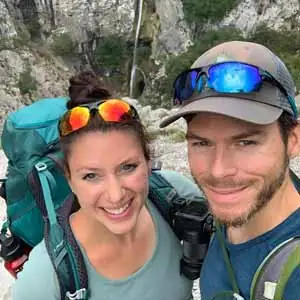
Hi! Wir sind Biggi & Flo
Wir nehmen dich als Reisejournalisten mit zu den schönsten Orten der Welt!
Werbehinweis: Alle mit einem * markierten Links sind Werbelinks.
At a glance: What to do in Iceland
Landmannalaugar: For many, the highland valley is the most beautiful place in Iceland and THE “must see”
Kirkjufell: Together with the waterfalls, the mountain is one of the most famous photo motifs in Iceland
Jökulsárlón glacier lagoon: One of the most beautiful glacier lagoons on the volcanic island
Diamond Beach: Huge ice diamonds await you on the black lava beach
Skógafoss: One of the most beautiful waterfalls on the island, great hiking opportunities
That was just a small taste of what you can see in Iceland. The largest volcanic island in the world is also one of the most beautiful places in the world. And now it’s time to dive deep into the highlights of this beautiful region. At the end of the article you will also find our interactive map with an overview of all Iceland’s sights.
1. Landmannalaugar – the most beautiful place in Iceland
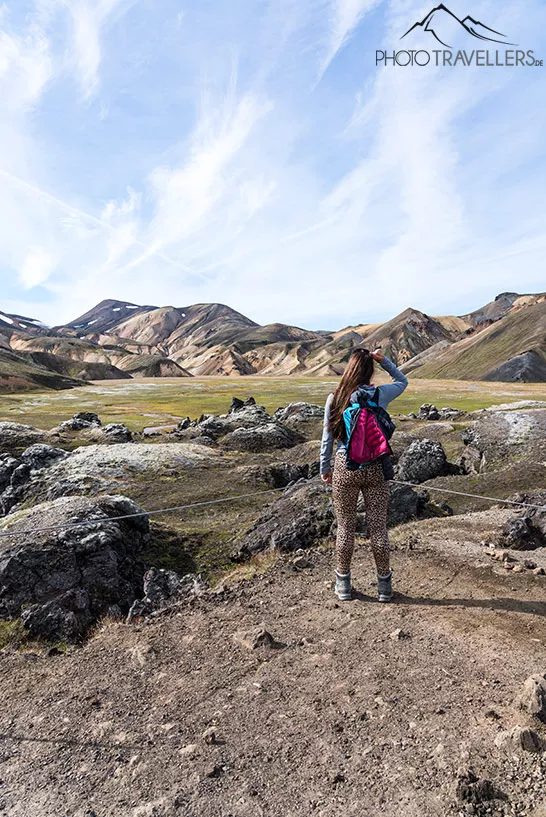 The area offers many spectacular hikes
The area offers many spectacular hikes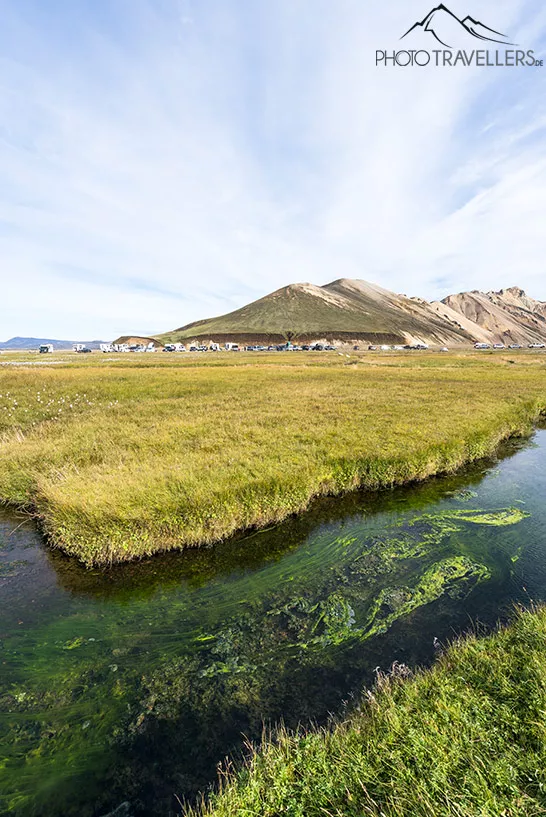 Landmannalaugar campsite is one of the most beautiful in the country
Landmannalaugar campsite is one of the most beautiful in the country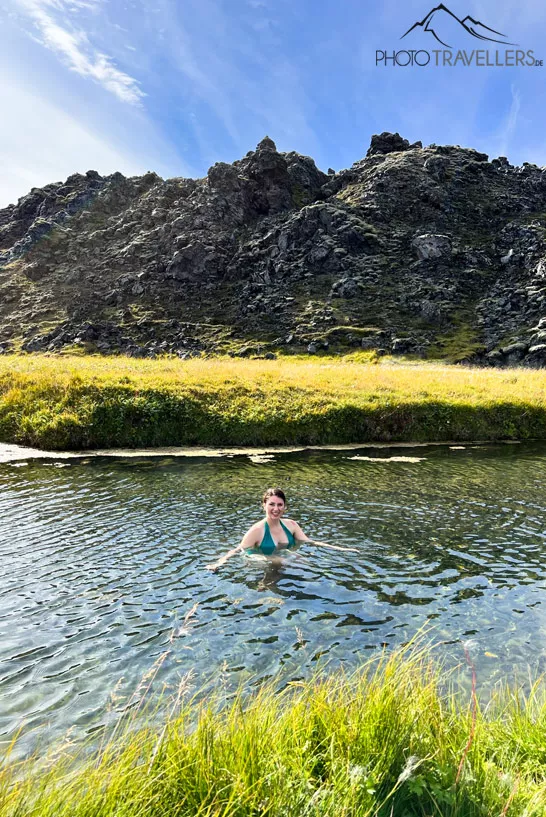 The hot natural pool is popular. There is a small platform from which you step into the water
The hot natural pool is popular. There is a small platform from which you step into the waterThe Landmannalaugar highland valley is one of the sights in Iceland that you should definitely not miss. This magical place is considered one of the most beautiful in Iceland – and one of the most beautiful photo spots in Iceland. You can expect colorful mountains and a hot spring where you can bathe (free of charge). The bathhouse with changing rooms and toilets costs a small fee. The area is also a paradise for hikers.
There is a large campsite for four-wheel drive vehicles almost directly next to the spring (you can rent a four-wheel drive camper here*).
From the parking lot, there is a popular circular hike through the area that you simply have to do. You will need two to three hours to cover the almost five-kilometer route.
Without a four-wheel drive vehicle (F-road) , the way to Landmannalaugar is blocked. In addition, you should never attempt to cross the river just before your destination in a rental vehicle! We joined a guided tour with a super jeep* (from Reykjavík) and can only recommend this day trip! In addition to Landmannalaugar, the tour also takes you to other great sights in the highlands, such as the Bláhylur crater lake.
Here you can find all information about Landmannalaugar.
2. Kirkjufell – the most famous photo spot on the island
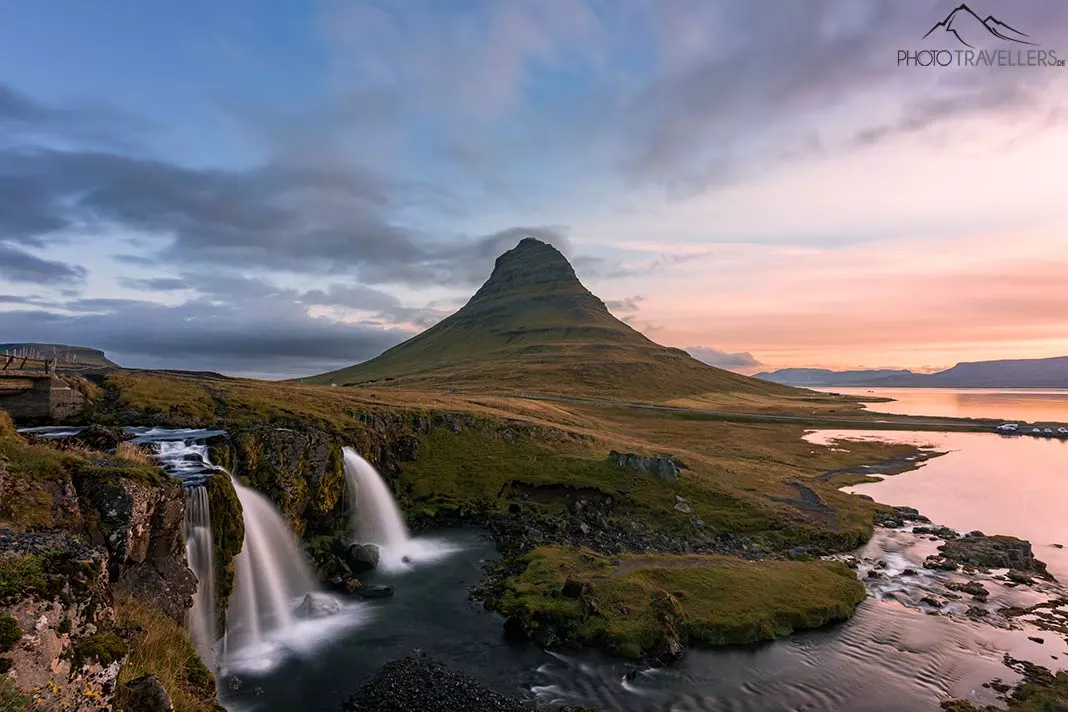 Mount Kirkjufell with the waterfall in the foreground is one of the most famous sights in Iceland
Mount Kirkjufell with the waterfall in the foreground is one of the most famous sights in Iceland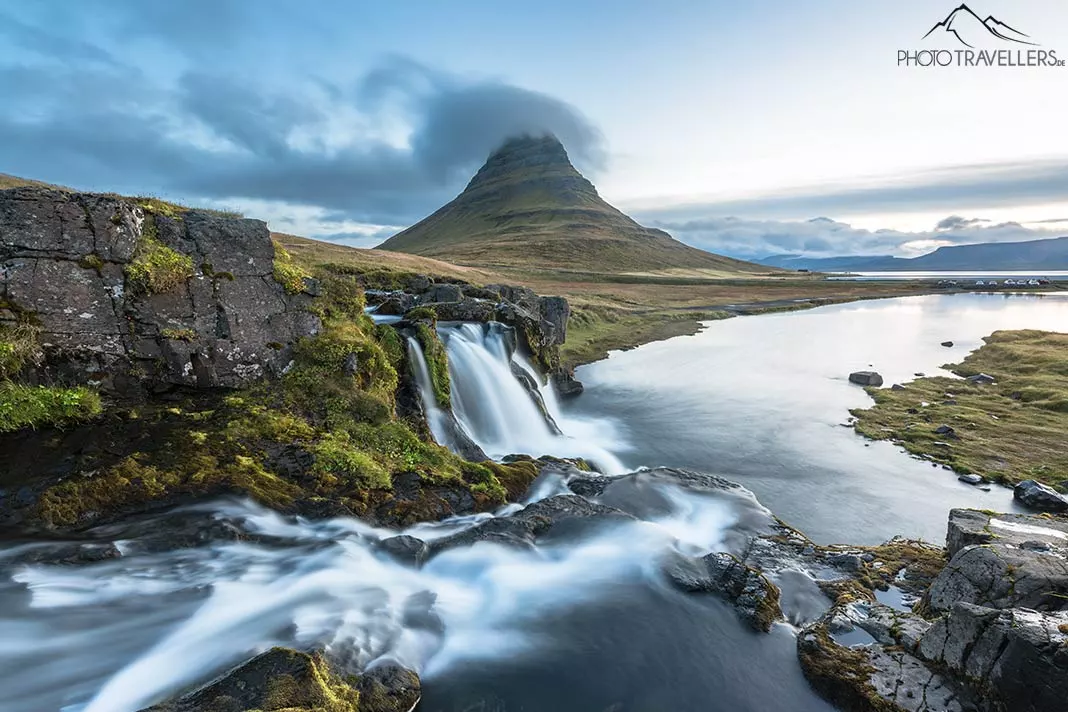 Particularly beautiful photos are taken in the morning and evening
Particularly beautiful photos are taken in the morning and eveningThe Kirkjufell mountain (Google Maps) with the Kirkjufellsfoss waterfall in the north of the Snæfellsnes peninsula is one of the most impressive sights in Iceland.
The mountain rises 463 meters into the sky and is a popular photo motif for photographers. Kirkjufell is particularly impressive in the morning or evening, when the low sun makes the sky glow in bright colors.
Every morning and evening, sometimes hundreds of photographers gather here to capture this spectacle. You should be there early to get a good spot. But with the sight of this breathtaking nature, it’s no wonder.
Kirkjufell is also a great tip for photographing the Northern Lights. The beauty of this place has turned it from an insider tip into a hotspot.
The summit of Kirkjufell can even be reached on foot (with climbing passages). However, the paths are often barely recognizable, steep, narrow and even exposed. There have already been several fatal crashes here caused by careless tourists. The mountain tour is therefore reserved for experienced mountain hikers with the right equipment.
Hotel tip: In Grundarfjörður, we recommend The Old Post Office Guesthouse* or the Hamrahlíð 9 Guesthouse*.
3. Glacier lagoon Jökulsárlón
The Jökulsárlón glacier lagoon (Google Maps) in the south of Iceland is located on the Ring Road and is one of the absolute “must-sees” on your sightseeing tour of Iceland.
Icebergs float in the glacial lake, which changes its face from day to day, indeed from hour to hour. The direct connection to the icy Atlantic Ocean means that gigantic chunks of ice are repeatedly swept into the rough sea.
In summer, we photographed here all night (it doesn’t get dark) until the morning. It was an unforgettable experience. The glacier lagoon is definitely one of the most beautiful places in Iceland.
Are you looking for the ultimate adventure? How about an ice cave tour in the Vatnajökull glacier? You can book this fantastic experience here*.
4. Diamond beach
Close to the Jökulsárlón glacier lagoon and also well worth a visit is Diamond Beach at the mouth of the glacial lake into the Atlantic. The best photos are taken here in the morning when the sun is low over the horizon.
Depending on the season, weather and tides, it can also happen that there is no ice on the beach at all – we have also experienced this. On other days you will find chunks of ice the size of trucks.
Good to know: The Jökulsárlón glacier lagoon and the beach are part of Vatnajökull National Park – drone flights are therefore prohibited here.
Hotel tip: There is some lovely accommodation nearby, such as the Ekra Glacier Lagoon* or the Skyrhúsid Guest House*.
5. Skógafoss
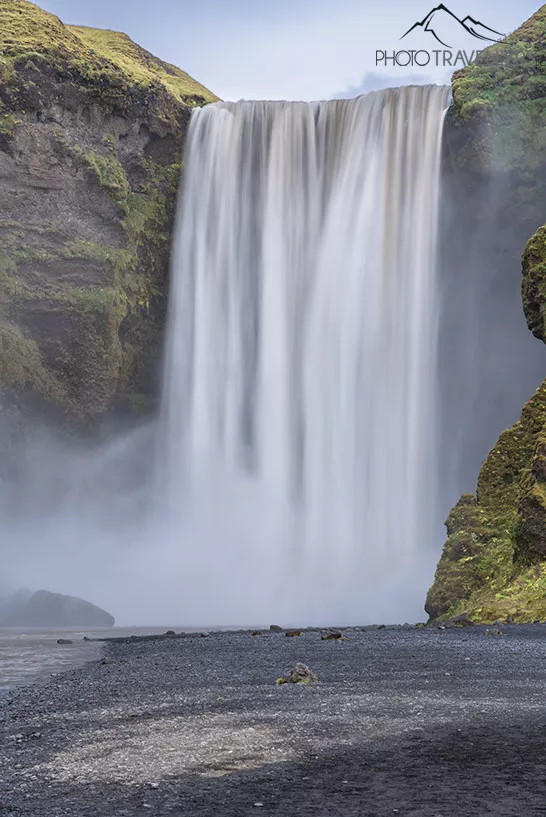 Skógafoss is one of the most famous and beautiful waterfalls in Iceland
Skógafoss is one of the most famous and beautiful waterfalls in Iceland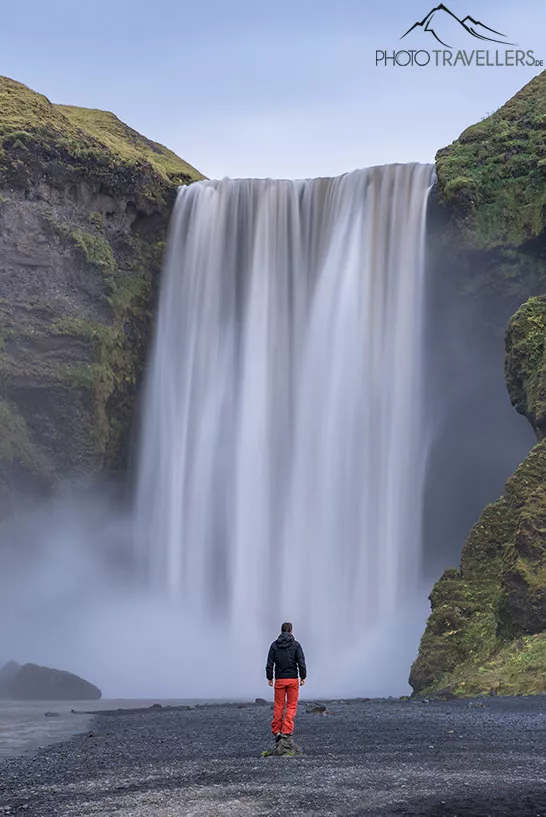 Here you can see just how huge the waterfall is
Here you can see just how huge the waterfall is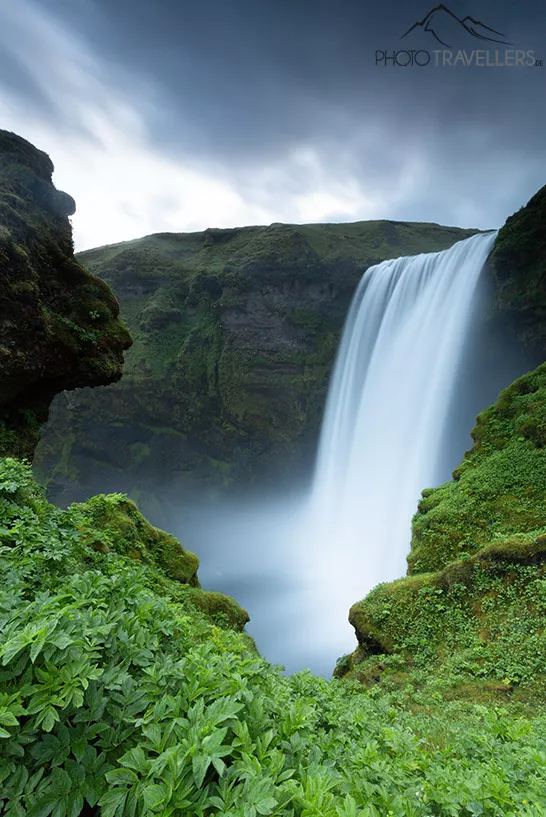 This picture of Skógafoss was taken during the midnight sun
This picture of Skógafoss was taken during the midnight sun The Skógafoss waterfall (Google Maps) plunges 60 meters into the depths and is one of the top highlights in Iceland. At the edge of the waterfall, a well-maintained hiking trail with steps leads to the edge of Skógafoss. The power of water can be felt everywhere. According to an Icelandic saga, one of the first immigrants called “Þrasi” once hid a box of gold behind the waterfall. But we didn’t find anything.
The spray lashes your face, the roar of the water deafens your ears and the earth trembles at the volume of water rushing down Skógafoss second by second.
But this place is also very special from the foot of the waterfall. But there are a lot of people here, especially during the day.
If you master the steps next to the impressive waterfall, you can look down into the depths. One of the most famous hikes in the region also starts here. If you follow the well-maintained hiking trail next to the Skógá river, you will reach beautiful waterfalls such as Fosstorfoss, Steinbogafoss and Fremri Felsfoss. After about three kilometers, the landscape changes dramatically and it becomes very barren. You should hike at least this far before turning back.
If you hike to the edge of the waterfall late in the evening or early in the morning, you have a good chance of having Skógafoss to yourself. At these inhuman times, there are usually only a few photographers at this easily accessible top attraction.
Tip: Nearby is Kvernufoss (our top attraction number 48), still an insider tip in Iceland. It is only a few minutes’ walk from the parking lot at the Skógar Museum to this impressive waterfall.
Hotel tip: The Hótel Skógafoss* and the simple Guesthouse Skógafoss* are located in the immediate vicinity of the waterfall. The nearby Umi Hotel* in the small village of Hvolsvöllur is a more dignified place.
6. Þingvellir National Park
The 237 square kilometer Þingvellir (Thingvellir) National Park is part of the famous “Golden Circle”. The Öxararfoss waterfall, which is just a few minutes away from the parking lot, is particularly worth seeing. Thanks to a ramp, even wheelchair users can marvel at this natural wonder. It goes without saying that Öxararfoss should not be missing from our list of top sights.
Another highlight are the fissures and gorges (some of which are accessible with baby carriages and wheelchairs) created by the drifting apart of the American and Eurasian tectonic plates.
Divers can go diving* in the national park between two continents, in the so-called Silvra Rift. This is a fault that is several kilometers long. The water in the fissure is so clear that you can also snorkel* in the Silvra Rift.
The national park is also home to Þingvallavatn, Iceland’s largest lake (although this is disputed).
Also worth seeing are the Þhingvellir church and the ruins of old stone houses. The Alþing, the former parliament of the Landes, met here from the 10th to the 18th century.
Hotel tip: If you want to treat yourself, book a room at the luxurious Hotel Grimsborgir – Your Golden Circle Retreat* – relaxation is guaranteed here.
| Activities in Þingvellir National Park | Price | Ticket |
|---|---|---|
| Cave excursion Gjábakkahellir | approx. 75 Euro | ➤ book here* |
| Cave tour in the Tintron Cave | approx. 95 Euro | ➤ book here* |
| Snorkeling in the Silfra Trench | approx. 150 Euro | ➤ book here* |
| Diving in the Silfra Trench | approx. 260 Euro | ➤ book here* |
7. Seljalandsfoss
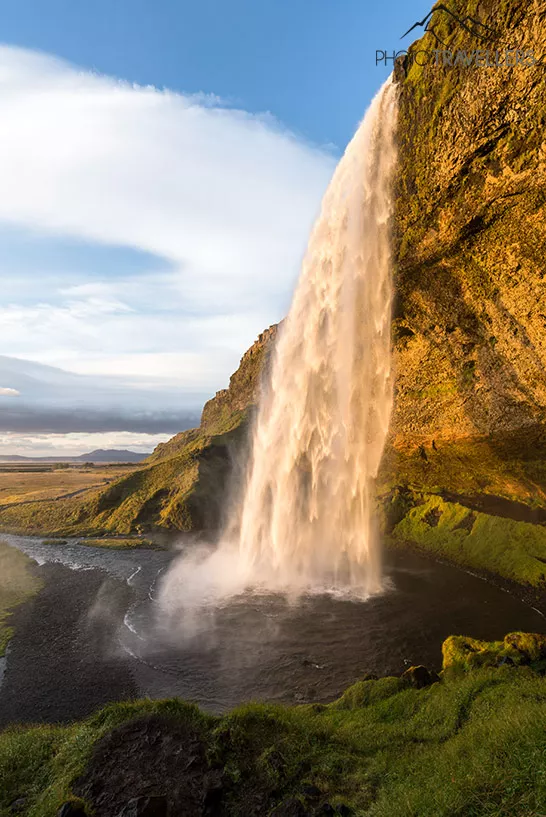 Seljalandsfoss is one of the most famous waterfalls in Iceland
Seljalandsfoss is one of the most famous waterfalls in Iceland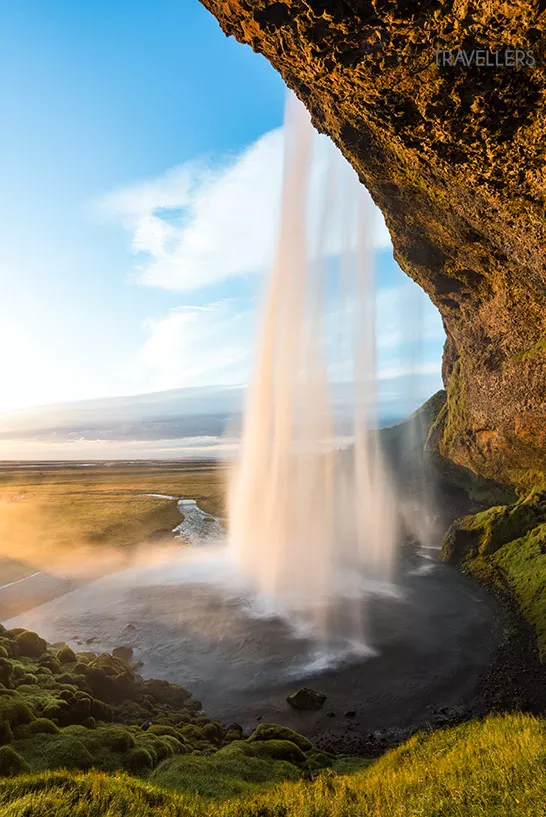 The absolute highlight is that you can walk behind the waterfall
The absolute highlight is that you can walk behind the waterfall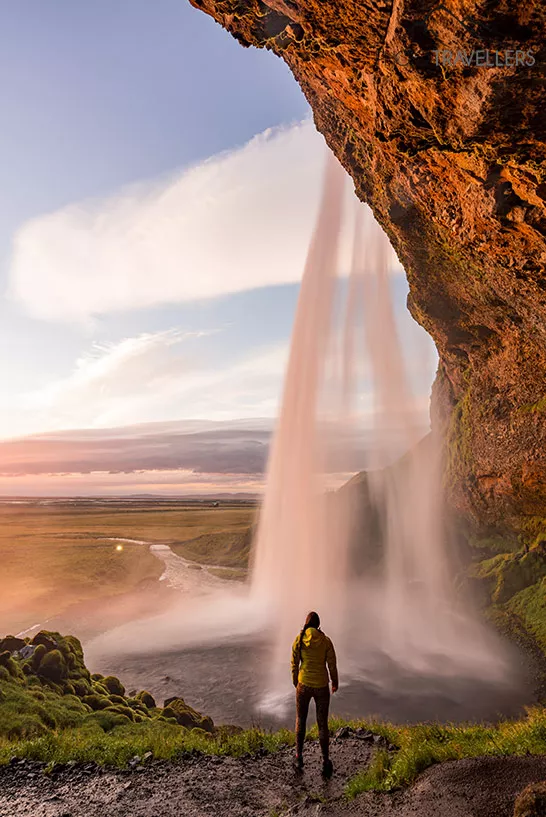 The waterfall is of course one of the top Instagram spots in Iceland
The waterfall is of course one of the top Instagram spots in IcelandAnyone traveling in Iceland must make a detour to the 60-metre-high Seljalandsfoss (Google Maps) in the south of Iceland. The waterfall is one of the most beautiful on the island and is an absolute “Iceland Must See”.
The highlight is the short hiking trail that leads behind the waterfall. You’ve never seen anything like it – not even in Iceland. Rain gear is a must if you don’t want to get soaking wet in the spray of the waterfall.
Tip: Be sure to visit the nearby Gljúfrabúi (our top attraction number 44). You can reach the hidden waterfall by following the hiking trail at Seljalandsfoss. Gljúfrabúi lies behind a narrow crevice, through which you can get dry-footed with a little skill.
Hotel tip: Are you looking for a funky accommodation nearby? Then take a look at the luxury lodges Seljalandsfoss Horizons* and, slightly cheaper, the bungalows at Brú Guesthouse*.
8. Reykjavík – Iceland’s capital
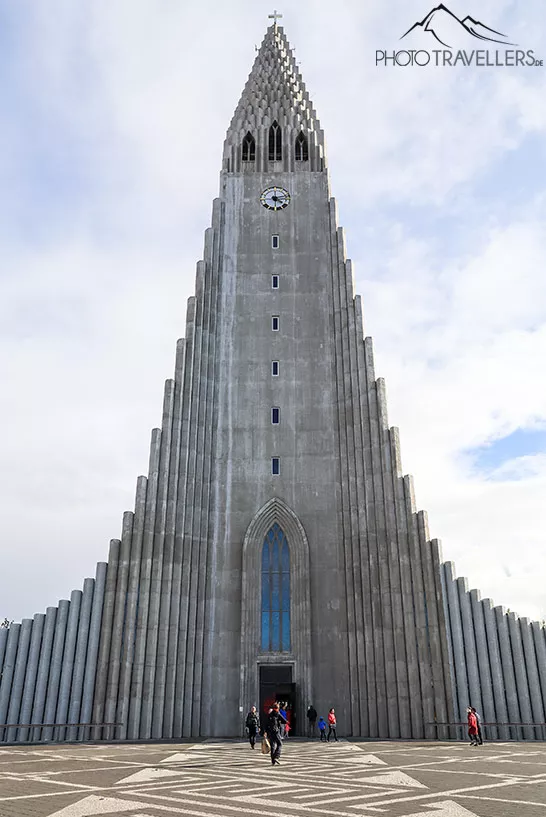 Hallgrímskirkja church is one of the city’s landmarks
Hallgrímskirkja church is one of the city’s landmarks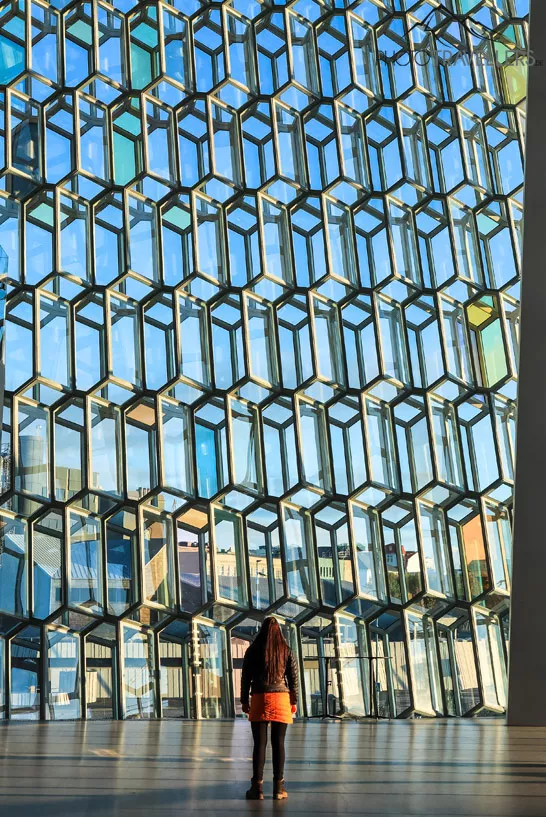 The modern Harpa concert hall is also one of the top attractions in Reykjavík
The modern Harpa concert hall is also one of the top attractions in Reykjavík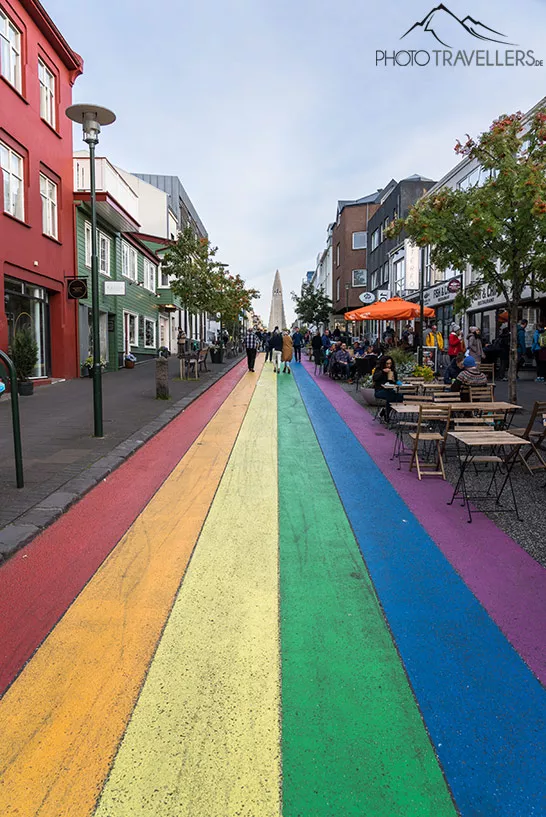 Rainbow Street is one of the more recent sights in the Icelandic “metropolis”
Rainbow Street is one of the more recent sights in the Icelandic “metropolis”Iceland’s capital Reykjavík has some great sights to offer. You should plan half a day to explore the city.
Worth seeing are the Hallgrímskirkja church, the main shopping street Laugavegur, the Harpa concert hall, Rainbow Street and the famous Sun Voyager sculpture. It’s just fun to stroll through Reykjavik with its small stores and cute cafés. Don’t miss out on this beautiful place.
Be sure to visit the Icelandic Punk Museum, which is housed in a former public toilet. And if you stroll through the city: the hot dog stands at Bæjarins Beztu Pylsur are legendary. Bill Clinton has even dined here. By the way, you can see graffiti everywhere in the city, if that interests you.
Just outside is the Perlan Museum (buy ticket*). The Perlan is a highlight for families with children. At Perlan(Wonders of Iceland), you can walk through a real ice tunnel before learning about the wonders of the country. From the roof of the former hot water tank (in Reykjavík even the streets are heated in winter) you have a great view of the capital. Perlan also has the Northern Lights Planetarium Show, which is well worth seeing – also a tip for rainy days (buy ticket*).
Here you will find an overview of all the sights in Reykjavík.
Hotel tip: Good & affordable accommodation in Reykjavík at Hótel Múli*. A nice mid-range hotel is the Room With a View Hotel*. If you want more comfort, stay at the Alda Hotel Reykjavík* or the Sand Hotel by Keahotels*.
| Reykjavík: starting point for many activities in Iceland | Price | Ticket |
|---|---|---|
| Blue Lagoon incl. Transfer | approx. 125 Euro | ➤ book here* |
| Whale watching excursion | approx. 85 Euro | ➤ book here* |
| Diving trip to the Silfra Trench | approx. 250 Euro | ➤ book here* |
| Helicopter sightseeing flight | approx. 250 Euro | ➤ book here* |
| Tandem paragliding flight over Reykjavík | approx. 250 Euro | ➤ book here* |
| Northern Lights tour with the Superjeep (approx. September to April) | approx. 160 Euro | ➤ book here* |
9. Blue Lagoon
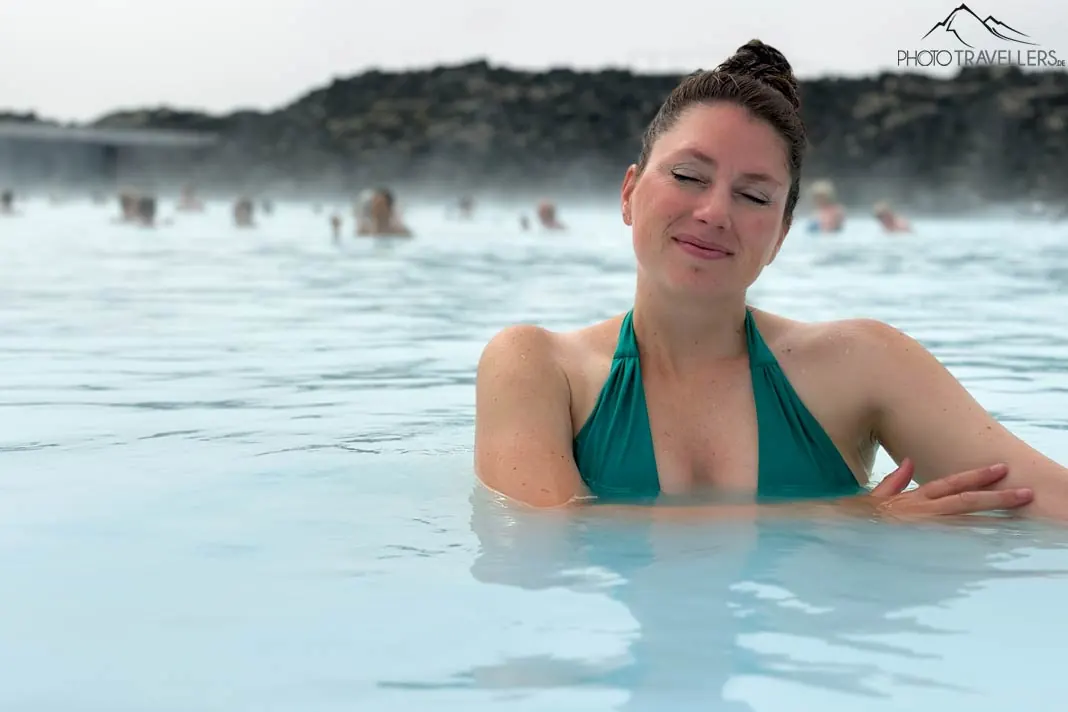
The Blue Lagoon is one of the most famous tourist attractions in Iceland. There is hardly a visitor who does not plan a day in the Blue Lagoon.
Bláa Lónið, as the Icelanders call it, is a huge outdoor thermal pool near Reykjavík. The Blue Lagoon is known for its blue-colored water (due to diatoms) and the rugged lava rocks.
A visit to the lagoon, which is open all year round, is definitely a highlight of any trip to Iceland. However, admission is very expensive: the cheapest ticket without extras starts at the equivalent of around 60 euros per person (as of October 2022). With access to the Retreat Spa (five hours incl. Retreat Lagoon and Blue Lagoon), you can expect to pay at least 420 euros. For special luxury packages, you’ll have to fork out more than 1,000 euros per person.
Of course, you can also spend the night at the Blue Lagoon. If money is no object, book into The Retreat at Blue Lagoon Iceland* or the Silica Hotel at Blue Lagoon Iceland*. The nearby Northern Light Inn* is very nice, but considerably cheaper.
| Tickets & tours for the Blue Lagoon | Price | Ticket |
|---|---|---|
| Bus transfer from/to Reykjavík (without Blue Lagoon ticket) | approx. 40 Euro | ➤ book here* |
| Blue Lagoon incl. Transfer from Reykjavík | approx. 125 Euro | ➤ book here* |
| Blue Lagoon incl. Drink, towel and mud mask | approx. 95 Euro | ➤ book here* |
| Golden Circle, Kerið Crater & Blue Lagoon (from Reykjavík) | approx. 190 Euro | ➤ book here* |
| Blue Lagoon & Northern Lights Tour (from Reykjavík) | approx. 190 Euro | ➤ book here* |
Alternatives to the Blue Lagoon
If you want peace and solitude, it is better to visit one of the many natural hot pools that can be found all over the island (an unforgettable experience). A great place to swim, for example, is the Reykjadalur Hot Spring Thermal River, around 50 minutes from Reykjavík (plus a 4.5-kilometer walk each way).
A nice (and cheaper) alternative to the Blue Lagoon is the Secret Lagoon, Iceland’s oldest thermal bath (buy tickets here*). More on this under point 16.
Reykjavík is also home to the Sky Lagoon. An insider tip is the Hvammsvik Hot Spring in Hvammsvík. In the north-east of Iceland, the Mývatn Nature Baths attract thousands of visitors. In the east, the Vök Baths is a tip.
10. Gullfoss
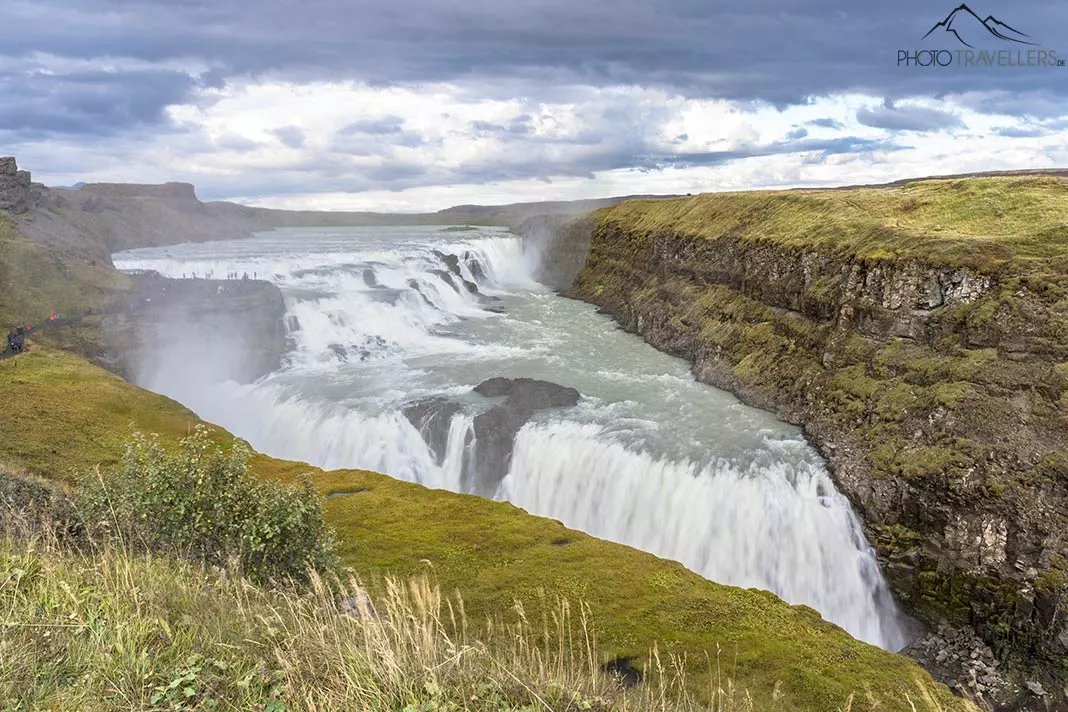
Gullfoss (Google Maps) consists of two waterfalls, 20 and eleven meters high. The water rushes into the depths with a deafening noise. Gullfoss is part of the Golden Circle and is one of the most famous sights in Iceland.
A well-maintained path leads from the parking lot directly to the waterfall. Rain gear and a rain cover for your camera belong in your rucksack.
You can book an expedition directly at Gullfoss. This involves driving up a glacier in an off-road truck that used to be a rocket launcher. You travel by snowmobile to an ice cave*.
Hotel tip: If you are looking for nice accommodation near Gullfoss, we can recommend the Hotel Gullfoss*.
11. Haukadalur hot spring area with Strokkur geyser
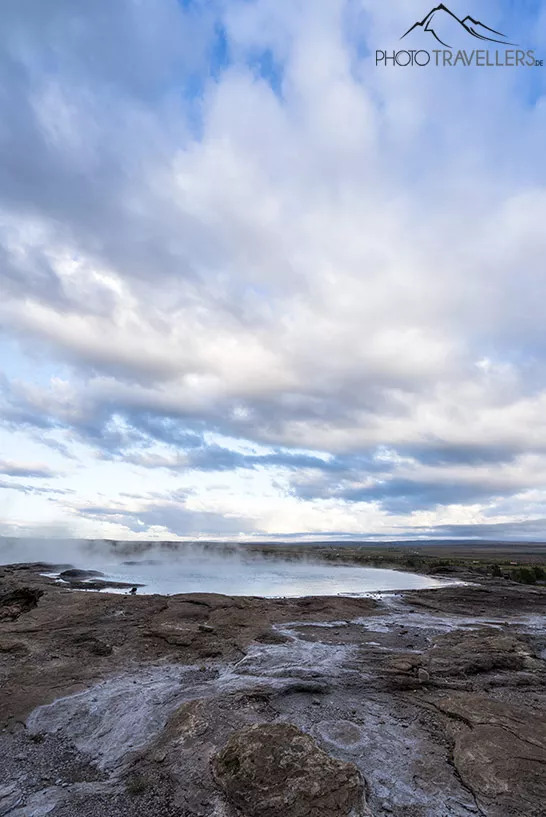 The Haukadalur hot spring area is a popular excursion destination
The Haukadalur hot spring area is a popular excursion destination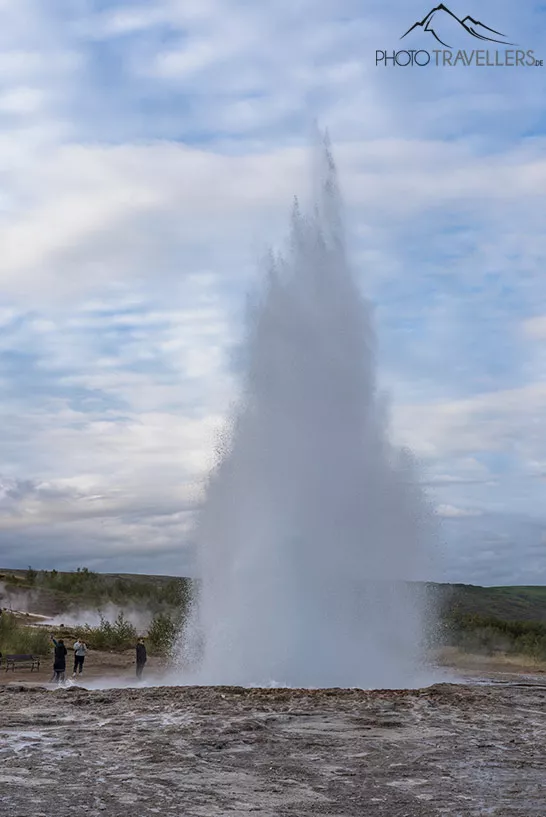 The Strokkur geyser shoots a fountain of water into the sky every few minutes
The Strokkur geyser shoots a fountain of water into the sky every few minutes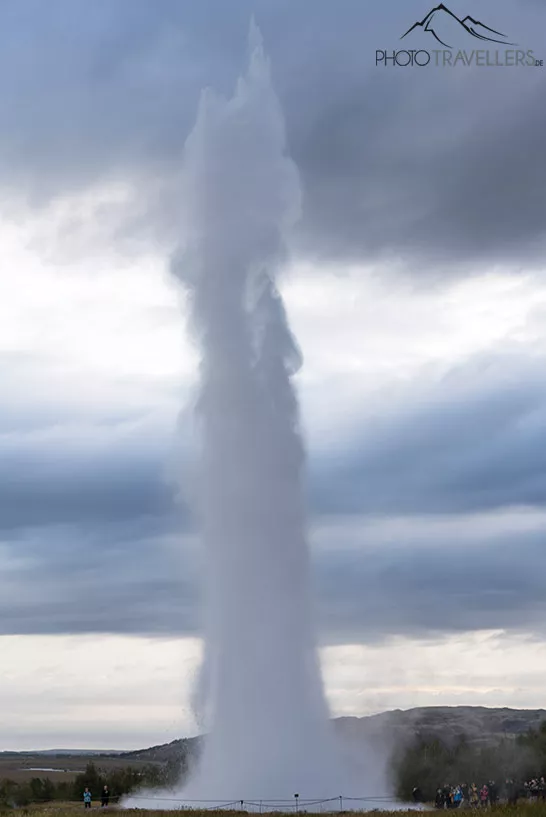 The eruptions of Strokkur are sometimes smaller, sometimes larger. This outbreak is already quite a lot
The eruptions of Strokkur are sometimes smaller, sometimes larger. This outbreak is already quite a lotAnother highlight in Iceland is the geyser geothermal area in the Haukadalur Valley, also part of the Golden Circle. It is bubbling and bubbling everywhere. People wait in front of the Strokkur geyser for it to erupt.
The geyser shoots the water 15 to 20 meters into the air. This happens about every ten minutes and is a great experience. You can also hike in the volcanic area – for example up a nearby hill with a great view.
In addition to the Strokkur geyser, there is also the Great Geyser, which gives its name to all the geysers in the world. The Great Geyser was described as early as the 13th century, making it the oldest known geyser in the world. Unlike Strokkur, the eruptions of the Great Geyser are rare and unpredictable. The fountain of the Great Geyser probably reached up to 170 meters into the sky in the mid-19th century. The Great Geyser no longer reaches this height today.
Incidentally, it smells terribly of rotten eggs in the area because of the sulphur. Nevertheless, you can’t miss this great sight .-).
Hotel tip: We recommend the Hotel Geysir* and the Litli Geysir Hotel*.
12. Stuðlagil Canyon
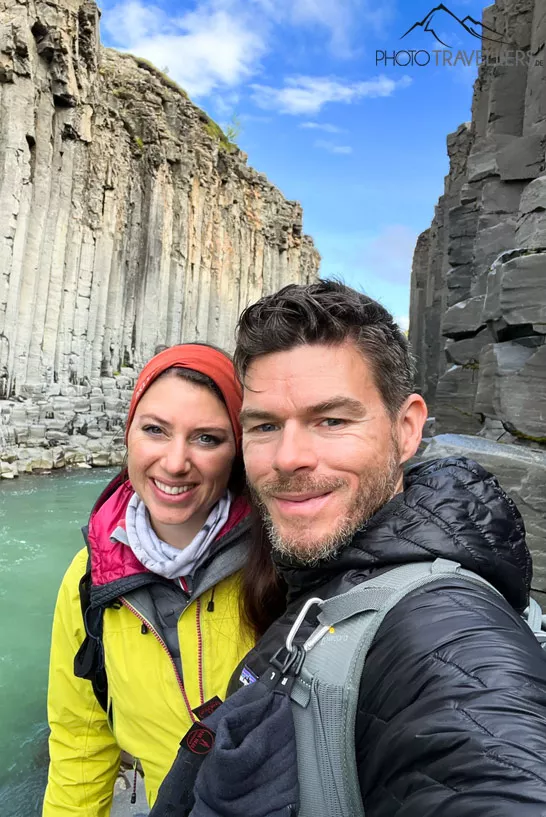 On our first visit to Stuðlagil Canyon, we were overwhelmed by the beautiful nature
On our first visit to Stuðlagil Canyon, we were overwhelmed by the beautiful nature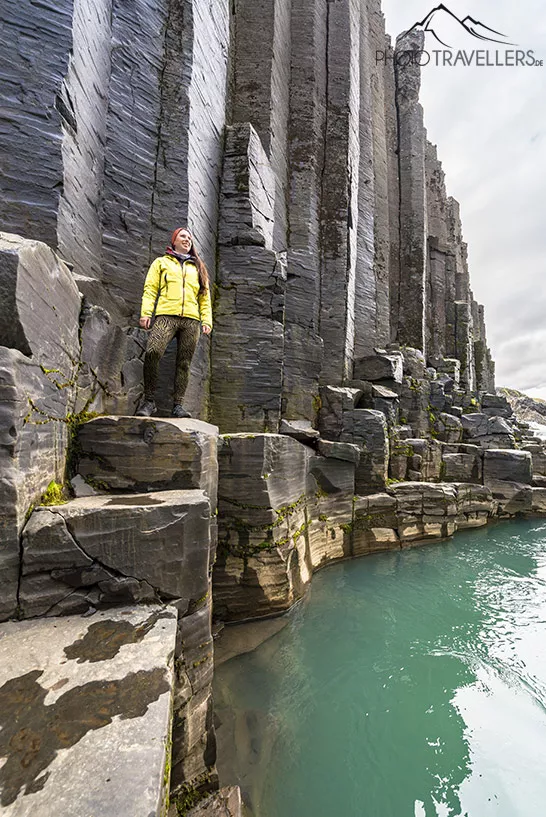 With a little skill, you can walk through the entire canyon
With a little skill, you can walk through the entire canyon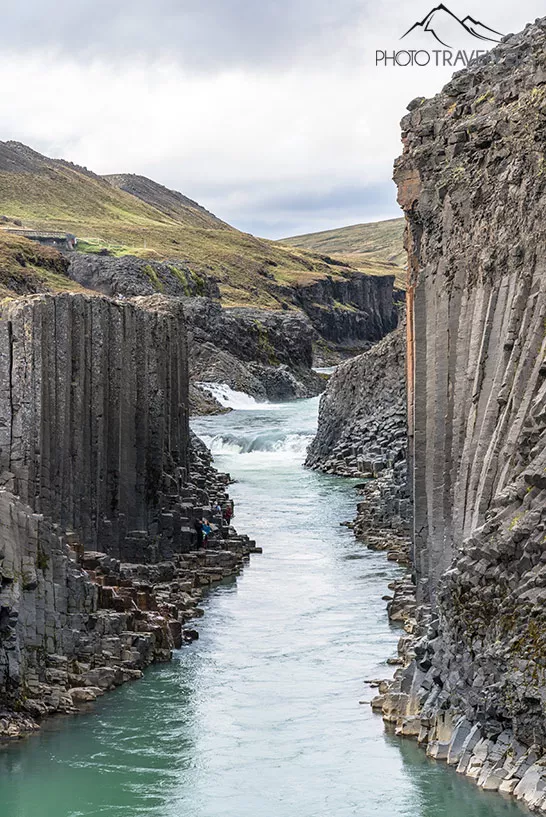 You might think these basalt formations are out of this world
You might think these basalt formations are out of this worldThe Stuðlagil Canyon in the east of the volcanic island is out of this world. At this well-known tourist attraction, huge basalt columns rise vertically into the sky. The river Jökulsá á Brú flows in between. The basalt columns, some of which are horizontal, are a particular highlight. Pay attention to it!
You can only reach Stuðlagil Canyon on foot. From the parking lot (Google Maps) on the south side of the river (you can’t get into the canyon from the north side, only to a viewing platform), you hike a good two kilometers through breathtaking scenery to your destination. With a little climbing skill, you can walk into the canyon. Absolutely worth seeing!
Hotel tip: There are no hotels or guesthouses in this remote area. You will only find what you are looking for again in the small town of Egilsstaðir. We recommend the Ormurinn Cottages* and the Lake Hotel Egilsstadir*.
13. Dettifoss & Selfoss
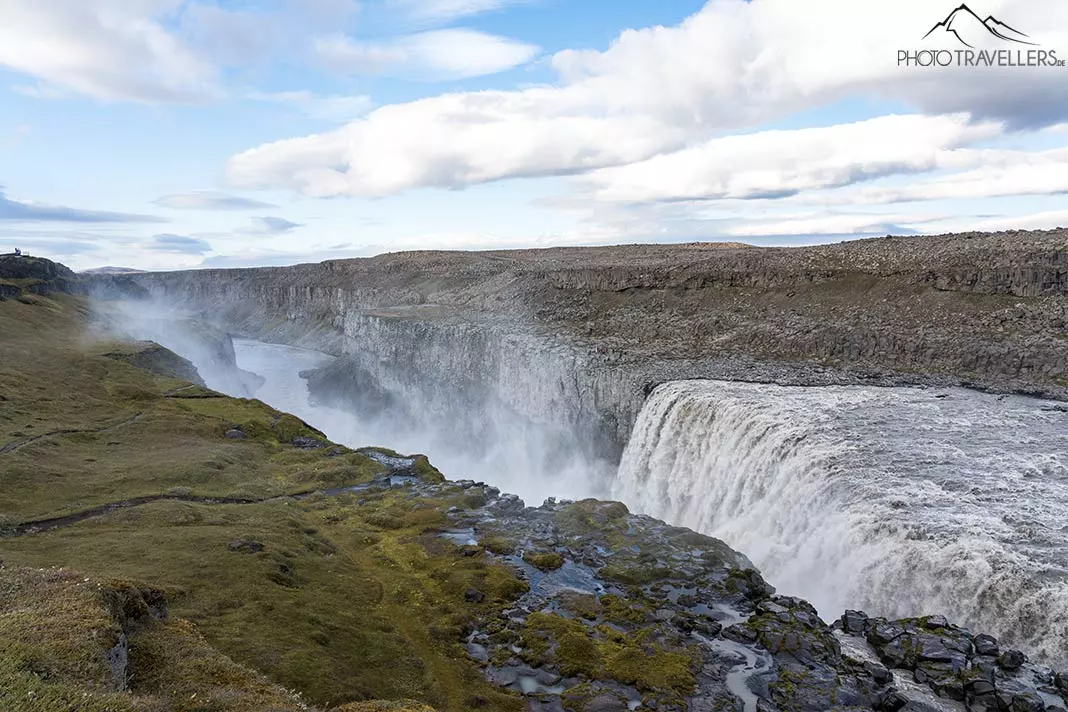 Dettifoss is an absolutely stunning Icelandic sight
Dettifoss is an absolutely stunning Icelandic sight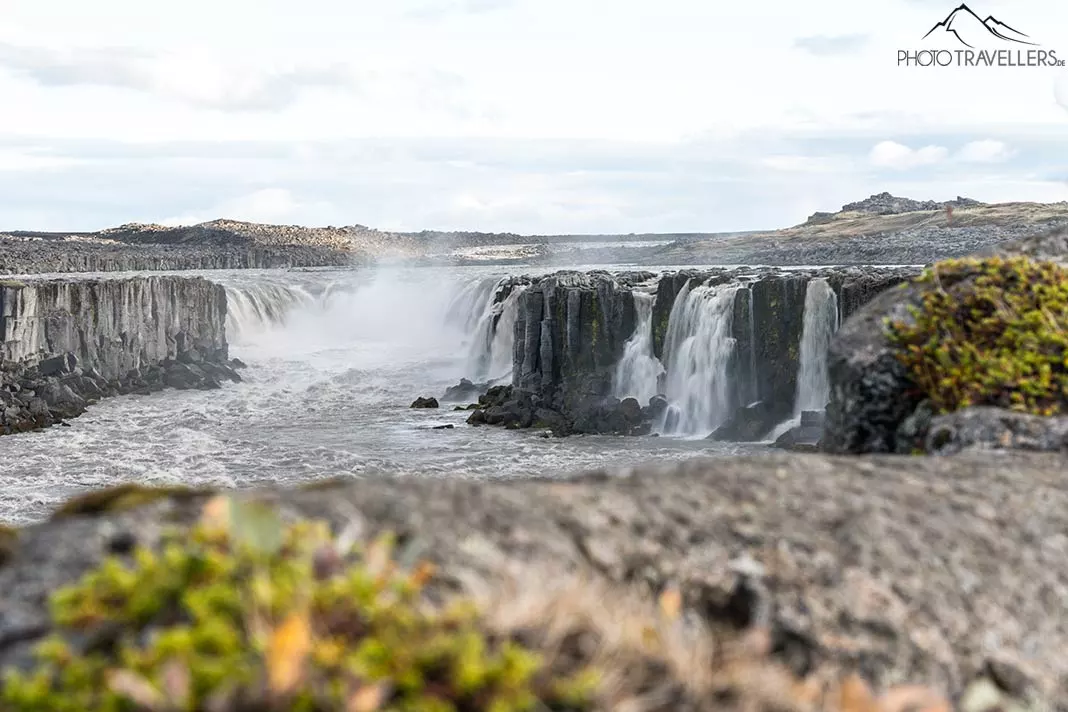 Selfoss is just a stone’s throw away from Dettifoss and is also well worth a visit
Selfoss is just a stone’s throw away from Dettifoss and is also well worth a visitDettifoss (Google Maps) should not be missing from our list of top sights. With a roar, the waterfall plunges 45 meters into the depths. The Dettifoss – which means cascading waterfall – carries more water than any other waterfall in Europe.
You should not be afraid of water. The spray soaks anyone who gets close to the waterfall. Rain gear is recommended for a visit.
Tip: Take a detour to nearby Selfoss. With a drop of ten meters, Selfoss is tiny compared to Dettifoss – but it is certainly impressive. In the past, you could even go directly to the beautiful waterfall. Today there are numerous barriers to protect nature from the masses of visitors.
Hotel tip: Hotels and guesthouses are rare in the area. To the north, on road 85, you will find the beautiful Nordic Natura* accommodation.
14. Beach of Reynisfjara
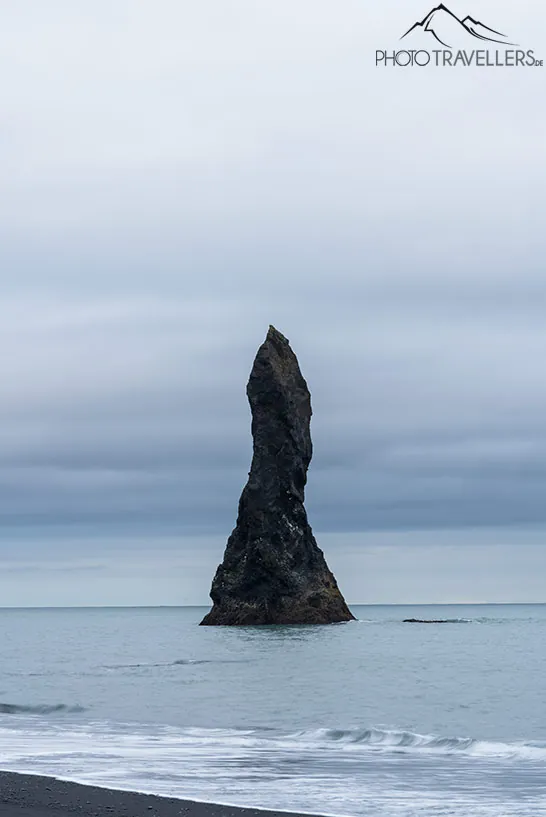 Reynisfjara Beach is known for the rocks in the sea
Reynisfjara Beach is known for the rocks in the sea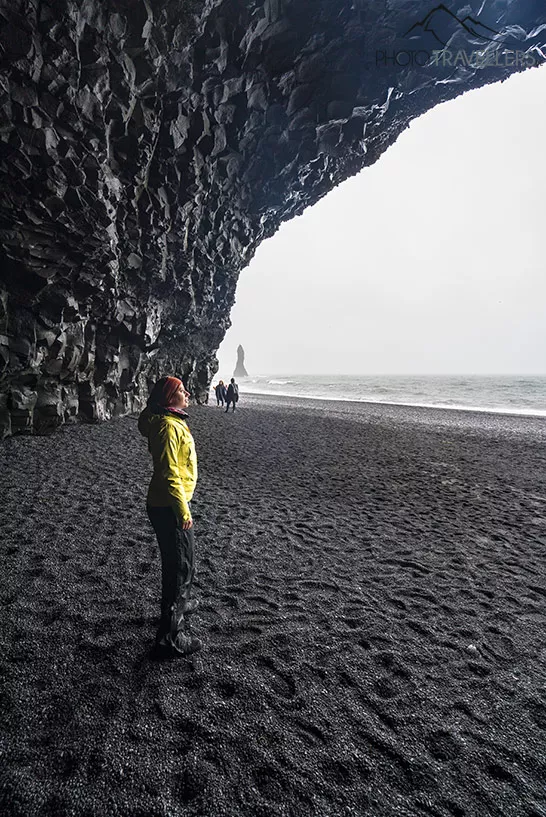 The coast with the basalt cliffs and the Hálsanefshellir Cave is really cool
The coast with the basalt cliffs and the Hálsanefshellir Cave is really cool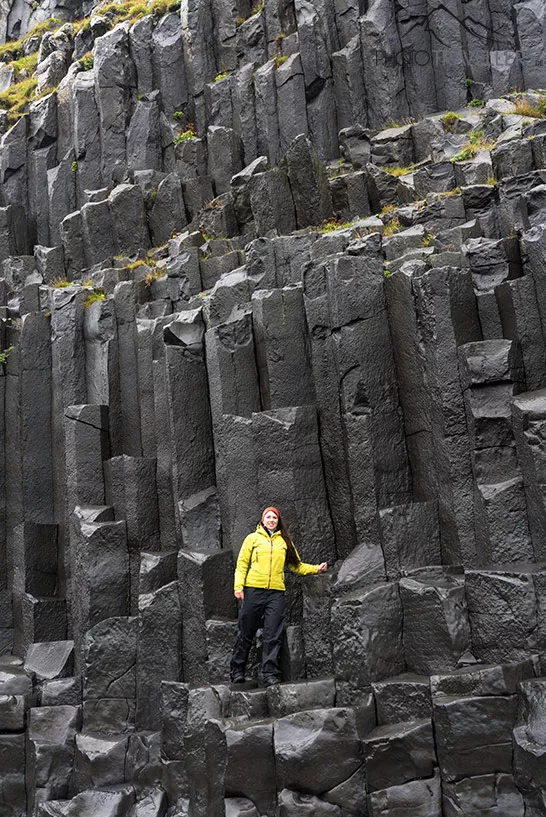 With a little skill, you can even climb a little way up the basalt rocks
With a little skill, you can even climb a little way up the basalt rocksReynisfjara Beach near Vik (Google Maps) is another top highlight in Iceland that no visitor should miss. The seemingly endless lava beach, steep basalt cliffs (known as Reynisdrangar) with the Hálsanefshellir cave and huge lava rocks in the sea make this place so special.
Caution is advised directly on the beach! At any time, even in calm weather, visitors must be prepared for unexpectedly(!) large waves that crash onto the beach as if from nowhere and, in the worst case, sweep you into the rough sea. There have already been fatalities here. A warning system has now been installed. You will find more information directly when you enter the beach.
If you would like to see the breathtaking landscape from the air, a tandem paragliding flight over Vik i Myrdal* is a great option. An insider tip is the Katla volcano ice cave tour* from Vík. The Katla volcano lies beneath the famous Mýrdalsjökull glacier.
In Vík, the Icelandic Lava Show (book your ticket here*) is one of the best-known highlights. In this show, which is also popular with families with children, you get to see glowing lava! This is unique in the world. In the same building, you can also book the “Zip Lining” adventure across the Grafargil Gorge (book your ticket online here*).
In the associated restaurant, The Soup Company, there are super tasty soups (and you even get seconds).
Hotel tip: We recommend the Black Beach Suites*, located almost directly on the famous beach of Reynisfjara. Staying at The Barn* is much cheaper, but also easier.
15. Secret Lagoon/ Gamla Laugin
While the “Blue Lagoon” is the best-known thermal bath in Iceland, the“Secret Lagoon” in Flúðir holds the title of“oldest thermal bath” in the country. You can buy your ticket here*.
We really liked the Secret Lagoon (“Gamla Laugin“, which means old swimming pool). A large pool with hot volcanic water awaits you. There is also a small geyser on the site.
There is also a small bar. You can also enjoy the drinks in water (in a plastic glass). Compared to the Blue Lagoon, the Secret Lagoon has a more relaxed atmosphere and the entrance fee of 3,000 Icelandic kroner is relatively moderate.
Hotel tip: In the village, we recommend the Hotel Fludir* and the Guesthouse Fludir – Grund*.
16. Lava tunnel Raufarhólshellir
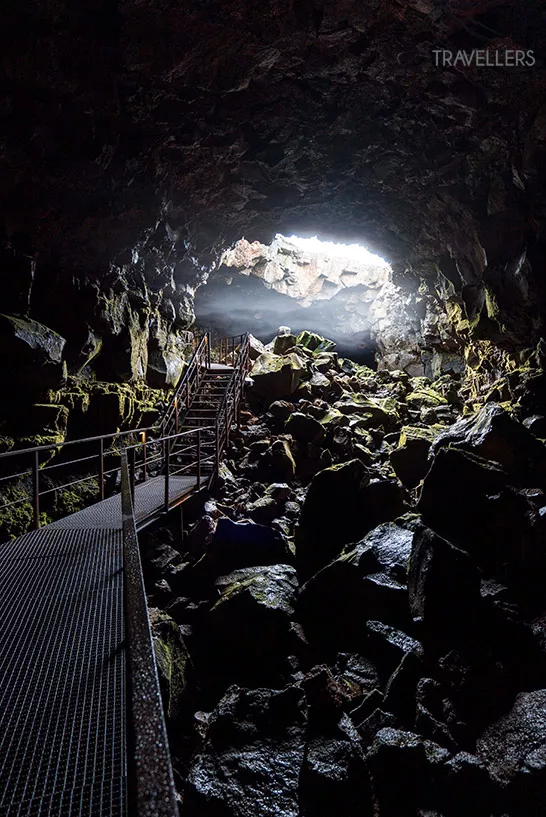 The lava tunnel is perfectly developed
The lava tunnel is perfectly developed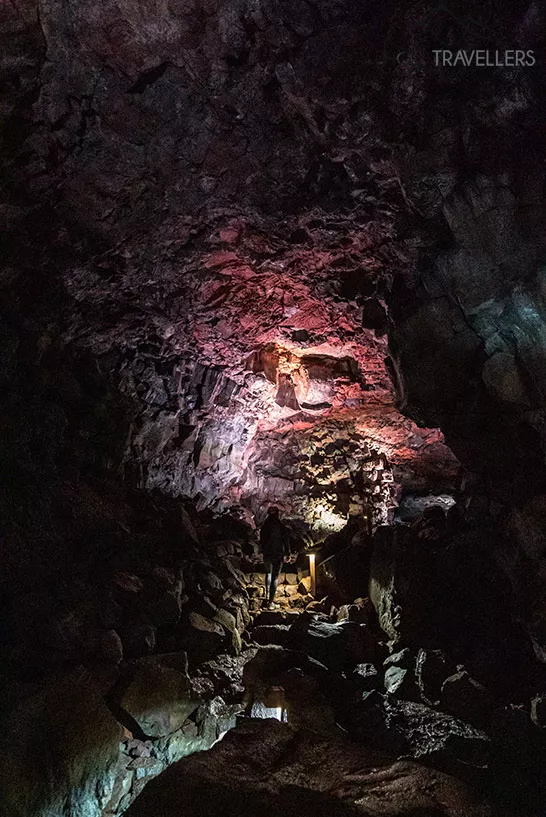 The colors are amazing
The colors are amazing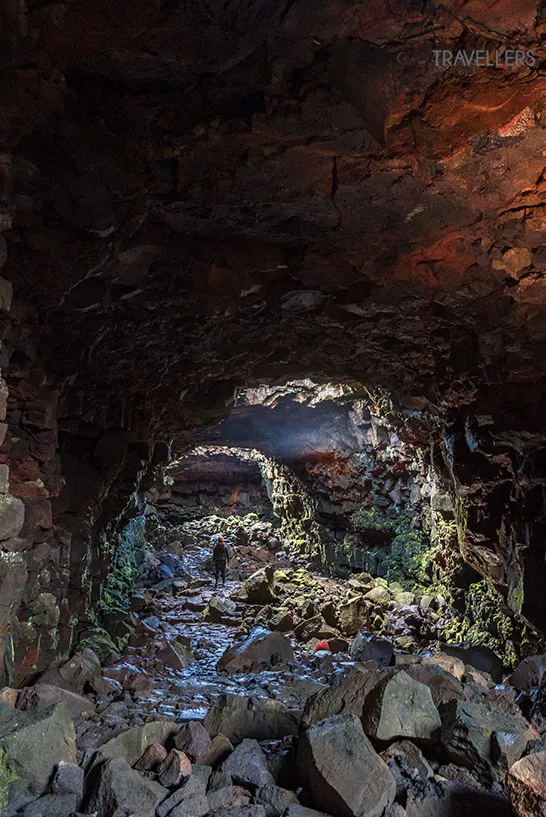 We can highly recommend the tour
We can highly recommend the tourThe Raufarhólshellir lava tunnel, 40 minutes from Reykjavík, was a huge hit with us. We have never seen anything like it before. We can warmly recommend a visit to this wicked sight. You can buy your ticket here*.
From the entrance, as part of a guided tour, you first walk through a huge, half-open tube that was once formed by hot lava.
It soon goes dark. An unforgettable experience, also for families with children.
This highlight is very popular. You should definitely buy your tickets for this unforgettable Iceland adventure in advance.
Hotel tip: You will find some great accommodation nearby, in the village of Hveragerði. We recommend the Frost & Fire Boutique Hotel* and the Varmi Guesthouse*.
17. Stokksnes
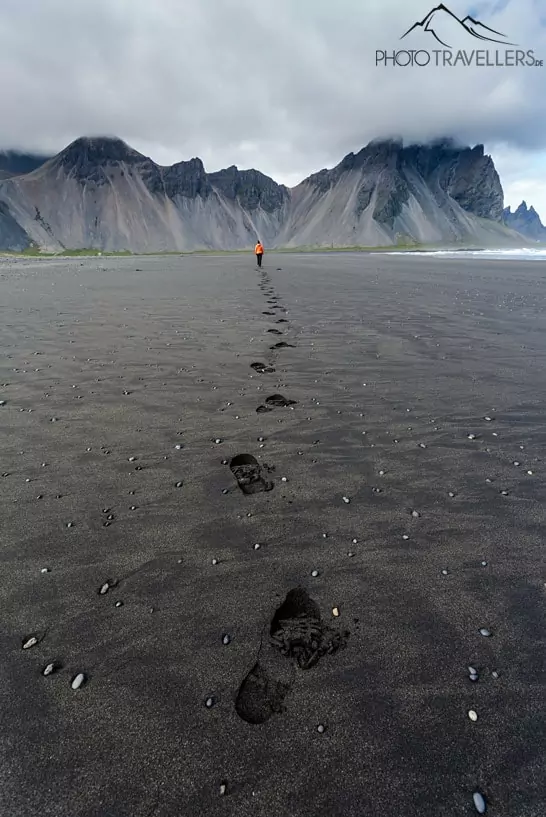
The Stokksnes headland has long been an insider tip in Iceland. Thanks to the many great pictures on Instagram, Stokksnes has become a top spot for all travelers to Iceland.
This place is gorgeous and it’s just fun to walk along the black lava beaches and watch the birds in flight. Please pay attention to nature. Don’t break any plants and don’t leave any garbage behind.
The entrance fee is around six euros – definitely worth it. There is also a Viking village that was once recreated for a film production. This is especially fun for children, but not a must for adults.
Hotel tip: We recommend the Aurora Cabins Höfn Iceland* near Höfn.
18. Peninsula Dyrhólaey
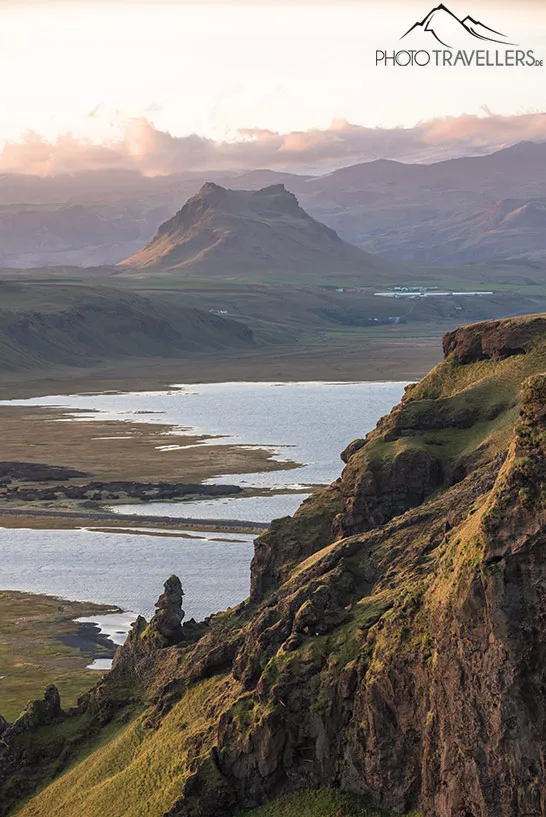 The landscape up here will enchant you
The landscape up here will enchant you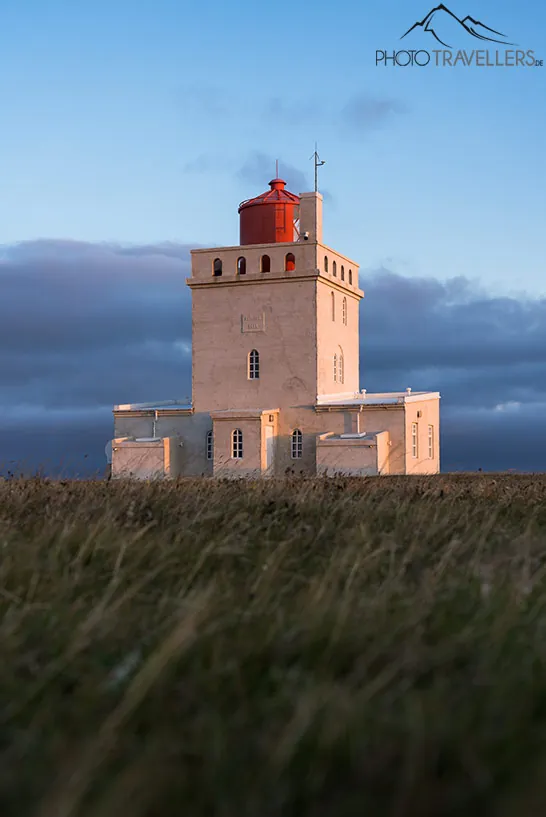 The Dyrhólaey lighthouse is a great photo opportunity in the evening
The Dyrhólaey lighthouse is a great photo opportunity in the evening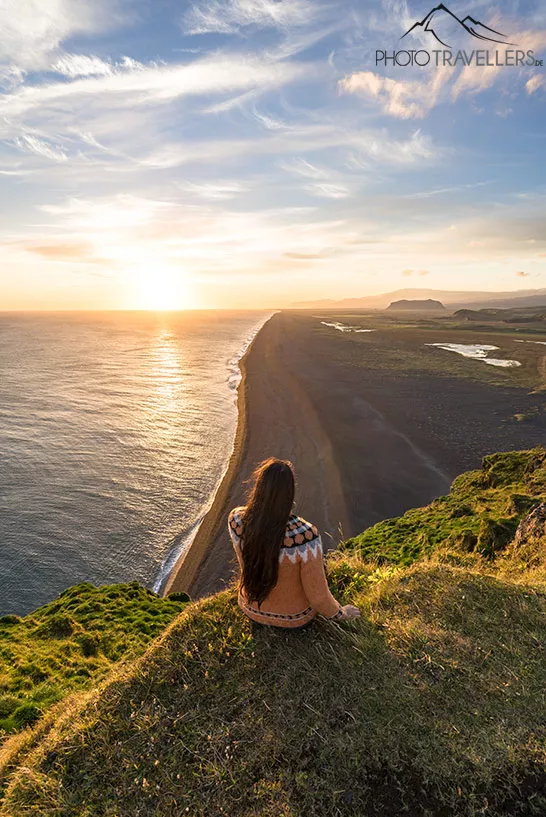 Isn’t that beautiful? However, you have to be very careful as the rock edges are brittle
Isn’t that beautiful? However, you have to be very careful as the rock edges are brittleThe Dyrhólaey peninsula (Google Maps), which translates as Door Hole Island, is another beautiful place you should definitely see. From the viewpoint with the Dyrhólaey lighthouse dating back to 1927, which you can now easily reach via a paved road, you have one of the most beautiful views over the south coast of Iceland with Dyrhólaey Beach.
It is particularly impressive up here in the evening when the sun sets into the sea. The highlight is the huge stone arch in the sea, through which boats also sail. You can also observe puffins in summer.
Also worth seeing is the nearby Kirkjufjara Beach below the viewpoint, which is unfortunately no longer open to the public. From the Reynisfjara viewpoint (accessible from the lower parking lot) you have a great view of the imposing rock Arnardrangur or “Eagle Rock”. In the distance you can see the famous coast of Reynisfjara, our top sight number 15.
Well, are you as excited as we are? So it’s no wonder that the Dyrhólaey peninsula is one of the most popular excursion destinations in Iceland.
Hotel tip: Two great places to stay nearby are the Grand Guesthouse Gardakot* and the Volcano Hotel*.
19. Sólheimajökull glacier tongue
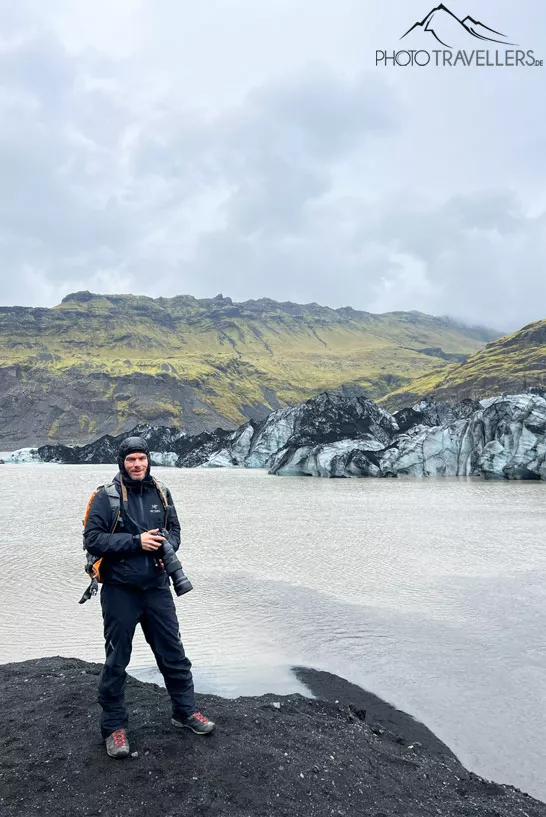 With the telephoto lens you can take great pictures of the Sólheimajökull glacier tongue
With the telephoto lens you can take great pictures of the Sólheimajökull glacier tongue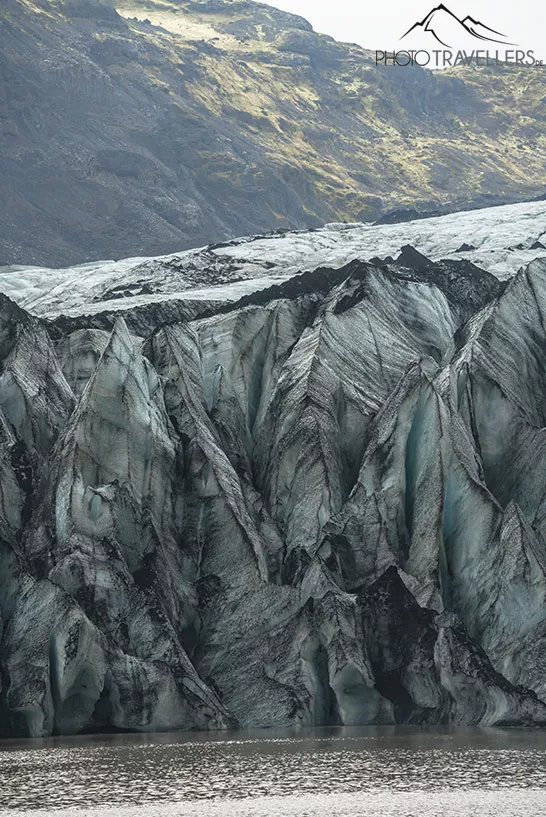 This beautiful place exudes magic
This beautiful place exudes magic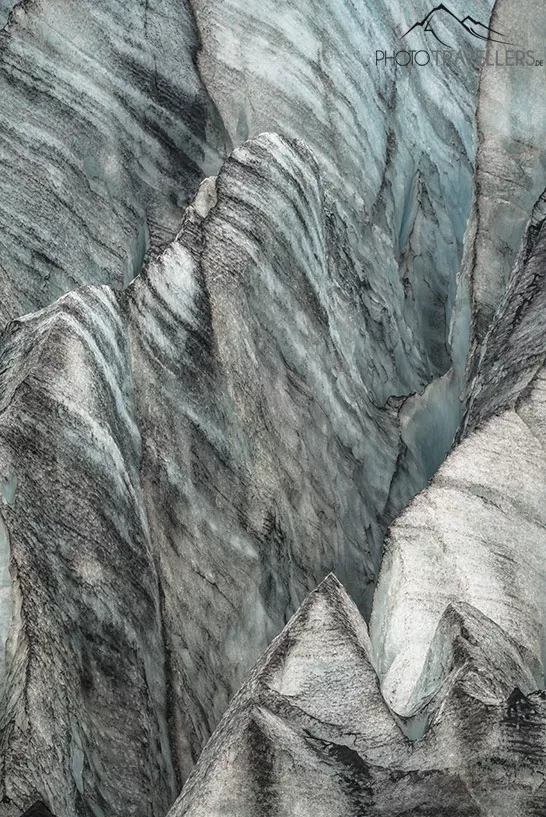 It’s great what shapes and colors nature creates
It’s great what shapes and colors nature createsLocated to the east of the famous Skógafoss, Sólheimajökull, a glacier tongue of Mýrdalsjökull, is an outdoor highlight. From the parking lot, you can walk a short distance towards the imposing glacier tongue. With the telephoto lens you can take great detail shots here. By the way, you can find our photo equipment here.
The glacier offers numerous small adventures that will make your vacation in Iceland unforgettable.
| Adventure tours on Mýrdalsjökull | Price | Ticket |
|---|---|---|
| Kayaking in the Sólheimajökull glacier lagoon | approx. 80 Euro | ➤ book here* |
| Glacier hiking expedition | approx. 90 Euro | ➤ book here* |
| Snowmobile tour on the Mýrdalsjökull glacier | approx. 160 Euro | ➤ book here* |
| Ice climbing with a hike on Sólheimajökull | approx. 190 Euro | ➤ book here* |
20. Litlanesfoss & Hengifoss
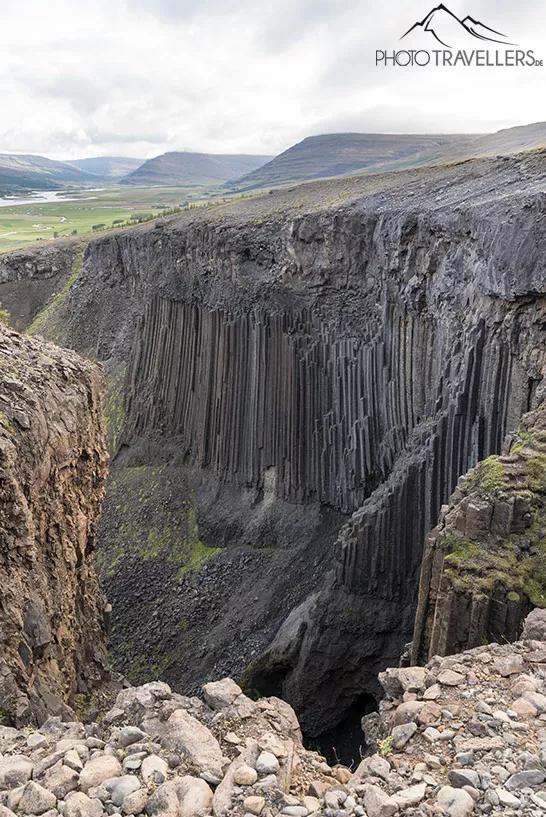 The hike takes you past these impressive basalt formations
The hike takes you past these impressive basalt formations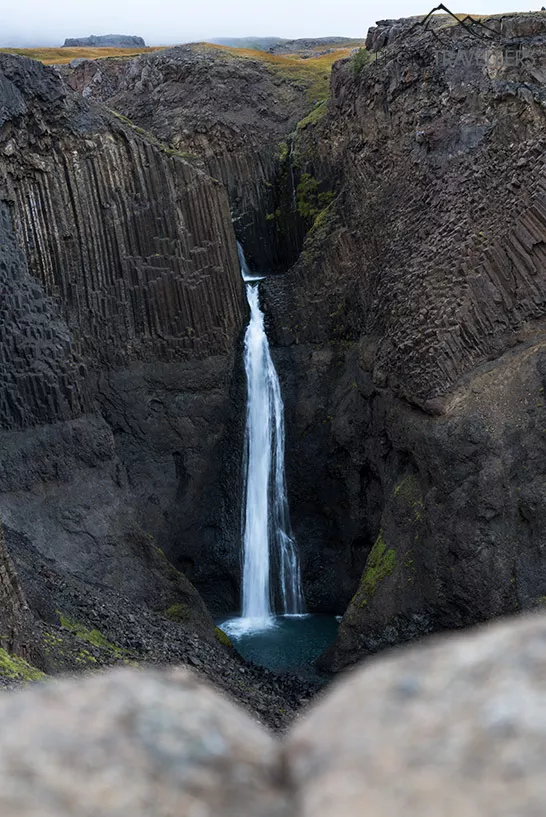 Litlanesfoss stands in the shadow of the famous Hengifoss, but is no less worth seeing
Litlanesfoss stands in the shadow of the famous Hengifoss, but is no less worth seeing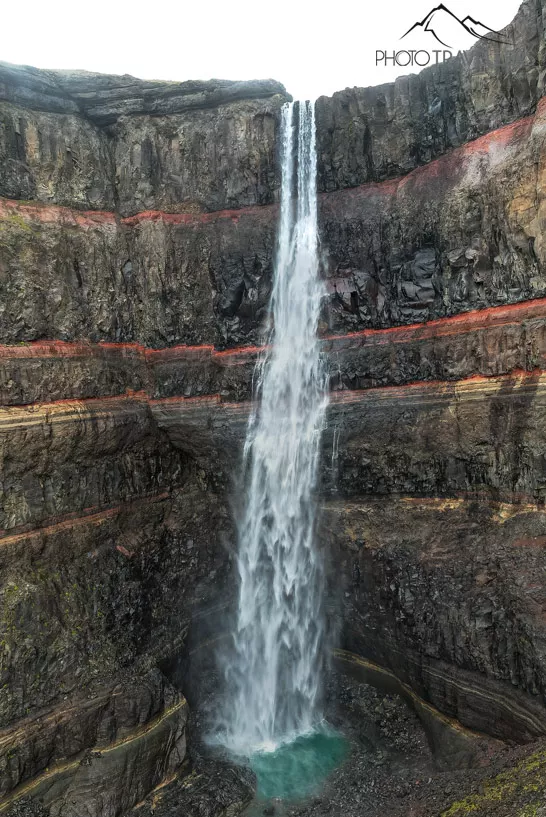 Hengifoss awaits you at the end of the hike
Hengifoss awaits you at the end of the hikeAt 118 meters, Hengifoss is Iceland’s fourth highest waterfall and one of the top attractions in the east of the island. From the parking lot on road 931 (Google Maps), the hiking trail (one on each side of the impressive gorge) leads quite steeply upwards. You will pass the impressive Litlanesfoss about halfway along the route.
At the end of the official hiking trail there is a platform with a view of Hengifoss. But the waterfall is still quite far away. You can follow a trail further towards the waterfall. However, there is an increased risk of falling rocks here! You should also be sure-footed. You can only get to the foot of the waterfall under difficult conditions. In any case, you must cross the stream at a suitable point.
Take the path on the other side of the gorge for the descent. This opens up completely new perspectives.
Hotel tip: The popular Hengifoss Guesthouse* is located in the immediate vicinity of Hengifoss. A little further away is the beautiful Hotel 1001 Nott*.
21. Auroras in Iceland
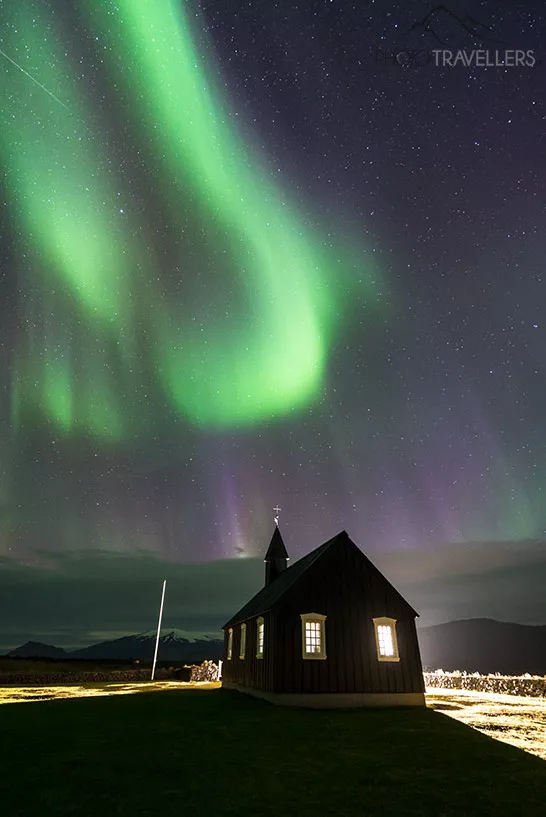 Northern lights are one of the most spectacular natural phenomena in the world
Northern lights are one of the most spectacular natural phenomena in the world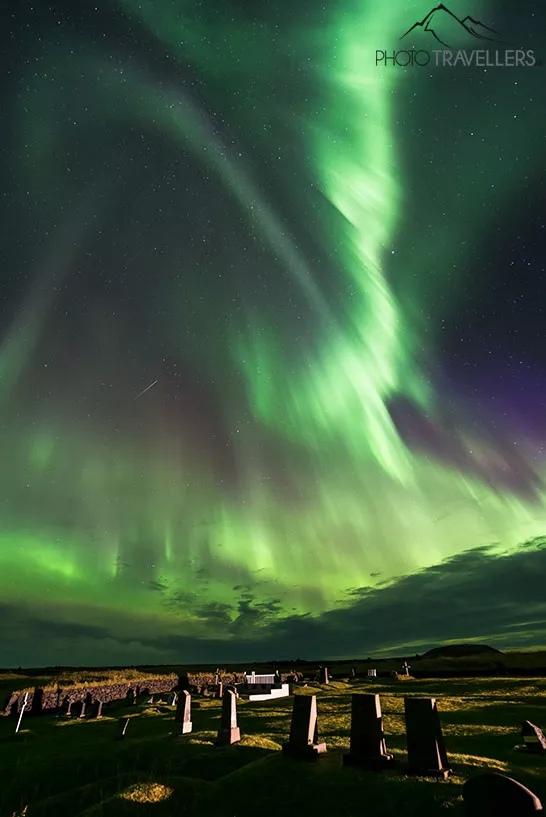 You can see the Northern Lights in Iceland as early as mid-August
You can see the Northern Lights in Iceland as early as mid-August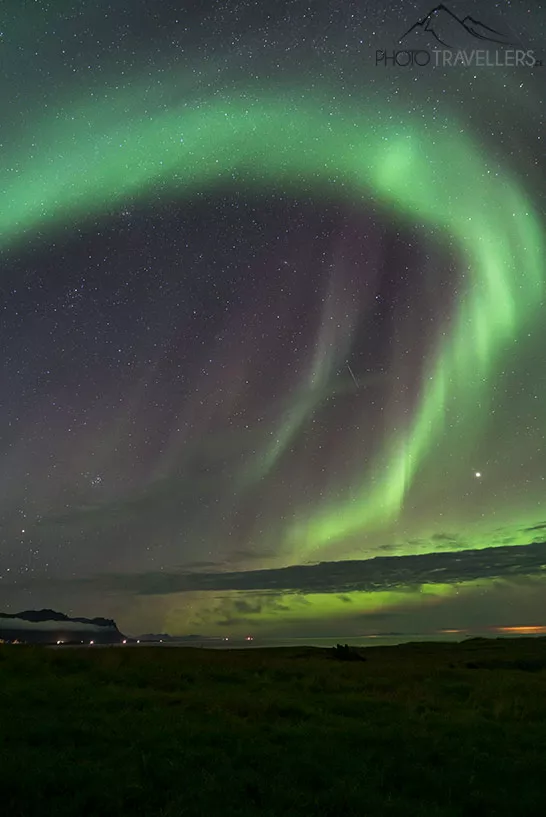 Northern lights form the wildest shapes in the night sky
Northern lights form the wildest shapes in the night skyBesides the impressive landscape, the northern lights are the main reason to travel to Iceland. You’ll never forget your first auroras. We always like to remember the cold polar nights when the colorful lights shine in the sky. When the Northern Lights dance in the night sky, it is an unforgettable experience that even captivates Icelanders.
When can you see the Northern Lights in Iceland? Unfortunately, you can’t plan the Northern Lights (unlike other sights on the volcanic island). You have the best chance of seeing the Northern Lights in Iceland from mid-September to early April. It doesn’t get really dark in Iceland during the summer months. The northern lights are there, but you can’t see them.
Here we reveal 15 tips for photographing the Northern Lights. You’ll also find the ultimate guide for breathtaking landscape photos here.
If you are a little adventurous and have your own car in Iceland, you can go aurora hunting yourself. Guided tours are an alternative. But there are big differences here. We recommend the provider Arctic Adventures. The guides will do everything they can to give you a unique experience. This can take all night. You can book an aurora tour with the Super Jeep (from Reykjavík) here*.
22. Snæfellsjökull National Park
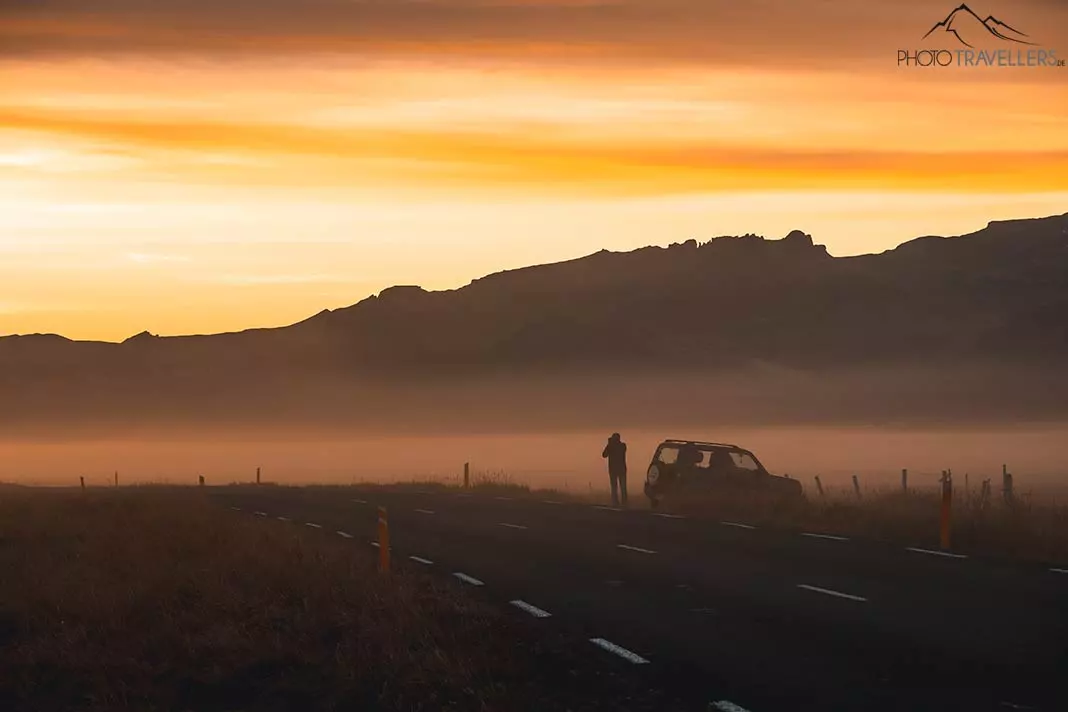 Even the approach to Snæfellsjökull National Park in the evening is spectacular
Even the approach to Snæfellsjökull National Park in the evening is spectacular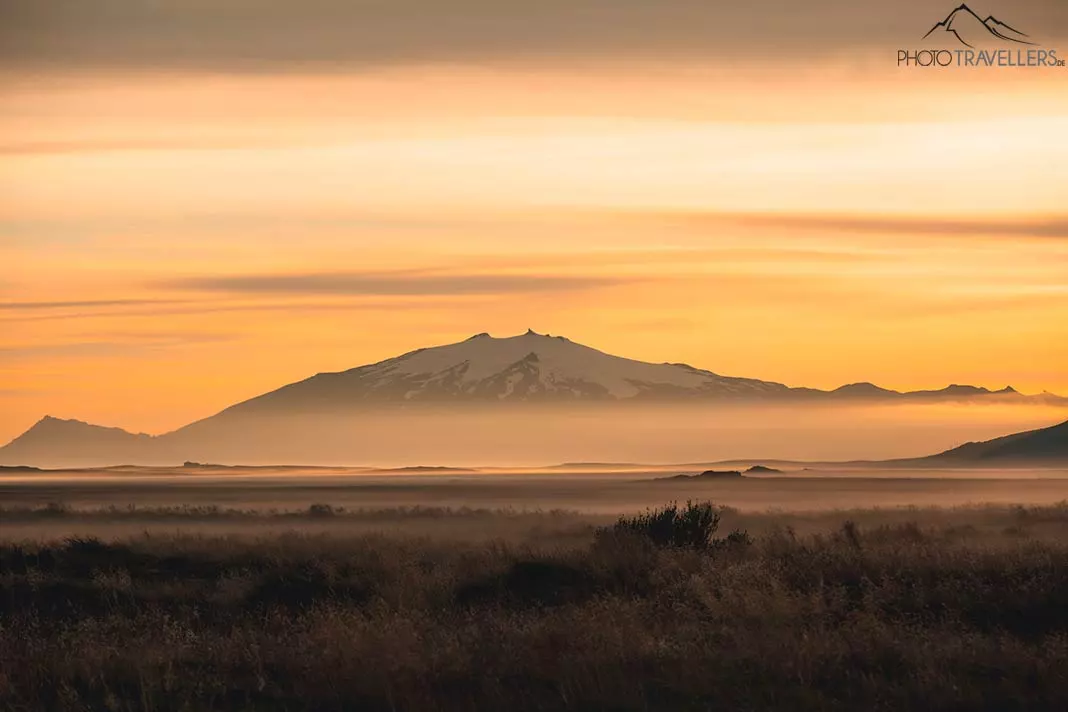 This is the Snæfellsjökull volcano, around which the national park has been established
This is the Snæfellsjökull volcano, around which the national park has been establishedSnæfellsjökull National Park on the Snæfellsnes peninsula is an absolute highlight in Iceland. There is an incredible amount to see here and the landscape is indescribably beautiful.
One of the top sights in Snæfellsjökull National Park is the black sand beach Djúpalónssandur. Scattered along the beach are ancient, rusty parts of a fishing trawler that capsized in 1948, the British“Epine“.
The two Lóndrangar rock towers, which stand in the sea, are a must-see. There are some beautiful hiking trails in the area.
From the edge of the 109-meter-high Saxholl crater, you have a great view of the surrounding area. The hike only takes about ten to 15 minutes and is doable for everyone.
Skarðsvík Beach enchants with white sandy bays almost like in the Caribbean. Those without glacier ambitions can easily explore Snæfellsjökull National Park in their own car.
Just outside the national park is the beautiful Svöðufoss waterfall, which you can reach after a short walk.
Hotel tip: The Freezer Hostel & Culture Center* is a good and reasonably priced place to stay. For a slightly more chic stay, head to the Hótel Búðir*.
| Organized tours | Price | Ticket |
|---|---|---|
| Day tour option 1 to the Snæfellsnes peninsula (from Reykjavík) | approx. 130 Euro | ➤ book here* |
| Day tour option 2 to the Snæfellsnes peninsula (from Reykjavík) | approx. 130 Euro | ➤ book here* |
23. Vatnshellir lava cave
Another highlight not to be missed in Snæfellsjökull National Park is the Vatnshellir lava cave. The impressive cave, which has only been open to visitors since 2011, takes you deep into the interior of the volcanic island.
A world of absolute darkness and silence awaits you. You can explore this natural wonder as part of a guided group tour. You can descend up to 32 meters. Use your headlamp to discover bizarre rock formations and interesting plays of color.
Helmet and lamp are of course provided.
24. Crater lake Kerið
One of the most beautiful places in Iceland is the picturesque Kerið crater lake, which you will visit as part of the Golden Circle round trip.
From the parking lot (Google Maps), a leisurely hiking trail leads around the entire lake in an impressive setting. One path even leads down into the crater to the water. A highlight that you should definitely see!
Hotel tip: The luxurious Hotel Grimsborgir – Your Golden Circle Retreat* is a great place to stay close to this popular attraction. The Minniborgir Cottages* are good and relatively inexpensive.
| Organized tours | Price | Ticket |
|---|---|---|
| Golden Circle and Kerið Crater day tour (from Reykjavík) | approx. 65 Euro | ➤ book here* |
| Golden Circle, Kerið Crater & Blue Lagoon (from Reykjavík) | approx. 200 Euro | ➤ book here* |
| Golden Circle, Kerið Crater & Secret Lagoon (from Reykjavík) | approx. 100 Euro | ➤ book here* |
25. Coast at Arnarstapi with stone arch Gatklettur
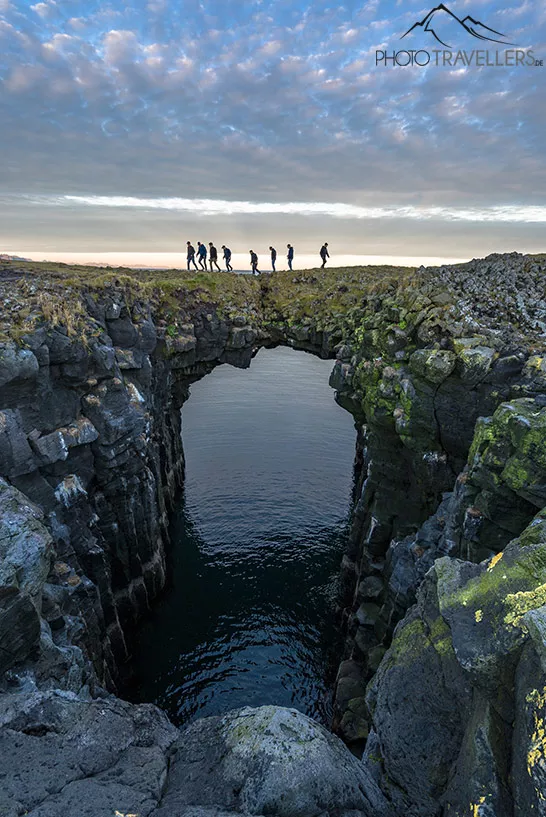 In addition to the Gatklettur stone arch, there are two other impressive stone arches on the coast of Arnarstapi
In addition to the Gatklettur stone arch, there are two other impressive stone arches on the coast of Arnarstapi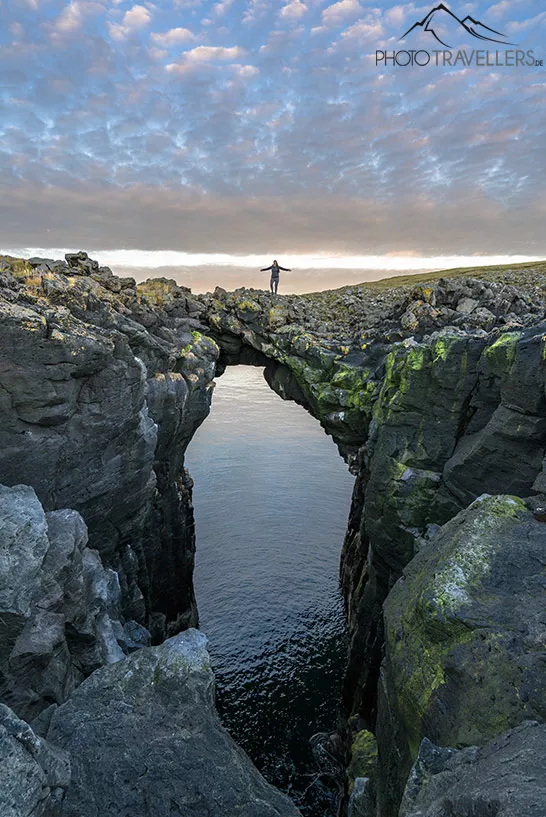 Here Biggi is standing on the third stone arch
Here Biggi is standing on the third stone arch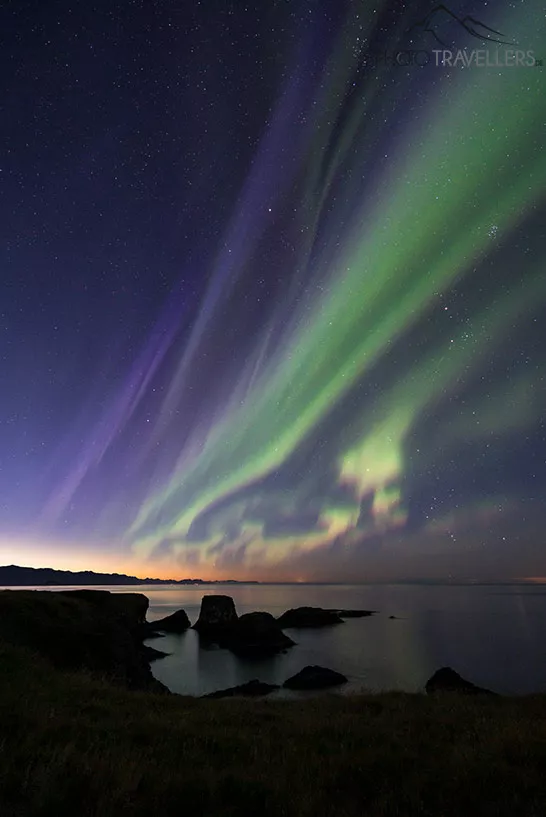 Of course, if you’re lucky, you can also see the Northern Lights in this beautiful place
Of course, if you’re lucky, you can also see the Northern Lights in this beautiful placeThe rugged basalt coast near the village of Arnarstapi in the south of the Snæfellsnes peninsula is a destination well worth seeing. The most famous highlight on the coast is the Gatklettur stone arch (Hellnar Arch).
Take the time to explore the coast on the wide hiking trails – you’ll be amazed. There is much more to see in the area than just the Gatklettur stone arch. Fascinating deep views and two more large stone arches in the sea await you.
Hotel tip: We felt comfortable at the Arnarstapi Hotel*. Relatively simple, but modern and equipped with huge windows.
26. Ferry trip from Brjánslækur to Stykkishólmur
The journey by car ferry from Brjánslækur in the Westfjords to Stykkishólmur on the Snæfellsnes peninsula (or vice versa) along Iceland’s impressive coastline is an unforgettable experience and a must on any vacation in Iceland.
Halfway along the route, the ship docks in the port of Flatey. Flatey is the largest island in the Breiðafjörður fjord (but still very small). You can get off at Flatey and continue on the evening ferry. In the summer months from June to August, this is possible every day. During the rest of the year, this is only possible on certain days (see ferry timetable).
The ferry staff will take care of the car. Flatey is free of charge. If you want to explore Flatey, you must let us know before you check in. Flatey is one of Iceland’s cultural highlights. The Flateyjarbók is one of the most famous medieval Icelandic manuscripts and was kept on the island for a time. This is where the collective manuscript of many sagas got its name. Several films were also shot on Flatey.
Here we reveal the top sights in the Westfjords.
27. Whale watching in Húsavík
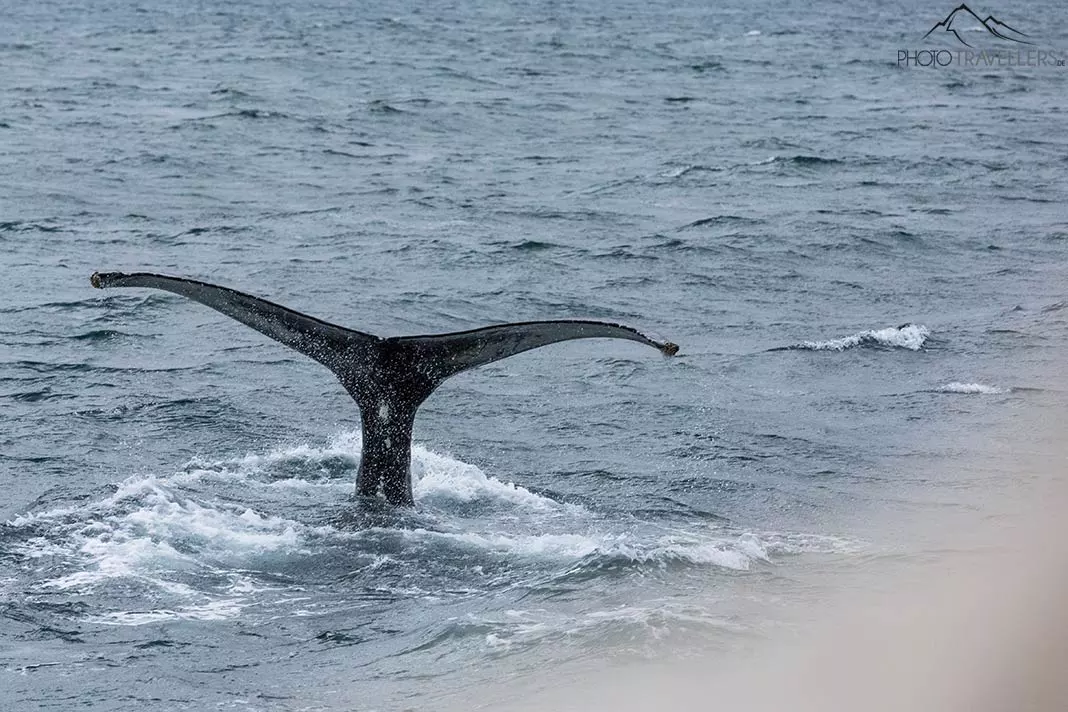 We had an unforgettable contact with a whale
We had an unforgettable contact with a whale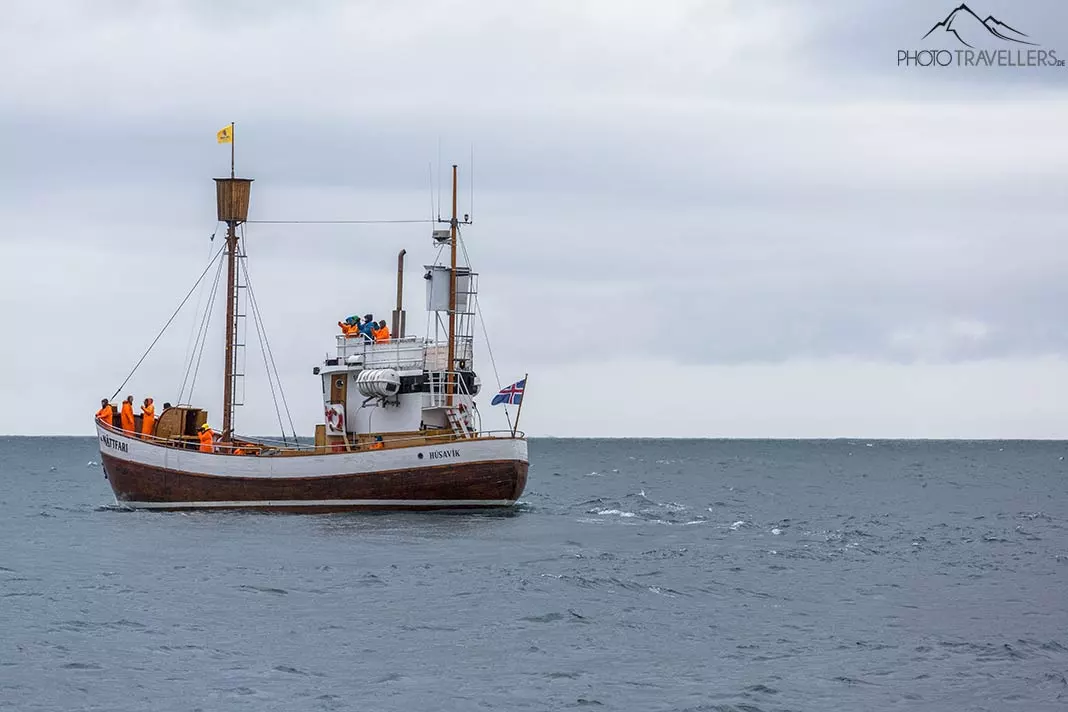 With a bit of luck, you’ll get to see whales in Iceland. This alone makes a trip to the volcanic island worthwhile
With a bit of luck, you’ll get to see whales in Iceland. This alone makes a trip to the volcanic island worthwhileAnyone traveling to Iceland should make a stop in the small village of Húsavík (Google Maps) and take part in awhale watching tour. There are several whale tour operators in the harbor of this small town in the north of Iceland.
There is a good chance of seeing one of these impressive marine mammals. The providers advertise sighting rates of over 90 percent. However, you shouldn’t hope that the giant marine mammals will swim close to your boat. That’s why you should pack a telephoto lens.
In the high season, it can be difficult to get a free place on one of the whale-watching boats. You are on the safe side if you book one of the tours online in advance.
Hotel tip: The Skjálfandi Apartments* are one of the nicest places to stay in the town. We also recommend the Árból Guesthouse* and the Fosshotel Húsavík.
| Whale-watching tours in Húsavík | Price | Ticket |
|---|---|---|
| Traditional whale-watching tour | approx. 80 Euro | ➤ book here* |
| Whale watching on a wooden sailing ship | approx. 90 Euro | ➤ book here* |
| Great Whale Safari & Puffin Island Tour | approx. 140 Euro | ➤ book here* |
| Midnight sun whale watching | approx. 140 Euro | ➤ book here* |
28. Vatnajökull National Park
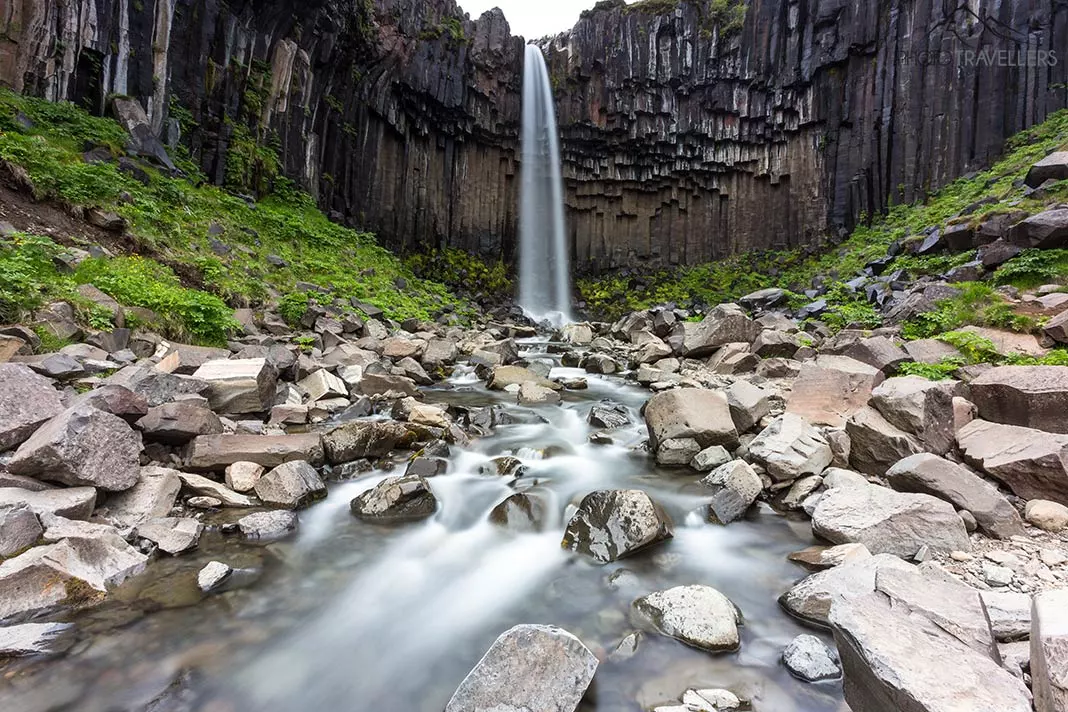 A wide hiking trail leads to Svartifoss. After just under an hour through the lush vegetation, you stand at the foot of the twelve-metre-high waterfall
A wide hiking trail leads to Svartifoss. After just under an hour through the lush vegetation, you stand at the foot of the twelve-metre-high waterfall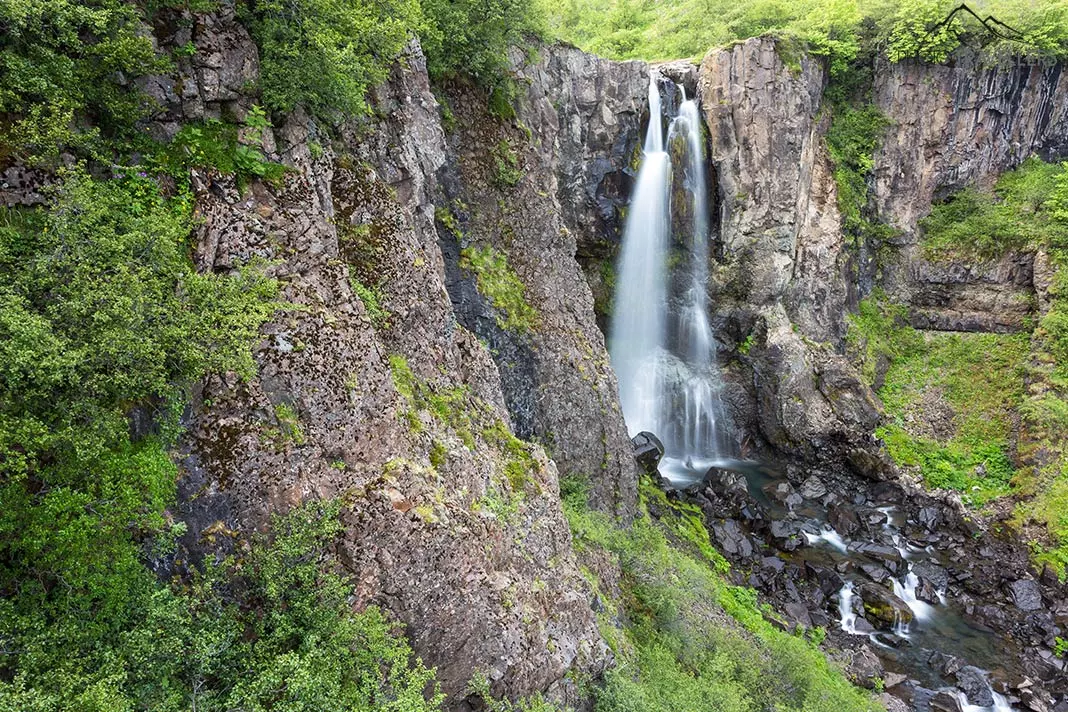 The idyllically situated Hundafoss is one of the easily accessible attractions in Vatnajökull National Park
The idyllically situated Hundafoss is one of the easily accessible attractions in Vatnajökull National ParkVatnajökull National Park (to which Skaftafell National Park was added in 2008) in the south of Iceland is an Eldorado for hikers and adventurers, covering an area of 4,800 square kilometers. Those who want to take it a little easier will also get their money’s worth in Vatnajökull National Park. The vast area is a popular tourist destination and an interesting place for Iceland vacationers.
One highlight is a guided glacier hike* in the national park – an unforgettable experience.
There is often not enough time to explore the national park extensively. An absolute “must do” is the easy family hike to Svartifoss – one of the top sights on the island.
Another highlight, which is also easy to reach, is the 24-meter-high Hundafoss (Google Maps). Just below the waterfall there is a small clearing from where you have a wonderful view of the waterfall.
You should also make a stop at the Skaftafelljökull glacier lagoon (Google Maps). Skaftafellsjökull is a ten-kilometer-long and approximately 2.5-kilometer-wide glacier tongue of Iceland’s largest glacier, Vatnajökull. The ice is everywhere, constantly breaking off chunks of ice into the brown glacial lake and disturbing the peace.
A hiking trail leads along the glacier and offers impressive views. After about 15 minutes, the path becomes quite challenging, almost an alpine climb. Under no circumstances should you try to get onto the glacier! A plaque at the entrance to the hiking trail commemorates the sad fate of two young men from Germany who are still missing in the glacier today.
Hotel tip: We recommend the Hotel Skaftafell* near Svartifoss. A little further away, you will find the modern Fosshotel Glacier Lagoon*.
| Activities in Vatnajökull National Park | Price | Ticket |
|---|---|---|
| Hiking trip to the Skaftafell glacier | approx. 80 Euro | ➤ book here* |
| Ice cave tour on the Vatnajökull glacier | approx. 150 Euro | ➤ book here* |
| Ice climbing tour on the Skaftafell glacier | approx. 180 Euro | ➤ book here* |
| Crystal blue ice cave with the Super Jeep | approx. 160 Euro | ➤ book here* |
29. Goðafoss
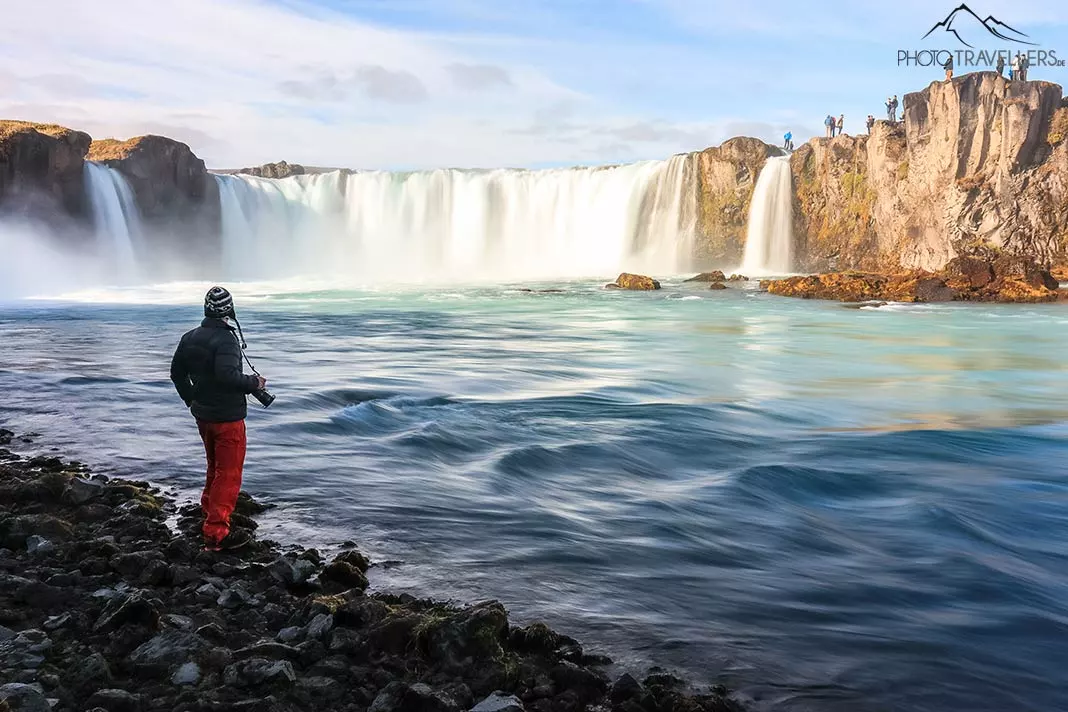 Goðafoss in the most beautiful morning light. For us, this is one of the most beautiful places in Iceland
Goðafoss in the most beautiful morning light. For us, this is one of the most beautiful places in Iceland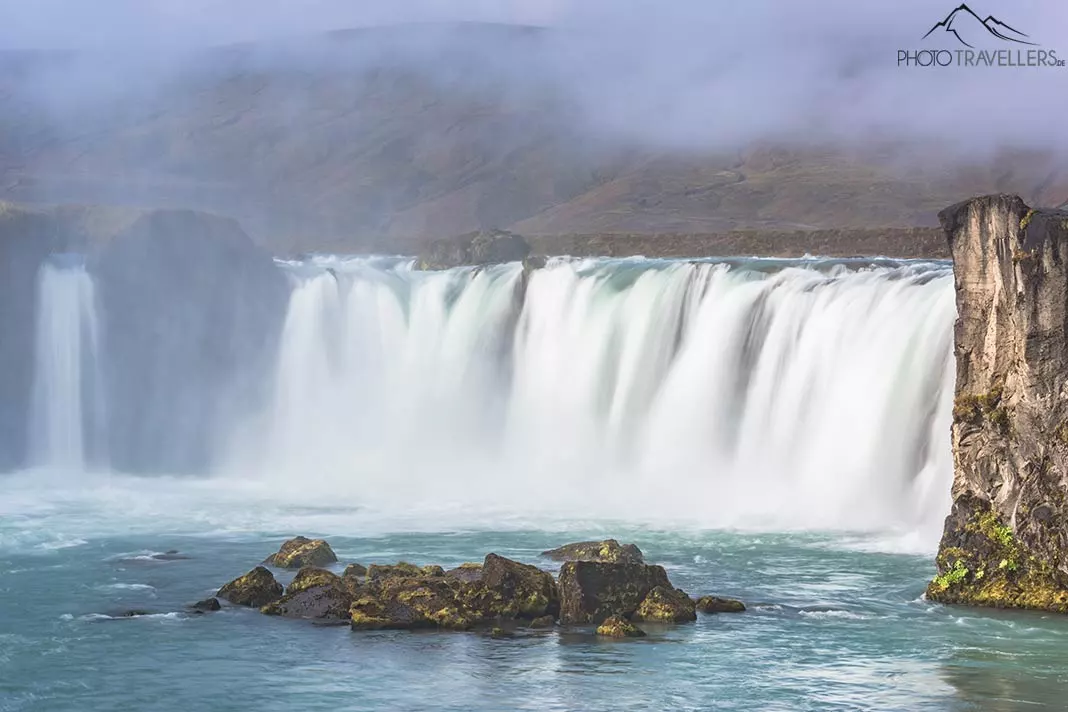 The waterfall is not just a highlight for photographers
The waterfall is not just a highlight for photographersGoðafoss (Google Maps) is located directly on the ring road – so it is always crowded at this top attraction.
The well-known waterfall is not particularly spectacular on paper, with a drop of “only” twelve meters. But that only applies until you stand at Goðafoss for the first time. The waterfall is no less than 158 meters wide. To get the whole waterfall in the photo, you should pack a wide-angle lens.
Hotel tip: In Laugar, we recommend the Öndólfsstaðir farm B&B* guesthouse.
30. “Mosquito Lake” Mývatn and surroundings
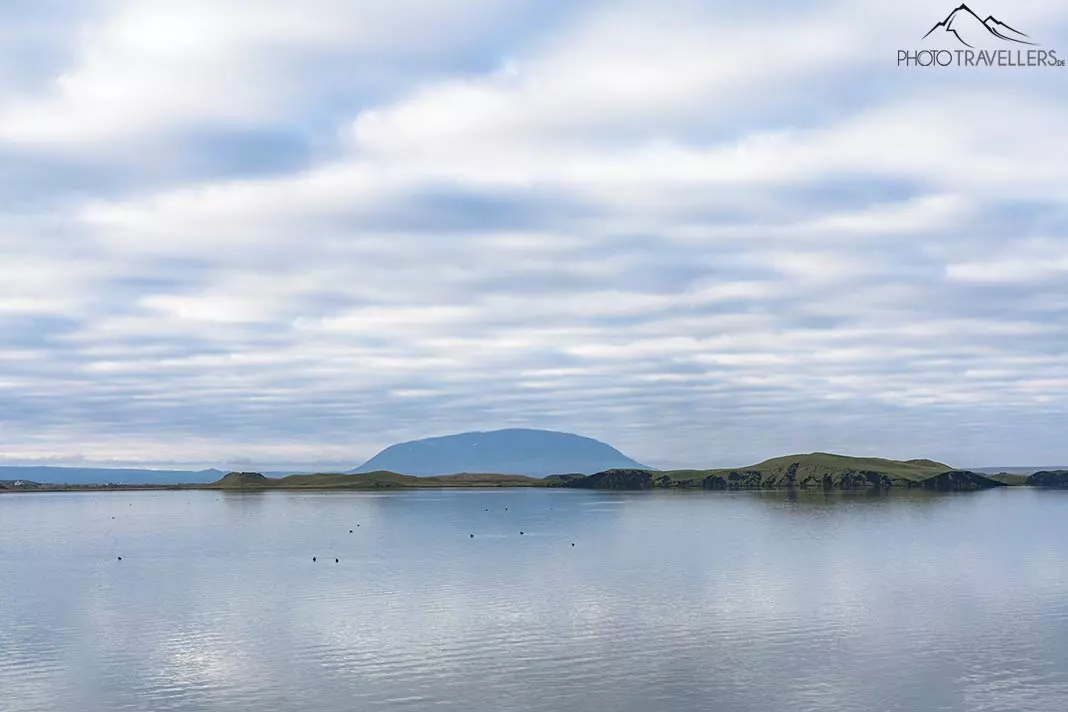 Mývatn is one of the most popular destinations on the volcanic island
Mývatn is one of the most popular destinations on the volcanic island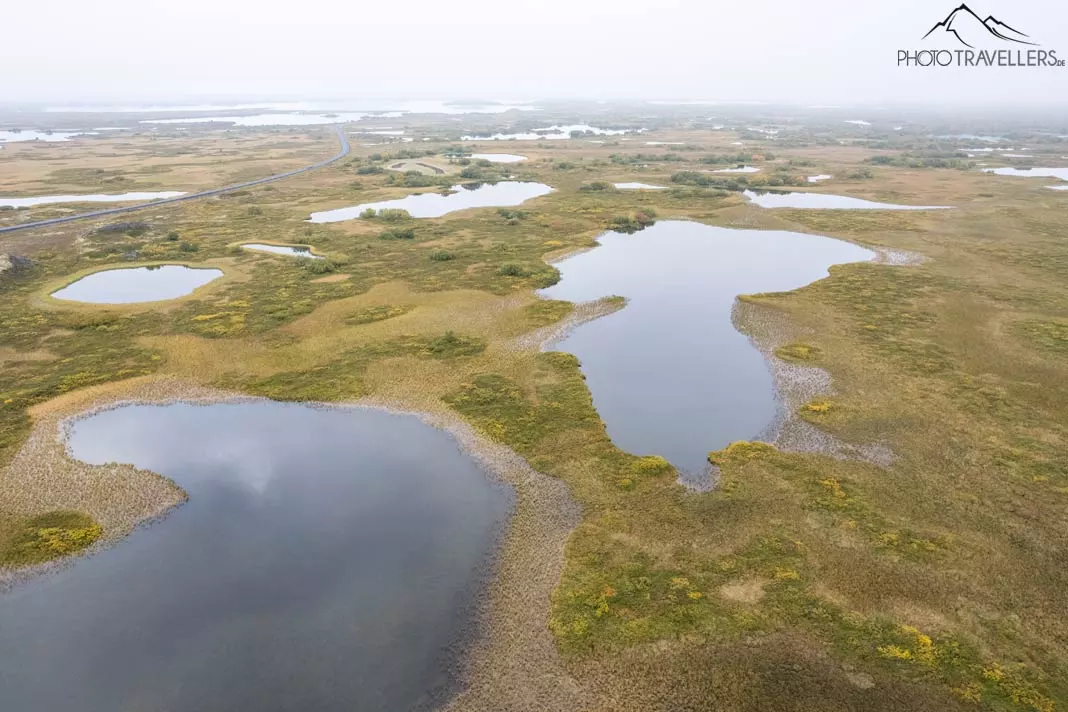 There are also countless bodies of water around Mývatn
There are also countless bodies of water around MývatnLake Mývatn is located in the north of Iceland and is a must-see on any trip to Iceland. The landscape is fantastically beautiful and an Eldorado for photographers.
The village of Reykjahlíð lies to the north-east of the“mosquito lake“. Numerous day trips to the surrounding area start from here, for example to the Grjotagjá bathing cave. The water temperature is 45 degrees – but swimming in the cave is prohibited due to the risk of falling rocks.
Another highlight is the Mývatn Nature Baths (website) – a worthwhile alternative to the Blue Lagoon.
The Hverarönð geothermal area is also located in the immediate vicinity of Lake Mosquito. It bubbles and steams everywhere. Colorful springs wherever you look and the smell of sulphur creeps into your nose and immediately triggers an escape reflex. The landscape is breathtakingly beautiful.
The signposted circular hike up Námafjall is well worthwhile. From the summit of the 482-metre-high mountain, you have a great view over the geothermal area. The ascent from the south side is relatively steep and rocky, so many visitors turn back here. The climb is worth it for the fantastic view of the Hverarönð thermal area. The ascent and descent on the north side is much easier because it is less steep.
There are actually a lot of mosquitoes in the beautiful area around this great sight. The fortunately harmless mosquitoes can get on your last nerve in summer. The only time the pests don’t fly is when it’s windy.
Hotel tip: Lake Mosquito is one of the tourist highlights in Iceland. The infrastructure is correspondingly well developed. Great places to stay include the Hótel Laxá* in the south of the lake and the Fosshotel Mývatn* in the north of the lake.
31. Sigöldugljúfur
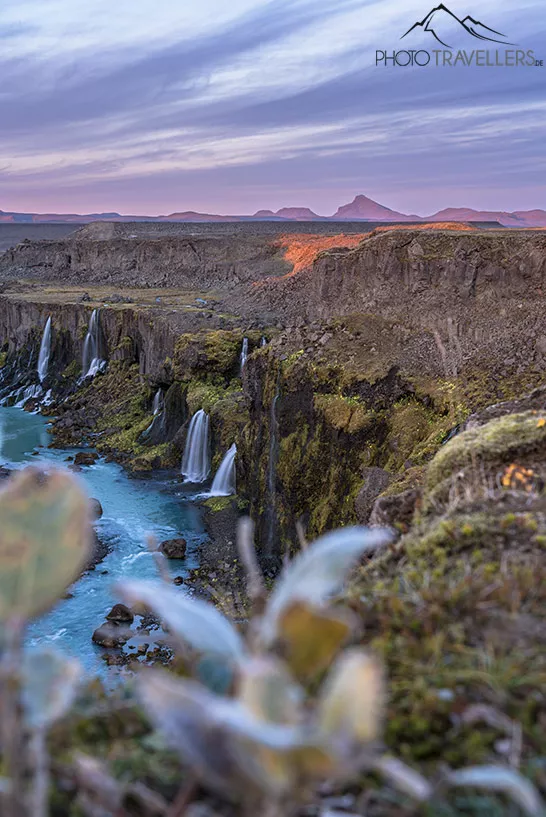 This landscape is simply amazing
This landscape is simply amazing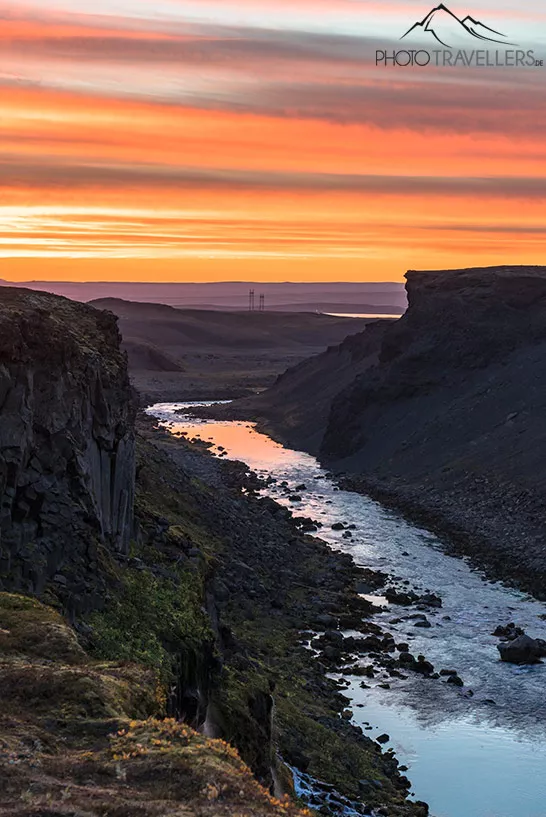 And this is the view in the other direction in the evening
And this is the view in the other direction in the evening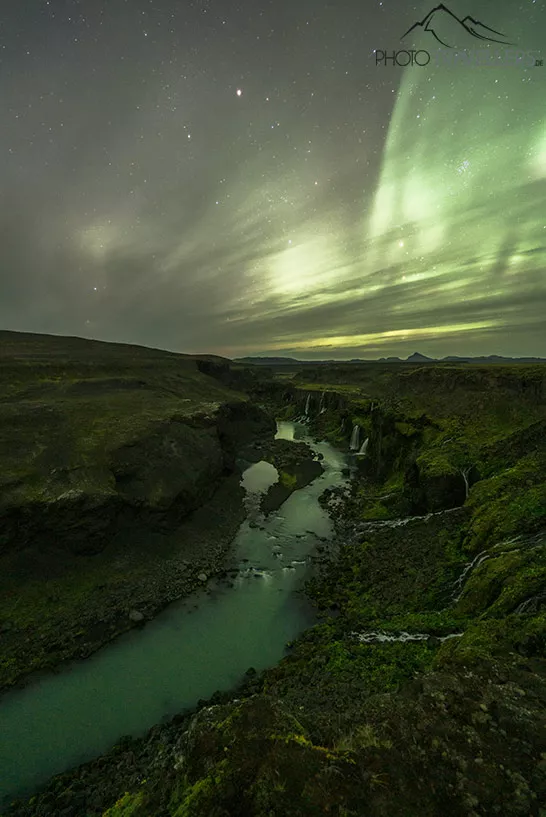 We could even see auroras in the sky that night
We could even see auroras in the sky that nightOur first reaction when we stood in front of Sigöldugljúfur for the first time was simply WOW! From high above, you can look down into the imposing gorge. In the distance, you can see numerous waterfalls cascading into the depths.
Sigöldugljúfur was an insider tip for a long time. Today, however, many visitors are drawn to this beautiful place.
However, Sigöldugljúfur will probably never be as crowded as other hotspots in Iceland: after all, only one F-road leads to this remote attraction. This means you can only get here with a four-wheel drive vehicle. You have to walk the last 500 meters from the parking lot at F208 to the viewpoint.
There are no campsites or hotels nearby here in the highlands.
32. Basalt rock Hvítserkur
The imposing basalt rock Hvítserkur (Google Maps) is a nesting site for numerous bird species. According to legend, the 15-metre-high Hvítserkur is a troll that was petrified by the sun. The rock is famous in Iceland and should not be missed on your sightseeing tour.
In 1990, Hvítserkur was even depicted on an Icelandic stamp. If you walk from the parking lot to the beach, you should definitely wear sturdy shoes and no flip-flops. The descent over fine gravel should not be underestimated!
Here you can find more information and photo tips for your visit to Hvítserkur.
Hotel tip: The Ósar Hostel is located in the immediate vicinity. Guesthouse Tjörn 1* is located a little further away in Hvammstangi.
33. Puffins at Cape Bjargtangar
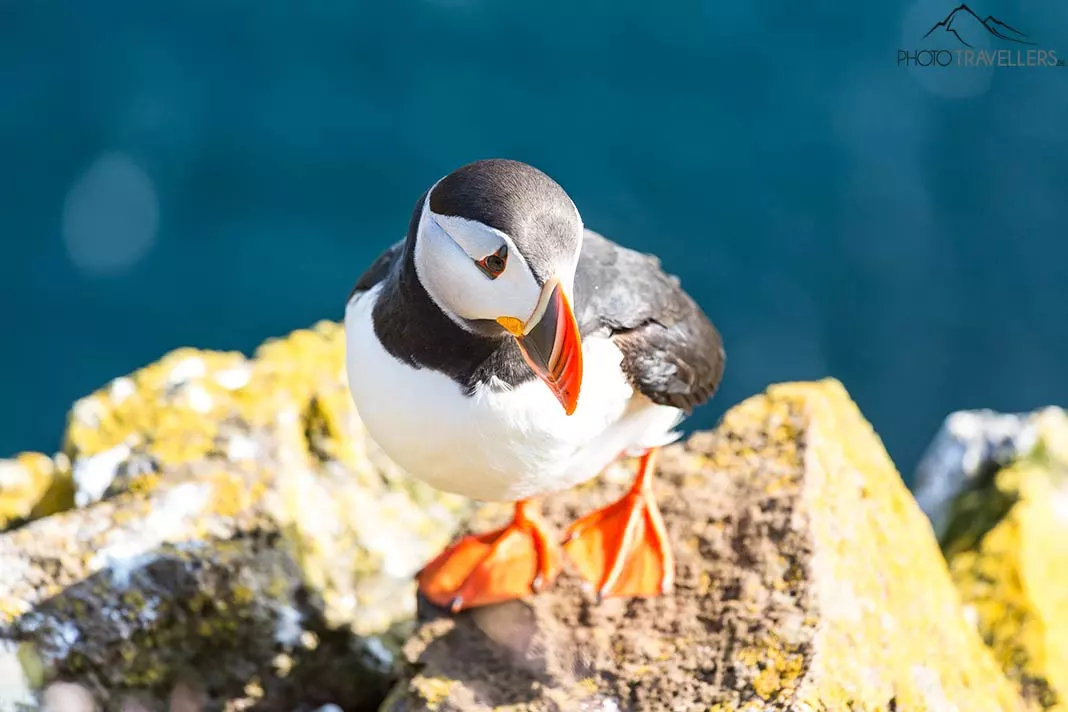 Puffins are best observed at Cape Bjargtangar. Animal photographers get their money’s worth here
Puffins are best observed at Cape Bjargtangar. Animal photographers get their money’s worth here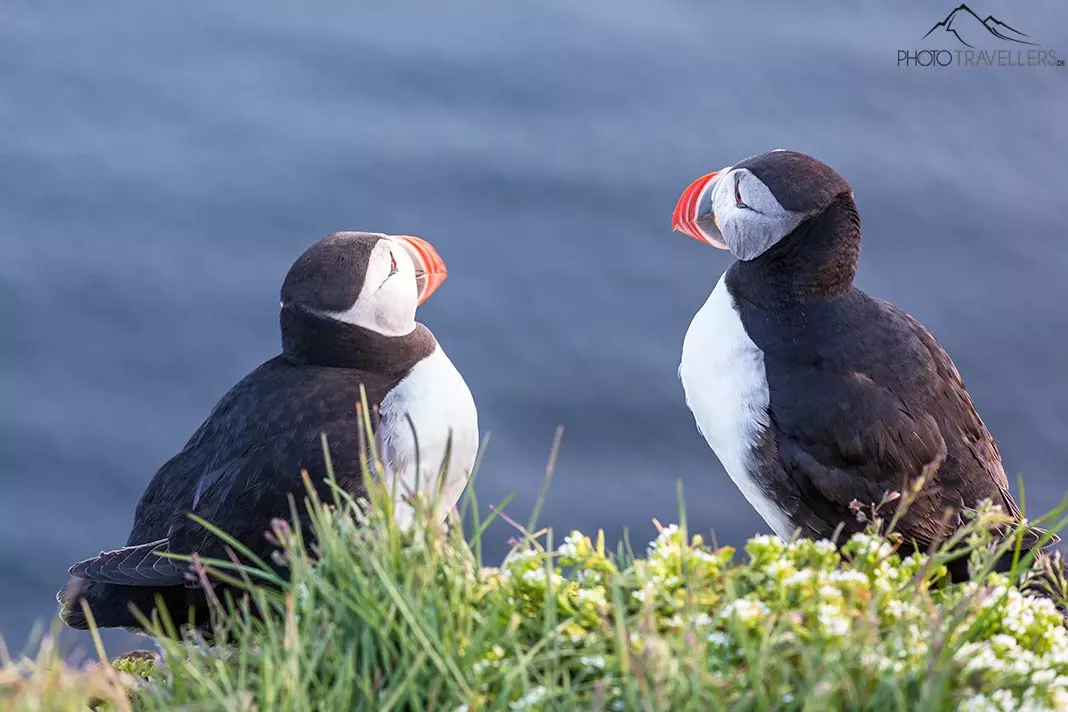 With a little patience you can take great photos of the beautiful animals
With a little patience you can take great photos of the beautiful animalsCape Bjargtangar (Google Maps) is the most westerly point in Iceland and is considered the second most westerly point in Europe. Cape Bjargtangar is a true Eldorado for birdwatching. In summer, hundreds of thousands of puffins, gulls, guillemots and razorbills breed in the cliffs, which drop several hundred meters.
The highlight are the puffins . Puffins are excellent swimmers and dive up to 60 meters deep. If you are seriously interested in wildlife photography, leave the hustle and bustle of the parking lot behind you, follow the hiking trail for 15 to 20 minutes and go “puffin hunting” with a telephoto lens.
The best time to see puffins in Iceland is during the summer months. The waterfowl are in Iceland from around mid-April to the end of August. Puffins spend the rest of the year on the open sea.
A beautiful lighthouse also awaits photographers at Cape Bjargtangar.
34. Highland road Kaldadalsvegur
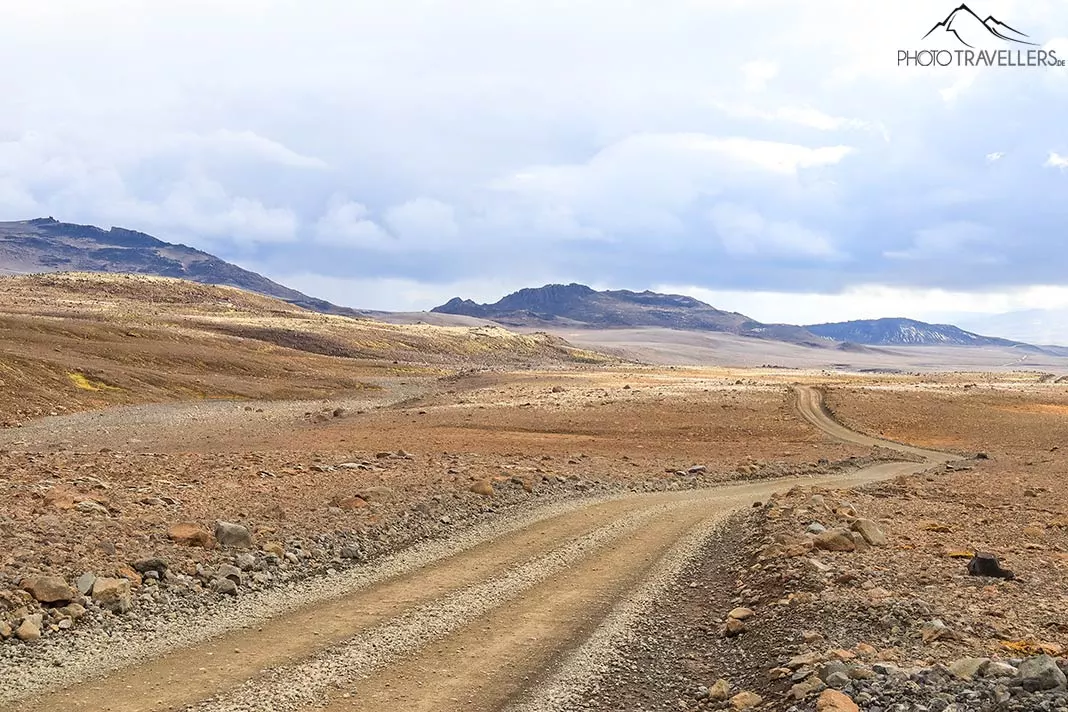 The Kaldadalsvegur runs through this breathtaking landscape
The Kaldadalsvegur runs through this breathtaking landscape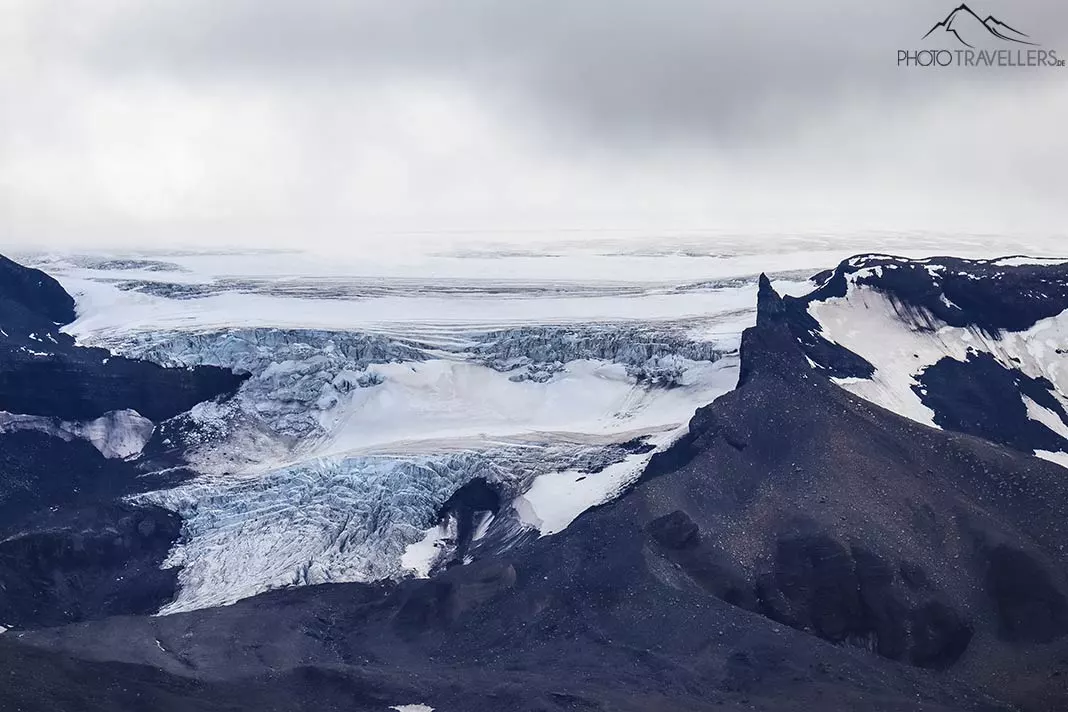 From the road you have a great view of the Langjökull glacier
From the road you have a great view of the Langjökull glacier The approximately 40-kilometer-long Kaldadalsvegur used to be declared an F-Highland Road. Today, the road(road number 550, formerly F550) can also be used by a normal car without four-wheel drive in good conditions. But be sure to ask the rental car company beforehand whether you are allowed to drive on the road!
The Kaldadalsvegur highland road is a tip for anyone who wants to experience the highlands without a four-wheel drive vehicle.
The gravel road leads through a breathtaking landscape. You can see huge glaciers in the distance. Then you drive through areas again where there is nothing far and wide. For us, the highland road is one of the top attractions in Iceland.
The Kaldadalsvegur highland road branches off from road 518 in the north near the exclusive Hótel Húsafell (check prices here*) and in the south at the Þingvellir National Park visitor center (Google Maps).
The guided ice tunnel excursion to Langjökull Glacier (book here*) also starts at Hotel Hótel Húsafell.
35. Dynjandi Foss
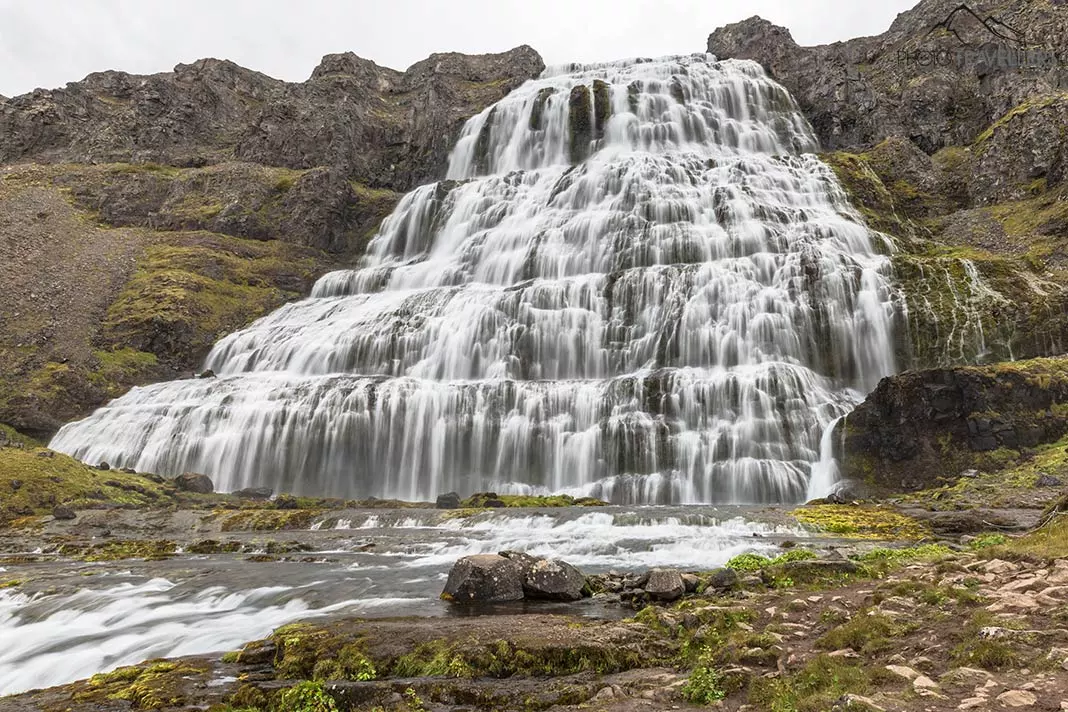
The Dynjandi Foss (Google Maps, also Fjallfoss), which means “the rushing one”, is located in the Westfjords and plunges 100 meters into the depths. At its base, the waterfall is 60 meters wide. A well-maintained hiking trail leads right up to the waterfall.
It is a good idea to use one of the numerous smaller waterfalls as a foreground for taking photos. But even without the small waterfall in the foreground, Dynjandi Foss is a great photo motif that should not be missed on any trip to Iceland. To visit the Westfjords, however, you need to bring time with you.
36. Brúarfoss
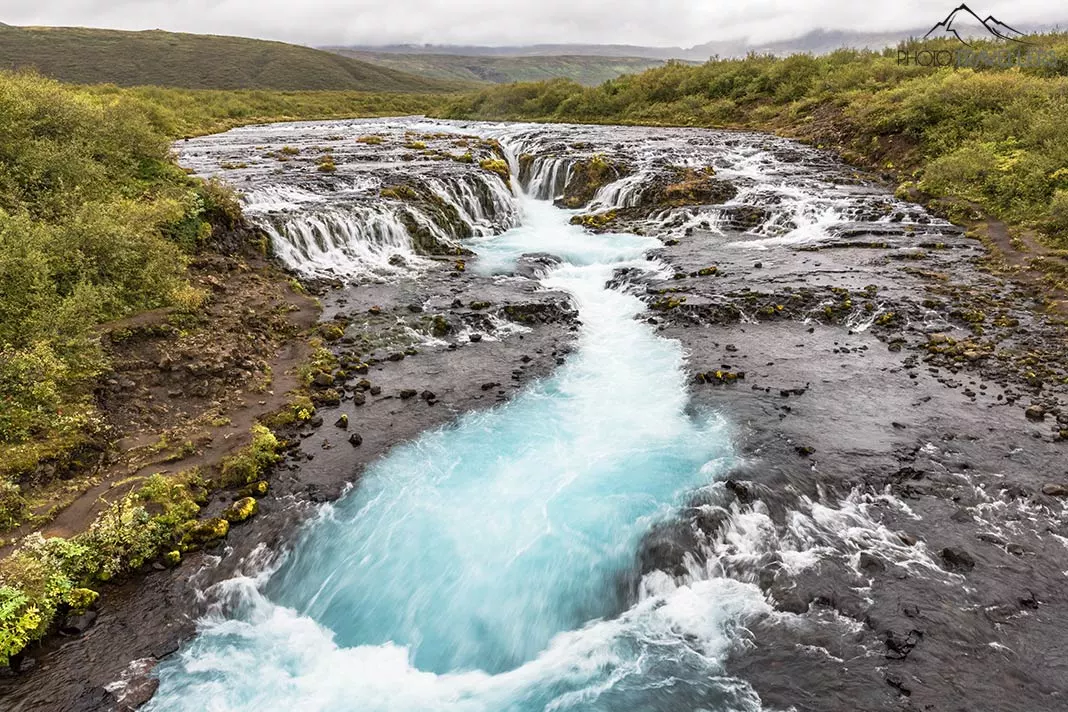 Brúarfoss is not the largest, but it is one of the most beautiful waterfalls in Iceland and was an insider tip for a long time
Brúarfoss is not the largest, but it is one of the most beautiful waterfalls in Iceland and was an insider tip for a long time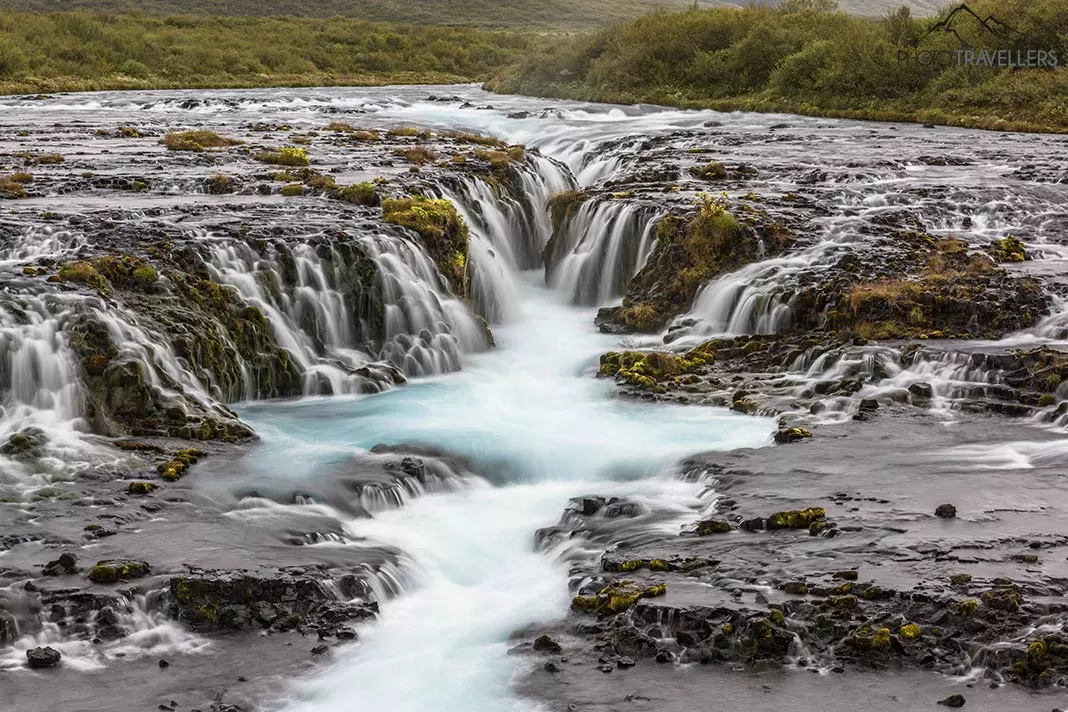 Today, the impressive waterfall is well known and the destination of many vacationers
Today, the impressive waterfall is well known and the destination of many vacationersThe beautiful Brúarfoss waterfall (to the parking lot on Google Maps) – a highlight on the Golden Circle – is about an hour’s hike away. The often very muddy hiking trail leads partly along the river, but also in large sections through bushes and along a road. The hike is not a pleasure.
But Brúarfoss is one of the most beautiful places in Iceland. A bridge leads over the river – the view of the crevice through which the clear water rushes is indescribably beautiful.
The nearby Midfoss, which is also fed by the River Brúará, is also worth a detour.
Hotel tip: In the immediate vicinity, you can stay at the Farmhotel Efstidalur* (an Icelandic highlight for children, keyword“vacation on a farm“) or in the beautiful Úthlíd Cottages*.
37. Volcanic area Hveradalir
While the top attractions on the Golden Circle are often overcrowded in high season, you can still find solitude in the highlands . This is because there are virtually no overnight accommodations here and you need a four-wheel drive vehicle – a legal requirement – to drive on the F-roads in the highlands. Unfortunately, this is very expensive in Iceland (or fortunately, given the masses of people who flock to Iceland).
One of the most beautiful areas in Iceland is the volcanic region of Hveradalir . You can follow the highland road F347 (a branch of the F35) by car and park nearby. You can also hike for about an hour from Kerlingarfjöll Mountain Resort. The path leads through a lunar landscape. An unforgettable experience.
It is always important to check the weather! Even at relatively easily accessible sights, tourists who are surprised by a sudden change in the weather and do not have the right hiking equipment for the harsh conditions in Iceland die time and again.
The only accommodation option in the area is the Kerlingarfjöll Mountain Resort, from where you can hike directly into the Hveradalir volcano area. There are rooms and a campsite here.
38. Glymur
Glymur was considered Iceland’s highest waterfall until 2007 and is another top attraction that you should definitely see on your trip to Iceland.
The hike to Glymur (start at the Botnsá and Glymur parking lot), which plunges 196 meters into the depths, is fantastically beautiful but relatively challenging.
After all, there are 500 meters of altitude to overcome on the six-kilometre hike.
Some parts are relatively steep and many places are secured with a rope. But don’t worry, the rope has really only been put up because many inexperienced hikers go on the tour – there is no real danger.
Today, Morsárfoss is the highest waterfall in Iceland with a drop of 227 meters. Morsárfoss is located in Vatnajökull National Park and was only discovered in 2007. The waterfall can only be reached via a glacier – so not for the “normal” Iceland tourist.
Here you can find all the information about the hike to Glymur.
Hotel tip: You can spend the night at Hotel Glymur*, for example.
39. Hraunfossar
The Hraunfossar waterfalls are located directly on the road and are one of the top day trip destinations in Iceland. A well-maintained path leads along the beautiful waterfalls.
A little further away is Barnafoss – a beautiful waterfall, but not as spectacular as the really big waterfalls in Iceland.
Hotel tip: The first port of call for campers is the Húsafell Campsite, which is part of the beautiful Hótel Húsafell*.
40. Airplane wreck on the beach of Sólheimasandur
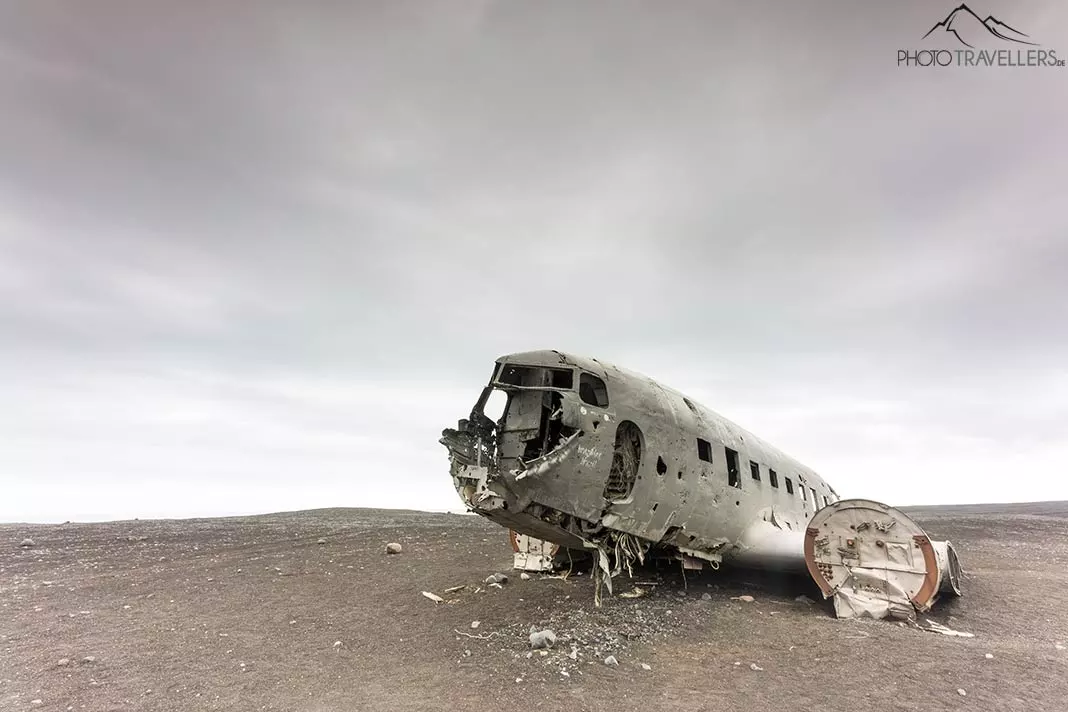 The crashed Douglas C-47 Skytrain is a popular photo motif
The crashed Douglas C-47 Skytrain is a popular photo motif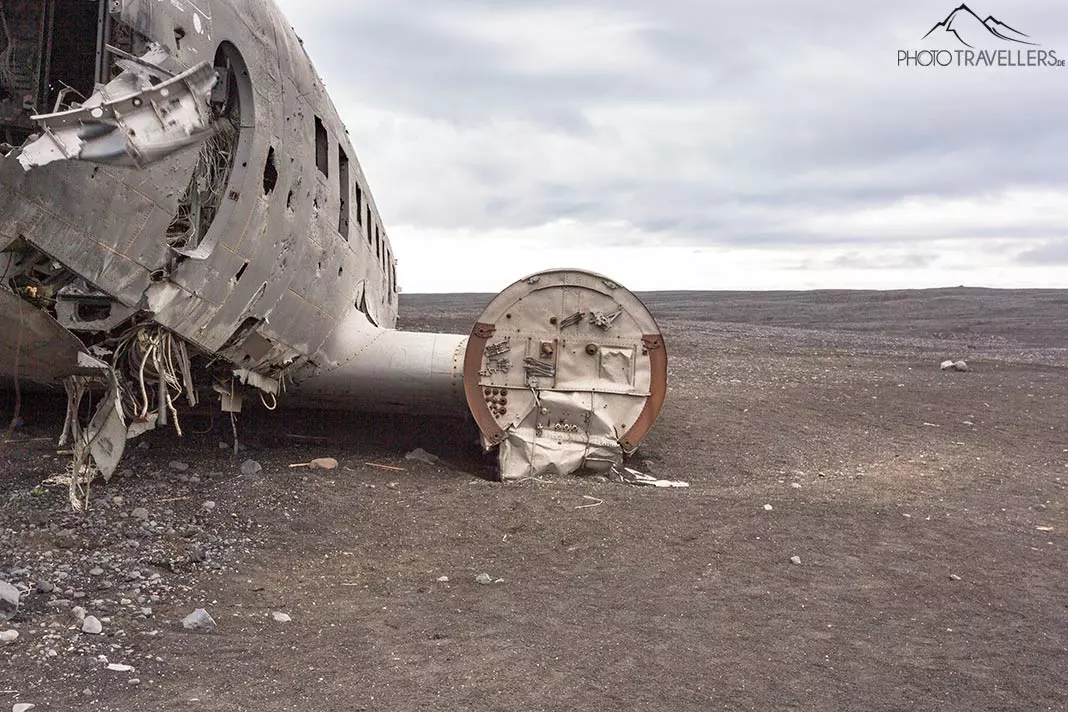 Today, this spot is usually no longer as empty as in this photo
Today, this spot is usually no longer as empty as in this photoOn the lava beach of Sólheimasandur lies an old airplane wreck (Google Maps), one of the most photographed photo motifs in Iceland. The site of the wreck – now one of the most famous places in Iceland – cannot be seen from the main road.
From the parking lot you follow a barren gravel road (closed to cars) for about an hour (four kilometers) to the plane wreck, a crashed Douglas C-47 Skytrain. Alternatively, a shuttle bus will take you to the wreck for around 35 euros.
The United States Navy plane went down on November 24, 1973, but the crew survived. The scenery with the broken plane in this inhospitable area is reminiscent of an end-time movie in which a whole horde of rampaging zombies could descend on you at any second.
Incidentally, the plane wreck was featured in a video by Justin Biber, making it world-famous.
Hotel tip: The Guesthouse Vellir* is a great place to stay nearby.
| Tours to the plane wreck | Price | Ticket |
|---|---|---|
| ATV ride on Black Beach | approx. 160 Euro | ➤ book here |
| ATV tour on the south coast and Black Beach (from Reykjavík) | approx. 230 Euro | ➤ book here* |
41. Fjaðrárgljúfur Canyon
Fjaðrárgljúfur Canyon is also known as the “Justin Bieber” canyon. In 2015, the pop star filmed the video for his song “I’ll Show You” on the island – including in Fjaðrárgljúfur Canyon. Since then, the gorge has been a popular destination for tourists.
From the parking lot (Google Maps), a well-maintained hiking trail leads along above the imposing canyon. After around one kilometer, you will reach a viewing platform. From here you have a great view of the canyon. Two waterfalls also cascade into the depths here. This place is truly magical!
Hotel tip: The beautiful Hunkubakkar Guesthouse* is located in the immediate vicinity.
42. Mud springs of the Gunnuhver
The hot springs of the Gunnuhver volcano (Google Maps) are another top attraction in Iceland. The mud springs are the largest in Iceland. There is steam and bubbling everywhere and a disgusting smell of sulphur, reminiscent of rotten eggs, wafts up your nose.
The steaming and bubbling springs are a great experience that you shouldn’t miss.
Hotel tip: There are several hotels in Grindavík. We recommend the Harbour View Cottages*, among others.
43. Aldeyjarfoss
Aldeyjarfoss is hardly on the to-do list of any traveler to Iceland. The waterfall in the Icelandic highlands is well worth seeing. There is a parking lot right next to the waterfall. However, the access road, the F26, is reserved for vehicles with four-wheel drive.
Without a four-wheel drive vehicle, a short hike (about an hour each way) to the impressive waterfall is a good option. If you drive along road 842 from the north to the end, you will inevitably come across the F26. It’s another four (unfortunately very dull) kilometers on foot. During our visit, the road was so good that the route would have been doable with a normal car – but it is still forbidden.
Hotel tip: You can spend the night nearby at Sandhaugar Guesthouse*.
44. Gljúfrabúi
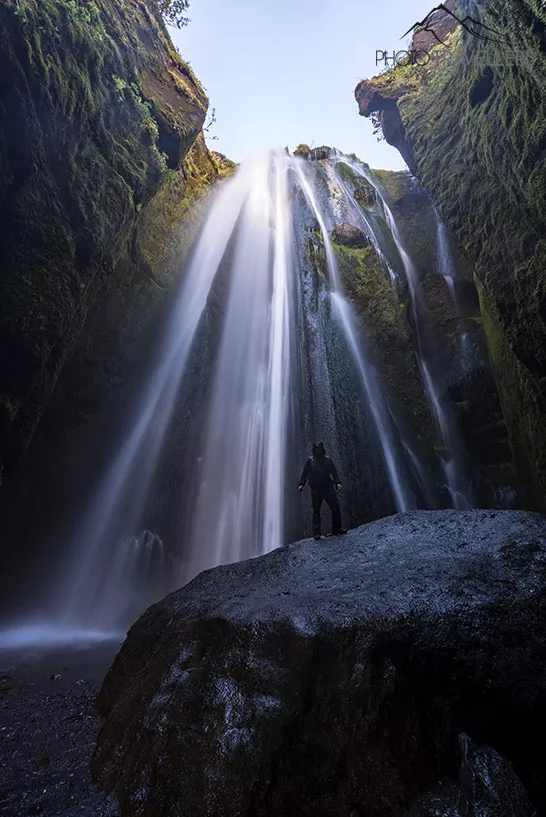 Here you can see how huge the waterfall is
Here you can see how huge the waterfall is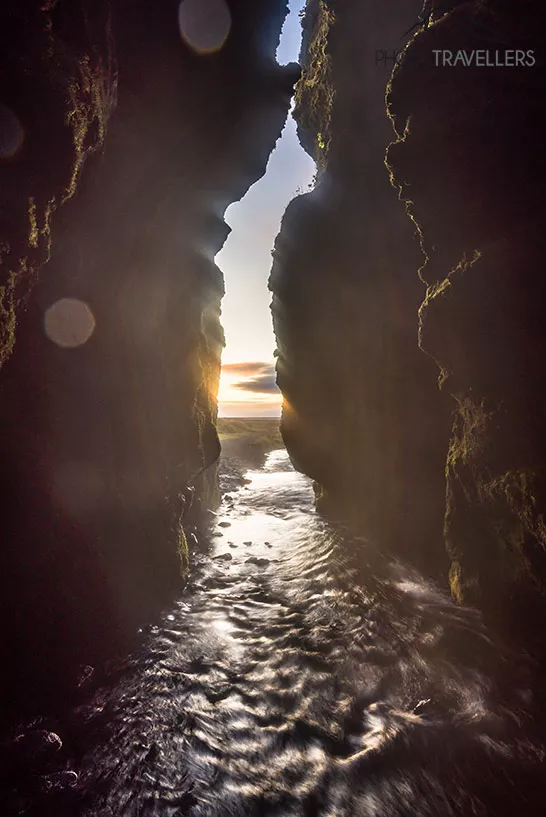 The last rays of sunshine shine into the cave
The last rays of sunshine shine into the cave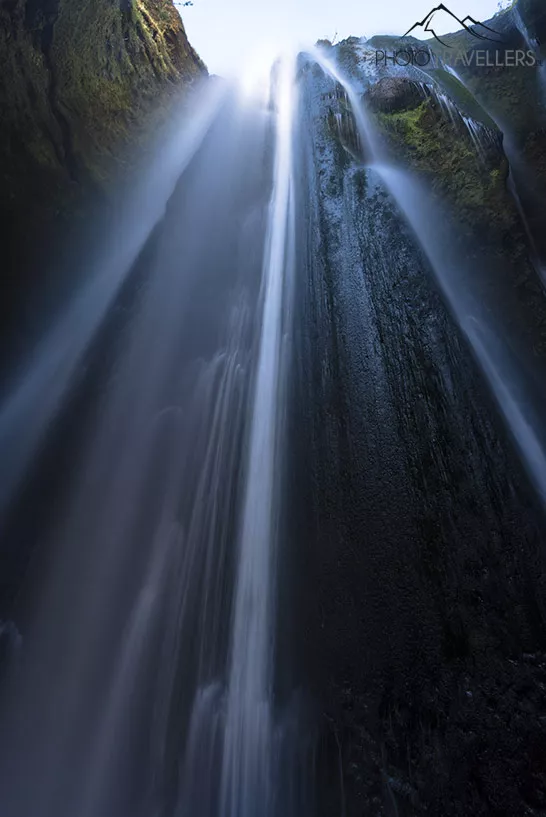 The water plunges 40 meters into the depths here
The water plunges 40 meters into the depths hereThe 40-metre-high Gljúfrabúi waterfall near the famous Seljalandsfoss is well worth a detour. From Seljalandsfoss, you can reach this lesser-known highlight in just a few minutes on foot. From the outside, all you can see is a small stream flowing out of a crevice.
Follow the stream and after just a few meters the crevice opens up and you are standing at the foot of this impressive waterfall. Rain gear is a must – you’ll be soaking wet in here in no time.
At lunchtime, a traffic jam often forms in front of the crevice. If you don’t want to get your feet wet, you have to jump over the stones in the water.
Photography is a challenge here. On the one hand, the contrast between the dark cave and the sky is extremely high. On the other hand, the spray from the waterfall whips through the grotto. Your photo equipment will be completely wet in just a few seconds. A (waterproof) smartphone for taking photos can be an advantage here.
Hotel tip: Two great places to stay nearby are the luxury lodges Seljalandsfoss Horizons* and the bungalows at Brú Guesthouse*.
45. Víti (Kafla)
The Víti (Icelandic for “hell”) on the central Kafla volcano was formed in 1724 during a steam explosion. The volcanic lake – more precisely a maar like in the Eifel – is now one of the most famous tourist attractions in the north-east of the country.
A hiking trail leads from the parking lot (Google Maps) along the crater rim. From the top, you have a great view over the huge volcanic lake, which measures more than 300 meters in diameter.
Once you reach the top, you have a beautiful view of a second, smaller volcanic lake.
Tip: On the way to Víti and back (there is only one road) you will pass an endless shower (Google Maps).
Hotel tip: We recommend the Hótel Laxá* and the Fosshotel Mývatn* at Lake Mückensee.
46. Table volcano Fagradalsfjall
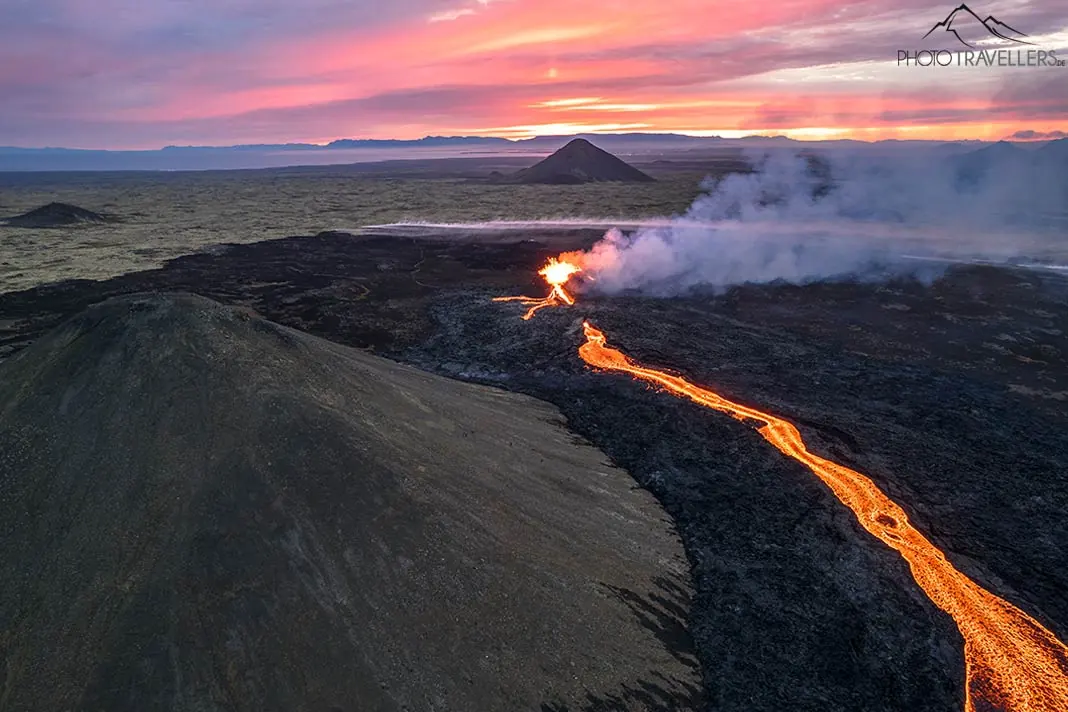 Here the volcano bubbles in the most beautiful morning light
Here the volcano bubbles in the most beautiful morning light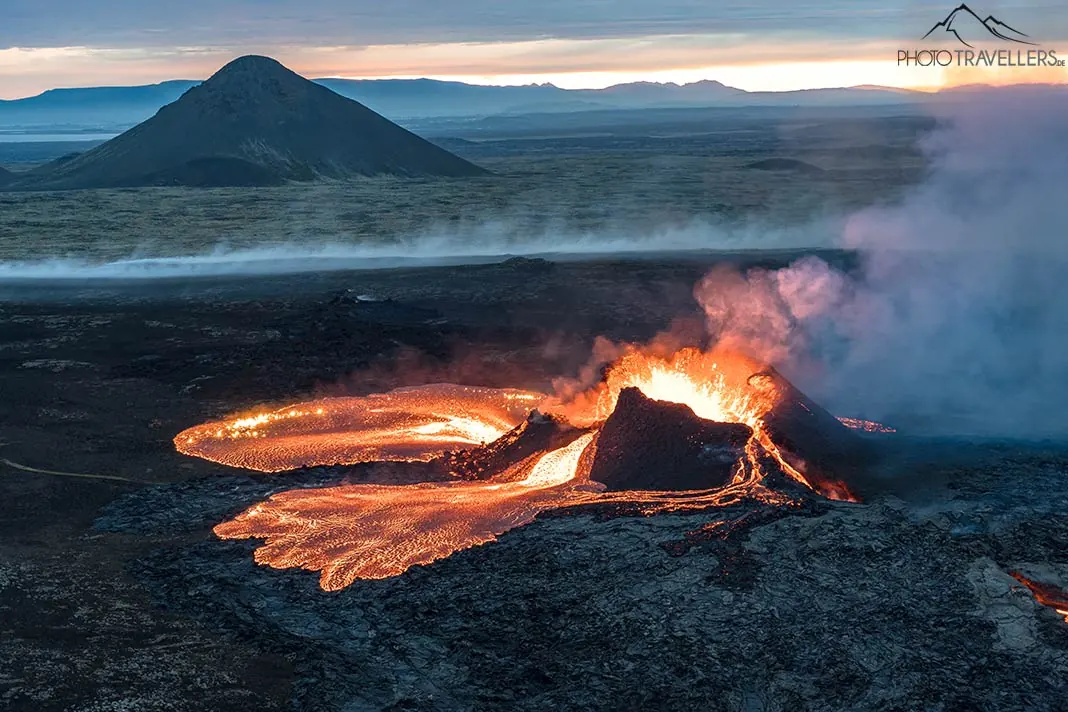 The volcano, shortly after the collapse of the wall
The volcano, shortly after the collapse of the wallFagradalsfjall is located around 40 kilometers southwest of Reykjavík and is always in the news. In March 2021, the table volcano on the Reykjanes peninsula awoke from a 6000-year dormant phase. The volcano erupted again in July 2023 and has since attracted huge media interest worldwide.
As spectacular as the eruptions are – Icelanders call such mini eruptions “tourist eruptions”. More or less harmless and good for tourism. There is currently a lot going on in the area. Here you can find all the information about the current volcanic eruption in Iceland.
But even without the glowing lava, the hike through the volcanic area is spectacular. Think about warm clothes, light and an offline map in the dark. We have seen for ourselves that the mountain rescue service had to rescue careless hikers at night.
Hotel tip: Exceptional accommodation options include The Retreat at Blue Lagoon Iceland* and the Silica Hotel at Blue Lagoon Iceland*. The Northern Light Inn* is also very nice.
47. Heimaey (Vestmannaeyjabær)
The Vestmannaeyjabær archipelago in the south of Iceland is a sight in itself and should not be missed here. If you have the time, take the ferry across and explore the rugged main island of Heimaey.
Even the journey on the car ferry (website) is an experience. The entrance to the harbor is indescribable. You gaze in awe at the rugged rocks that rise up from the sea into the sky.
On Heimaey, you should visit Elephant Rock, the 200-meter-high Eldfell volcano and the southern tip with its large population of puffins.
Hotel tip: Want to experience something wacky? Then spend the night in the Puffin Nest Capsule Hostel*. Less spacey accommodation is available at Hotel Vestmannaeyjar*.
48. Kvernufoss
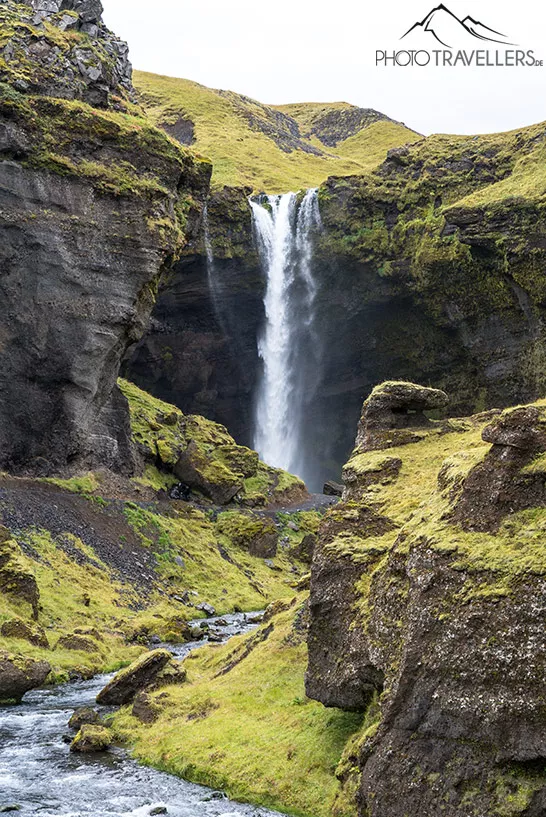 After just a few minutes’ walk, you will reach Kvernufoss. The gray sky is nothing unusual for Iceland
After just a few minutes’ walk, you will reach Kvernufoss. The gray sky is nothing unusual for Iceland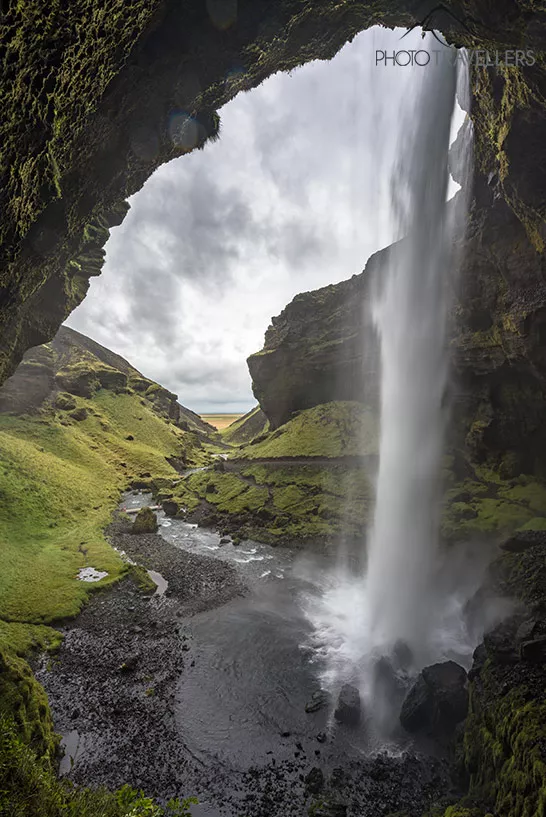 The highlight: you can walk behind the waterfall, into a kind of cave
The highlight: you can walk behind the waterfall, into a kind of cave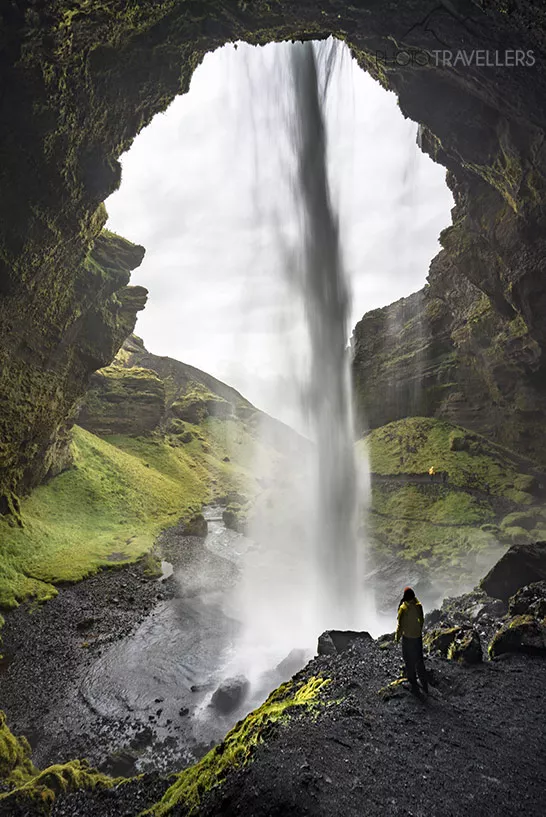 Biggi admires the scenery – and you get an impression of how mighty the Kvernufoss is
Biggi admires the scenery – and you get an impression of how mighty the Kvernufoss isKvernufoss near the famous Skógafoss waterfall is well worth a visit. From the parking lot at the Skógar Museum (Google Maps), follow a well-maintained hiking trail. After just a few minutes you will see Kvernufoss in the distance.
The path even leads behind the beautiful waterfall. From here you can look out of a cave through the roaring masses of water into the gorge. An unforgettable experience.
Hotel tip: The Hótel Skógafoss* and the Guesthouse Skógafoss* are located nearby. The Umi Hotel* is more dignified.
49. Grábrók
Grábrók is a lesser-known highlight on the ring road that runs around the island. Grábrók is an imposing crater that you can climb on a well-maintained hiking trail. From the crater rim you have a beautiful view of the crater and the surrounding landscape.
For us, Grábrók is one of the sights that, given the mass of attractions on the island, is quite wrongly not on the list of many travelers to Iceland. If you’re in the area: climb the Grábrók!
Hotel tip: We recommend the Hotel Varmaland* and the Hraunsnef Country Hotel*, among others.
50. Þakgil
Let’s move on to the last sight in our list, which could be twice as long (please don’t consider the order as a ranking): Þakgil (also spelled Thakgil or Pakgil).
Þakgil is a small gorge with a campsite of the same name (Google Maps). The campsite – the highlight is the large communal cave – is definitely one of the most beautiful and idyllic in Iceland. However, it also gets very cold here in summer.
Directly behind the campsite, a wide path leads a few hundred meters into the canyon. The trail ends at a lake with a waterfall. Even this small piece of nature with its rugged rock formations is so impressive that it is worth the drive to Þakgil.
What’s more, the journey along the 16-kilometre-long, rather rugged gravel road is an experience in itself. Normally, the route is easy to manage in a normal car.
Video: The best Iceland sights
Map with all sights in Iceland
Our interactive map gives you an overview of the most beautiful sights and places in Iceland:
[mapsmarker map=”81″]
Recommended Iceland travel guides
Are you as fascinated by Iceland’s rugged landscape as we are? Then take your first piece of vacation home in advance. Browsing through travel guides fuels the anticipation of your vacation and lets you immerse yourself in the new country in advance. We can recommend the following travel guides:
*Werbelink / Bilder von der Amazon Product Advertising API
Travel tips for Iceland
Iceland is always worth a trip! In summer it is consistently bright and the lupins are in bloom. The winter months are characterized by darkness. With a bit of luck, the landscape will be illuminated by the Northern Lights.
If you are visiting Iceland for the first time, you should tackle the Ring Road first. Ten days is the minimum to enjoy the journey on the Ring Road to some extent. If you are traveling with a tent , you should drive the round trip anticlockwise. The background: it is generally drier in the south of the island than in the north. If you travel counter-clockwise, you save the wet rainy days for the end of the trip and your clothes stay dry a little longer.
If you already know the top sights on the Ring Road and the coast, you will find many highlights in the island’s highlands . An (expensive) four-wheel drive vehicle is required to reach the highlands. You should also make sure that your rental company explicitly allows trips into the highlands. Violations are expensive.
Here we tell you what a trip to Iceland costs and how you can save a lot of money in Iceland.
Journey to Iceland
A trip to Iceland usually starts at Leifur Eiríksson Airport near Keflavik (Google Maps), close to the capital Reykjavík. Incidentally, the Icelandic airline Icelandair has a very special offer: on a flight from Europe to Canada or the USA – or vice versa – you can make a free stopover of up to seven days in Iceland. You might be interested in our experience report with Business Class with Icelandair.
If you want to explore Iceland in your own car, the car ferry is the only option for you. The Smyril Line ferry departs from Hirtshals in Denmark. You can even make a stopover on the Faroe Islands on your journey.
But you should be seaworthy. The ship is underway for at least two days. And the price is not without its drawbacks. In the high season, you pay more than 1,000 euros as a single traveler with a normal car in the cheapest 6-seater cabin, and as a couple you have to reckon with a surcharge of at least another 500 euros.
Where to stay in Iceland
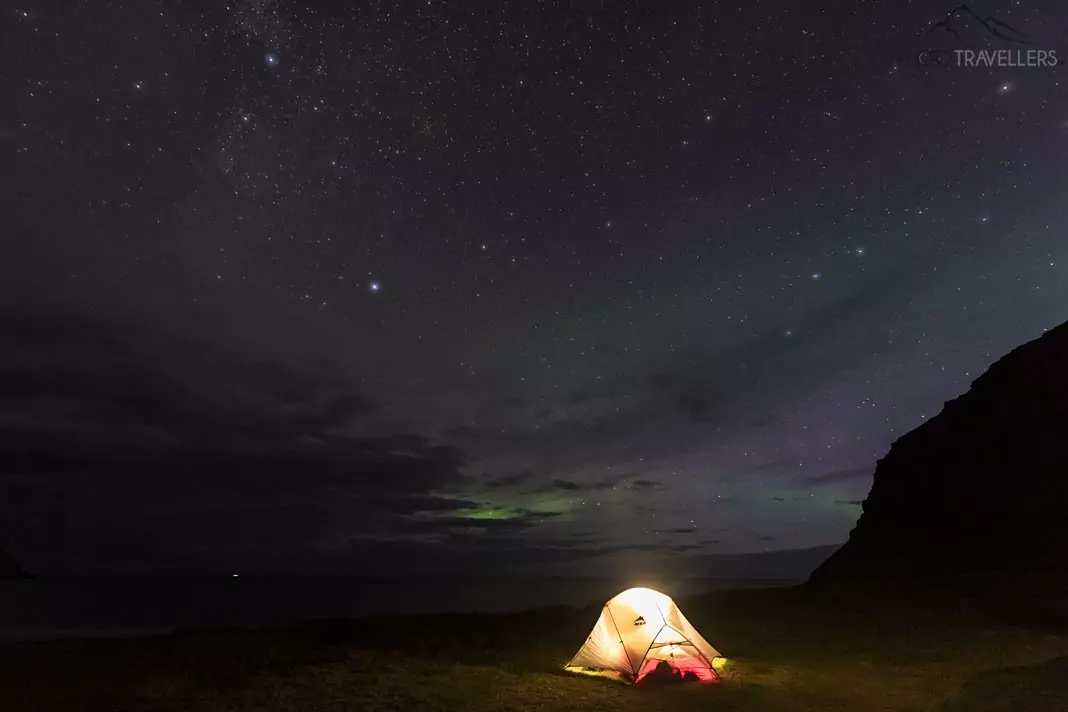
The cheapest way to spend the night in Iceland is in a tent. Campervans offer significantly more comfort. However, such vehicles are just as expensive per day as a good hotel in Iceland. As a cheaper alternative, there are all-wheel drive SUVs with a roof tent.
There are campsites all over Iceland. At the hotspots, the campsites are usually quite well equipped with showers and hot water (one point of criticism is almost always the sanitary facilities). Off the beaten track, there are often simple campsites without amenities (but at least with cold water and toilets). You won’t find luxury campsites like those in Italy in Iceland.
Incidentally, wild camping is not permitted in Iceland. In uninhabited areas without infrastructure, you may pitch your tent for one night on public or private undeveloped land. With a camper you have to use the campsites. Camping is generally prohibited in national parks and some specially designated areas (except at campsites). You can find out which areas these are here.
As always, leave nothing but footprints (and not on sensitive plants). Please take your garbage back with you and leave absolutely nothing (no butts, no paper and not even a banana peel) in the countryside.
Hotels offer more comfort, of course, but are expensive in Iceland. The cheapest option is simple guest houses, often with shared bathrooms. There are now also many luxurious hotels and bungalows/lodges in Iceland. They usually cost several hundred euros a day.
Cheap rental cars in Iceland
Iceland is an expensive destination. This also applies to rental cars. If you take the risk and choose insurance cover with an excess, you will pay around 300 euros per week for a small car in the high season. If you want to cover all risks, you should expect to pay at least 600 euros per week.
Always make sure that you do not have a mileage limit. If you circumnavigate the island on the ring road, you will cover several kilometers. If you have higher expectations and would like to travel in a mid-range car, you can easily put 800 euros on the table for a week. You can find good offers on the comparison portal Billiger-Mietwagen.de*, which we often use for our trips.
